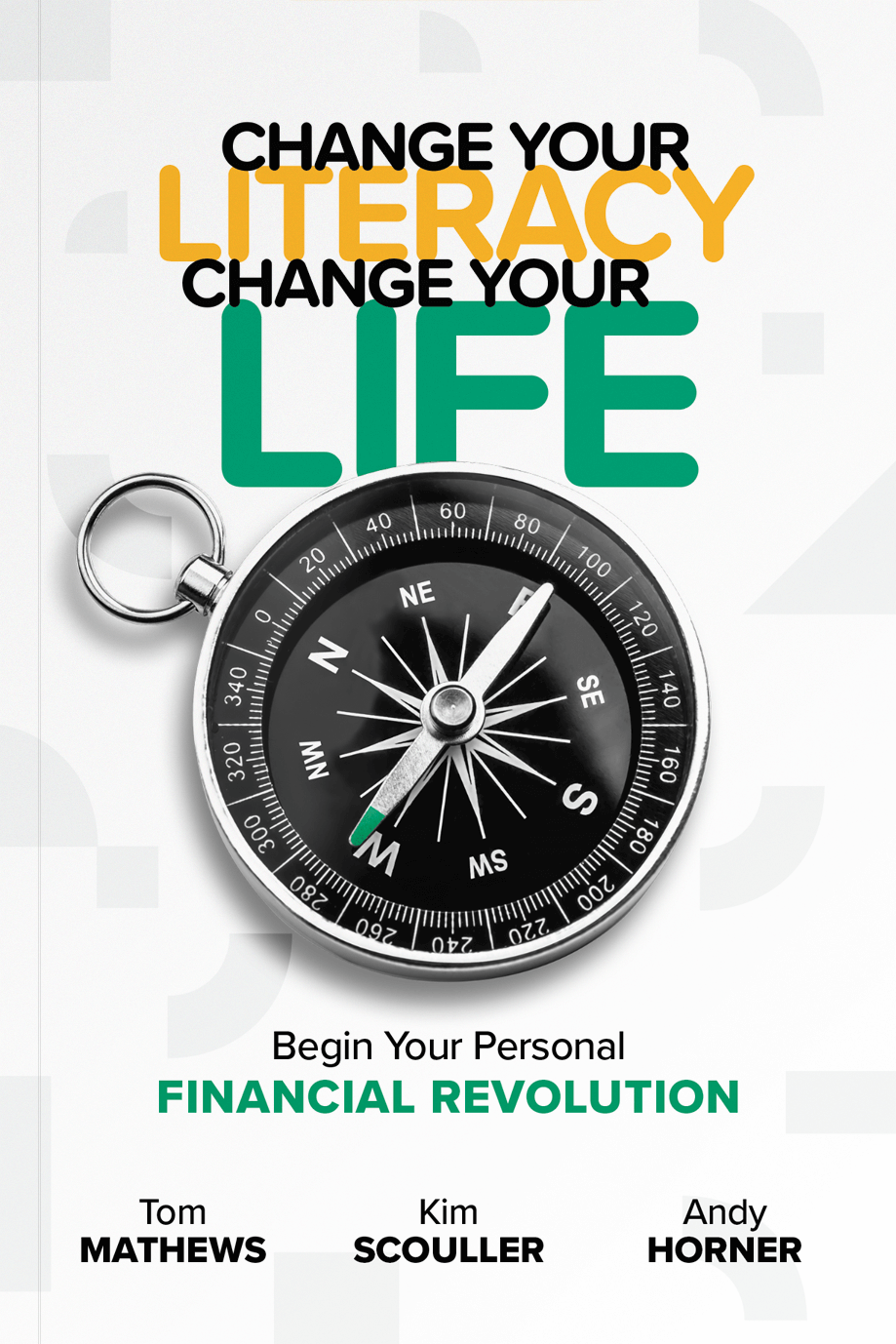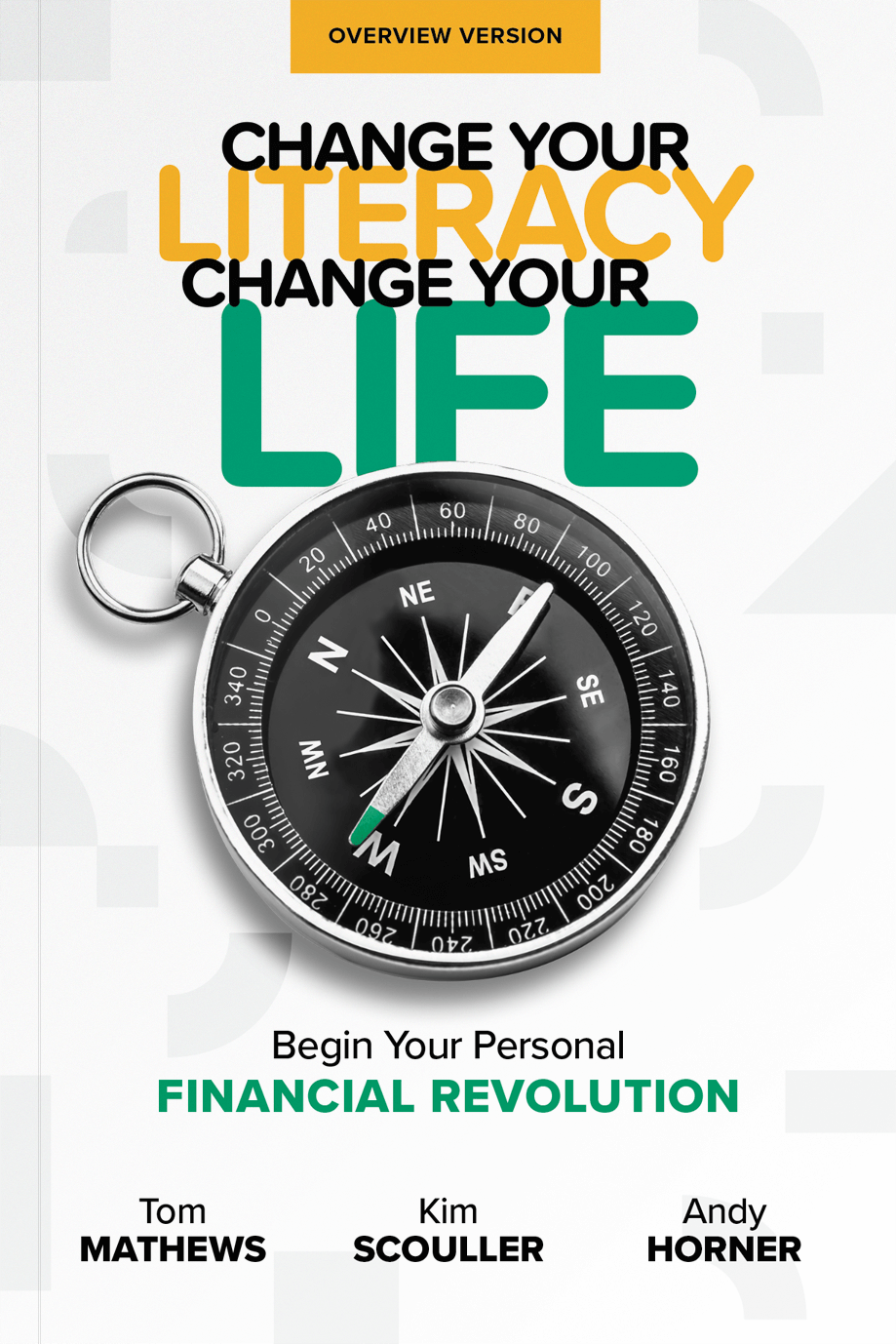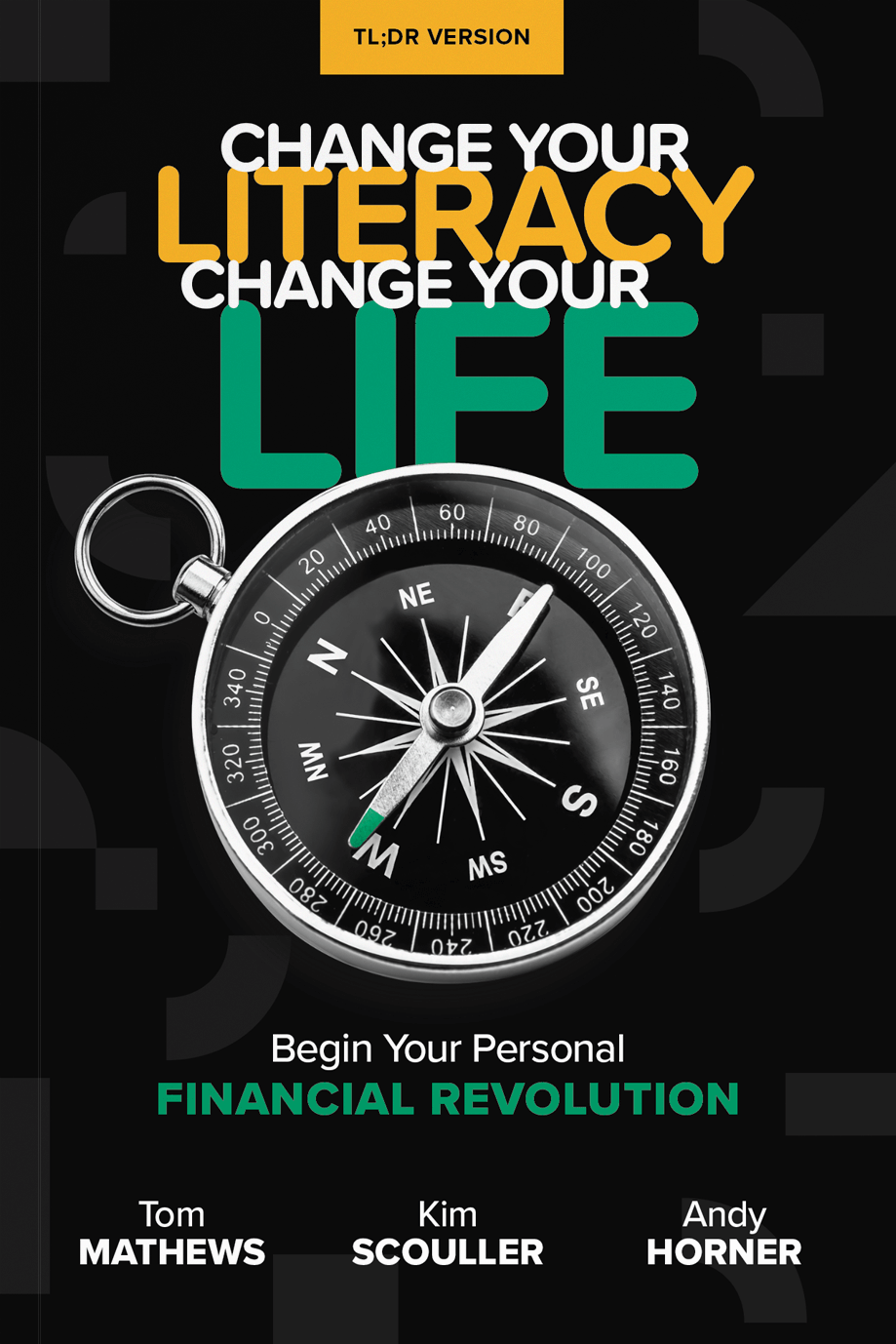 Request a copy of our book(s)
Request a copy of our book(s)The Hidden Pitfall of "Spaving"

How "Saving" While Spending Can Lead to Overspending
In today's fast-paced, consumer-driven world, we’re constantly bombarded with deals, discounts, and promotions. From flash sales to loyalty rewards, the allure of saving money while shopping is ever-present. This phenomenon, often referred to as "spaving" (a blend of 'spending' and 'saving'), can seem like a smart financial strategy. However, beneath the surface lies a paradox that can lead to overspending and financial strain. In this article, we’ll explore what spaving is, why it’s so enticing, and how it can ultimately lead to overspending.
What is Spaving?
Spaving is the act of spending money with the intent of saving money, usually by taking advantage of sales, discounts, or promotions. It’s the mindset that buying something on sale is a good deal, regardless of whether you need it or not. Retailers and marketers have mastered the art of spaving, encouraging consumers to believe that they’re making smart financial decisions by spending money to save money.
The Psychology Behind Spaving
Spaving taps into several psychological principles that make it incredibly appealing:
- Scarcity and Urgency: Limited-time offers create a sense of urgency, making us feel like we might miss out on a great deal.
- Fear of Missing Out (FOMO): We don’t want to miss an opportunity to save, even if it means spending money we hadn’t planned to spend.
- Perceived Value: When we see a significant discount, we perceive the item as more valuable, convincing ourselves that we’re getting a great deal.
- Reward and Gratification: Finding a good deal gives us a sense of accomplishment and instant gratification, reinforcing the behavior.
How Spaving Leads to Overspending
While the concept of saving money while shopping seems beneficial, it can easily lead to overspending. Here’s how:
- Buying Unnecessary Items: The most obvious pitfall of spaving is purchasing items you don’t need simply because they’re on sale. This leads to clutter and wasteful spending.
- Spending More Than Intended: Discounts can encourage you to spend more than you originally planned. For instance, buying a $200 jacket for $150 feels like saving $50, but if you didn’t need the jacket in the first place, you’ve just spent $150 unnecessarily.
- Accumulating Small Expenses: Small, frequent purchases can add up quickly. A few dollars saved here and there can lead to significant expenditures over time, often on items that aren’t essential.
- Psychological Traps: The feeling of getting a good deal can become addictive, leading to habitual spaving. This can create a cycle of spending where the focus is on the perceived savings rather than the actual need or value of the purchase.
Strategies to Avoid Overspending Through Spaving
To harness the benefits of discounts without falling into the trap of overspending, consider these strategies:
- Set a Budget: Determine how much you can afford to spend on non-essential items each month and stick to it.
- Make a List: Before shopping, create a list of items you need and resist the temptation to buy things that aren’t on the list, even if they’re on sale.
- Evaluate Needs vs. Wants: Ask yourself if you truly need the item or if it’s simply an impulse buy driven by the discount.
- Delay Gratification: Give yourself a cooling-off period before making a purchase. This can help you determine if the item is truly necessary.
- Track Your Spending: Keep a record of your purchases to see how much you’re spending on “deals” and assess if they’re impacting your overall financial health.
Takeaway
Spaving, while seemingly a smart way to save money, can easily lead to overspending if not approached with caution. By understanding the psychology behind spaving and implementing mindful shopping strategies, you can avoid the pitfalls of overspending and make more informed financial decisions. Remember, the best way to save money is not by spending it, but by making thoughtful, intentional choices that align with your financial goals.
The Hidden Cost of Summer Fun

"Funflation" Can Derail Your Long-Term Financial Goals
As the warm rays of summer sun beckon us outdoors, it's easy to get caught up in the allure of vacations, outings, and leisure activities. This is especially true for those still longing to catch up from missed opportunities due to the pandemic. While summer is a time for relaxation and enjoyment, it's also a season that can significantly impact your finances if you're not careful. The term “funflation”, coined by economist aptly describes the inflation of expenses that often accompanies our pursuit of summer fun. Here's how funflation can harm your long-term financial goals and some tips on how to avoid falling into this trap.
The Allure of Summer Fun
Summer offers numerous opportunities for enjoyment, from beach vacations and road trips to outdoor festivals and barbecues, sporting events and movies to theaters and concerts. These activities, while enjoyable, often come with a hefty price tag. It's easy to justify spending more during the summer months because we associate this time with relaxation and reward. However, these expenditures can quickly add up, leading to a financial strain that extends far beyond the summer season.
The Impact on Long-Term Financial Goals
- Depleting Emergency Savings: Many people dip into their emergency savings to fund their summer activities. This practice can leave you vulnerable in the event of unexpected expenses or emergencies. Without adequate savings, you may find yourself relying on credit cards or loans, which can lead to debt accumulation.
- Neglecting Retirement Contributions: Summer spending can lead to reduced contributions to retirement accounts. Skipping or lowering your contributions, even for a short period, can have a significant impact on the growth of your retirement fund due to the power of compound interest.
- Increased Credit Card Debt: It's common to put summer expenses on credit cards with the intention of paying them off later. However, this can lead to accumulating interest charges and increasing debt levels. High credit card balances can also negatively affect your credit score, impacting your ability to secure loans or favorable interest rates in the future.
- Delayed Financial Milestones: Whether it's saving for a home, paying off student loans, or building an investment portfolio, funflation can delay these important financial milestones. The money spent on summer activities could have been used to achieve these long-term goals more quickly.
Tips to Avoid Funflation
- Create a Summer Budget: Plan your summer activities within a predetermined budget. Allocate funds for entertainment, travel, and other expenses while ensuring you don't exceed your limits. Stick to your budget to avoid overspending.
- Prioritize Free or Low-Cost Activities: Look for activities that don't break the bank. Enjoy local parks, community events, and free attractions. Often, these experiences can be just as enjoyable and memorable as more expensive alternatives.
- Set Financial Goals: Keep your long-term financial goals in mind. Set specific targets for your savings, retirement contributions, and debt repayment. Having clear goals will help you resist the temptation to overspend.
- Use Cash or Debit: To avoid accumulating debt, consider using cash or a debit card for your summer expenses. This approach ensures that you're only spending money you already have, reducing the risk of going into debt.
- Plan in Advance: Plan your summer activities well in advance to take advantage of early bird discounts and deals. Booking flights, accommodations, and event tickets ahead of time can save you a significant amount of money.
- Automate Savings and Investments: Set up automatic transfers to your savings and investment accounts. By automating these contributions, you'll ensure that you're consistently working towards your long-term financial goals, even during the summer.
Go Enjoy Summer
Summer is a time for making memories and enjoying life, but it's important to strike a balance between fun and financial responsibility. If you feel like you need help, connect with a financial professional who can give you some guidance. By being mindful of funflation and taking proactive steps to manage your expenses, you can enjoy the season without jeopardizing your long-term financial goals. Remember, the key to financial success is making informed decisions and maintaining a disciplined approach to spending, no matter the season.
The New Retirement Reality

How Smarter Early Financial Decisions Can Save Your Future Self
Retirement used to be a simple affair: work hard for a few decades, then kick back and relax. But in today's world, that classic picture of retirement is getting a modern makeover. According to a study by Allianz Life Insurance Company of North America, nearly half of Americans now see retirement as a gradual process rather than a single event. Let's dive into what this means and how making better financial choices early on can keep your future self smiling.
Retirement: A Slow Fade-Out
Gone are the days when retirement was marked by a big party and a gold watch. Nowadays, 47% of Americans think of it more like a dimmer switch than an on-off button. Instead of stopping work cold turkey, people are slowly winding down their careers. This new approach requires a different kind of financial planning.
"In the past, retirement started abruptly on your last day of work, but that idea is changing," says Kelly LaVigne, VP of Consumer Insights at Allianz Life. Many are now planning to reduce their working hours gradually, which means they need to rethink when and how they start using their retirement savings.
The "Work a Little Longer" Strategy
Here's a reality check: 68% of people think they'll need to work longer to save enough for retirement, and 61% expect to work at least part-time during their golden years. That's right, more of us are seeing ourselves as future part-time baristas or consultants, not just full-time beach bums.
Working a bit longer has its perks. It gives you more time to save, lets your retirement funds grow, and delays those Social Security checks, which can be a financial boon. Plus, sticking with your employer's health plan for a while longer can save you from the high costs of private insurance.
Planning Early: Your Future Self Will Thank You
So, what if that’s not the future you want? What if instead of retirement later, you wanted to retire earlier? Is that even possible anymore? How do we set ourselves up for an early or more carefree retirement? It all starts with smart financial moves early in life. Here are some tips to get you started:
- Start Saving Sooner: Even small contributions to a retirement account can snowball over time thanks to compound interest. The earlier you start, the better.
- Diversify Your Investments: Don't put all your eggs in one basket. A mix of investment vehicles can protect your nest egg from market ups and downs.
- Get Professional Help: A financial professional can help you craft a plan tailored to your goals and needs, and keep you on track.
- Plan for Health Costs: Healthcare can be a big expense in retirement. Look into long-term care insurance and other ways to manage these costs.
- Starting a Business: Starting a business can potentially boosts your income and also grows your capital value over time.
- Stay Flexible: Life happens, and plans change. Regularly review and adjust your retirement strategy to keep it aligned with your current situation and future goals.
The Silver Lining
Most people find that staying active and engaged later in life keeps them healthier and happier, be it while continuing to work in your later years, or enjoying new hobbies and activities during early retirement. With a solid financial plan, you'll have the peace of mind that comes from knowing you're ready for whatever retirement brings.
In the end, the key to a happy retirement is starting early and planning smart. Your future self will thank you for it, and you might just find that the journey to retirement is as rewarding as the destination. So, here’s to making savvy financial decisions today for a brighter, more relaxed tomorrow!
Real Wealth

Living A Life of True Abundance
In a world where financial success is often equated with true wealth, it's essential to step back and redefine what being truly wealthy means. Real wealth transcends the balance in your bank account; it encompasses the richness of your life experiences, your mindset, your relationships, and your well-being.
Before you ask, we are not suggesting that money is unimportant. In fact, it’s essential for covering your basic needs such as food, shelter, and healthcare. Additionally, money allows you to enjoy those little luxuries and comforts that enhance your quality of life. Whether it's indulging in a hobby, traveling to new places, or simply enjoying a nice meal out, financial resources play a critical role in providing these opportunities. Therefore, learning how money works is vital for you and your family.
However, it's important to recognize that money can only do so much. Once you have enough to meet your fundamental needs and enjoy a comfortable lifestyle, you must turn your attention to aspects of life that money cannot buy.
The joy found in simple moments, the peace that comes from a balanced life, the strength of a supportive community, and the fulfillment derived from personal growth and self-acceptance. These elements contribute significantly to your happiness and fulfillment, far beyond what any amount of money can achieve. True wealth is about living a life aligned with your values and finding contentment in the journey, not just the destination.
Doing Work That Adds Value to the World
"Work is love made visible." – Kahlil Gibran
True wealth starts with doing work that adds value to the world. When you find purpose and passion in what you do, the sense of fulfillment far outweighs the monetary gains. This type of work fuels your soul and ignites your spirit, driving you to wake up each day with enthusiasm and a sense of mission. It's about making a positive impact and leaving a legacy that outlives you.
Beyond the immediate satisfaction, engaging in meaningful work can lead to lasting relationships and a deeper understanding of your own values and beliefs. It allows you to connect with like-minded individuals who share your vision and goals, fostering a community of support and collaboration. The joy of seeing the tangible results of your efforts, knowing that you have contributed to something greater than yourself, is an incredibly rewarding experience. This holistic approach to work and life ensures a well-rounded sense of achievement that endures well beyond any financial success.
A Positive Mindset & Kind Self-Talk
“Whether you think you can or you think you can’t, you’re right.” – Henry Ford
A positive mindset is a cornerstone of real wealth. Cultivating kind self-talk and believing in your abilities can transform your life. When you embrace optimism and self-compassion, you open doors to new possibilities and resilience. This inner wealth is invaluable, creating a foundation for everything else in your life.
By adopting a positive outlook, you equip yourself to handle life's challenges with grace and determination. Positive thinking isn't just about ignoring difficulties; it's about facing them with a mindset that seeks solutions and growth. Over time, this approach can lead to greater personal and professional achievements, stronger relationships, and a deeper sense of fulfillment. In essence, nurturing a positive mindset enriches every aspect of your life, making it the bedrock of true, lasting wealth.
The Ability to Move Your Body
"Take care of your body. It's the only place you have to live." – Jim Rohn
Health is wealth, and the ability to move your body freely is a gift that should never be taken for granted. Physical activity not only boosts your physical health by improving cardiovascular fitness, strengthening muscles, and increasing flexibility, but it also enhances your mental and emotional well-being. Regular exercise can reduce stress, improve mood, and increase overall happiness. It's about celebrating what your body can do—running, jumping, dancing, or simply walking—not just how it looks. Embrace the joy of movement and the positive impact it has on your life.
Spending Time with Those You Care About
“The most important thing in the world is family and love.” – John Wooden
Spending time with loved ones is a crucial component of real wealth. The moments shared with family and friends create memories that enrich your life in profound ways. These moments, whether it's a family dinner, a weekend getaway, or simply a heartfelt conversation, weave a tapestry of experiences that you carry with you always. These relationships provide unwavering support, immense joy, and an irreplaceable sense of belonging, which are truly priceless compared to any material possession. It's these connections that remind us of what truly matters and anchor us through life's ups and downs.
Not Feeling Like You Need to Say Yes
“The art of leadership is saying no, not yes. It is very easy to say yes.” – Tony Blair
Part of real wealth is having the freedom to say no without guilt. It's about setting boundaries and prioritizing your well-being over pleasing others, which is crucial in maintaining a healthy balance in life. This empowers you to focus on what truly matters and aligns with your values, ensuring that your time and energy are spent on pursuits that bring you joy and fulfillment. By doing so, you create a life that is not only prosperous but also deeply satisfying and meaningful.
Set Your Own Priorities
“Decide what you want, decide what you are willing to exchange for it. Establish your priorities and go to work.” – H.L. Hunt
Real wealth involves setting your own priorities and living according to them. It's about aligning your daily actions with your long-term goals and values, ensuring that every step you take is purposeful and meaningful. This self-directed approach to life ensures that you are steering your own ship, rather than being at the mercy of others' expectations. By doing so, you cultivate a sense of fulfillment and personal satisfaction, knowing that your efforts are directed towards what truly matters to you. This way, you not only achieve financial stability but also attain a richer, more balanced life.
Not Spending Time with Those Who Drain You
“You are the average of the five people you spend the most time with.” – Jim Rohn
Protecting your energy by avoiding those who drain you is a form of real wealth. It's important to recognize the impact that negative individuals can have on your well-being and take steps to distance yourself from them. Instead, surround yourself with positive, uplifting individuals who inspire and support you. This conscious choice not only boosts your mood but also fosters a nurturing environment where you can grow. By doing so, you help maintain your mental and emotional health, enabling you to thrive in all areas of your life and achieve your goals with a clearer mind and a happier heart.
Being Content with What You Already Have
“He is richest who is content with the least, for content is the wealth of nature.” – Socrates
Contentment is a profound aspect of real wealth. Appreciating what you already have fosters gratitude and happiness. It's about finding joy in the present moment and recognizing the abundance in your life. True contentment stems from an inner sense of fulfillment, rather than external possessions or achievements. By focusing on the positive aspects of our lives and expressing gratitude for even the smallest blessings, we cultivate a sense of peace and well-being that money cannot buy. This mindset shift allows us to savor life's simple pleasures and live more richly, regardless of our material circumstances.
Living a Life That Feels Good to YOU
“Your time is limited, so don’t waste it living someone else’s life.” – Steve Jobs
Ultimately, real wealth is living a life that feels good to you. It's about authenticity and pursuing what brings you happiness and fulfillment. When you live true to yourself, you create a life of meaning and joy. This means embracing your passions, following your dreams, and not being swayed by societal expectations or materialistic pursuits that don't resonate with your core values.
In redefining real wealth, we uncover a life of purpose, health, love, and contentment. It's about enriching our inner lives and cultivating relationships and experiences that bring true joy. This might include spending quality time with loved ones, engaging in activities that bring peace and satisfaction, and maintaining a healthy balance between work and personal life.
Remember, wealth isn't just what you have in terms of possessions or financial assets, but how you live each day, the experiences you cherish, and the legacy you leave behind. Embrace this holistic view of wealth, and you'll find that your life is already abundant beyond measure. True wealth is measured in moments of joy, deep connections, and a sense of inner peace.
"True wealth is not of the pocket, but of the heart." Live fully, love deeply, and let your wealth shine from within. Cherish the moments that bring you joy, nurture relationships that matter, and find contentment in the simple pleasures of life. Remember, the most valuable treasures are those that enrich our souls.
Basics of Annuities

Understanding Your Options During Annuity Awareness Month
June marks Annuity Awareness Month, a time dedicated to educating individuals about the benefits and features of annuities. As financial tools designed to provide a steady income stream, annuities can play a crucial role in providing a more relaxing and enjoyable retirement. Let’s explore the basics of annuities, including what they are, how they work, and the different types available.
What is an Annuity?
An annuity is a financial product offered by insurance companies that provides a series of payments made at regular intervals, typically used as a tool for retirement planning. Individuals can invest a lump sum or a series of payments into an annuity, which then grows tax-deferred until withdrawals begin. The primary purpose of an annuity is to offer a reliable income stream, often for the lifetime of the annuitant.
How Do Annuities Work?
Annuities operate through two main phases: the accumulation phase and the distribution phase.
- Accumulation Phase: During this phase, the annuity owner makes payments (either as a lump sum or periodic contributions) into the annuity. These contributions grow on a tax-deferred basis, meaning the earnings are not taxed until they are withdrawn.
- Distribution Phase: Once the annuitant decides to start receiving payments, the distribution phase begins. Payments can be received as a lump sum, over a specified period, or as a lifetime income stream.
Types of Annuities
There are several types of annuities, each with unique features and benefits. Here are the most common types:
- Fixed Annuities: These provide a guaranteed interest rate and a predictable income stream. Fixed annuities are ideal for conservative investors looking for stability and guaranteed returns.
- Variable Annuities: These allow the annuitant to invest in a range of securities, such as mutual funds. The income received depends on the performance of these investments. Variable annuities offer the potential for higher returns but come with higher risk.
- Indexed Annuities: These are a hybrid of fixed and variable annuities. Returns are based on the performance of a specific market index (e.g., S&P 500). While there is potential for higher returns compared to fixed annuities, there is also a minimum guaranteed interest rate to provide some level of protection against market downturns.
Deferred vs. Immediate Annuities
Annuities can start making payments either immediately or be deferred until a future date. The primary decision for buyers is whether they prefer to receive regular income now or later.
Each payout timeline has its own set of trade-offs and benefits.
Immediate Annuities
These annuities are designed to start paying out almost immediately after a lump sum is invested. They are particularly suitable for individuals who are either at or near retirement and require an immediate income stream. Here's how they work:
- How They Work: After a lump sum payment is made to the insurance company, the annuitant begins receiving payments within a short period, usually within a year. The payments can be structured to last for a specific number of years or for the lifetime of the annuitant.
- Benefits: Immediate annuities provide a quick and reliable source of income, making them ideal for retirees who need to supplement their income immediately. They offer simplicity and a straightforward way to ensure a steady cash flow.
- Considerations: Once the lump sum is invested, it is typically locked in, meaning the principal amount is no longer accessible. Additionally, the payout amount is fixed and may not keep up with inflation.
Deferred Annuities
These annuities, on the other hand, are designed to begin payments at a future date, allowing the investment to grow over time. They are commonly used by individuals who are planning for retirement and do not need immediate income.
- How They Work: During the accumulation phase, the annuitant makes contributions to the annuity, which grow on a tax-deferred basis. When the annuitant decides to start receiving payments, the distribution phase begins. This can occur many years after the initial investment, providing the potential for significant growth.
- Benefits: Deferred annuities offer the advantage of tax-deferred growth, which can lead to a larger payout in the future. They provide flexibility in choosing when to start receiving income, allowing individuals to tailor their retirement planning to their specific needs.
- Considerations: Deferred annuities come with various fees and charges, and accessing the funds before the payout phase can result in significant penalties. Additionally, the growth of the investment is subject to market risks, particularly with variable and indexed annuities.
Benefits of Annuities
- Guaranteed Income: Annuities provide a steady and predictable income stream, which can be especially valuable in retirement.
- Tax Deferral: Earnings grow on a tax-deferred basis, meaning you do not pay taxes until you withdraw funds.
- Flexibility: Various types of annuities offer flexibility to meet different financial goals and risk tolerances.
- Longevity Risk Protection: Annuities can provide income for life, helping to mitigate the risk of outliving your savings.
Considerations Before Purchasing an Annuity
While annuities offer many benefits, it’s important to consider the following before purchasing:
- Fees and Charges: Annuities often come with various fees, including administrative fees, mortality and expense risk charges, and investment management fees.
- Surrender Charges: Withdrawing funds early may incur surrender charges, which can be substantial.
- Liquidity: Annuities are generally less liquid than other investments, meaning it can be harder to access your funds without penalties.
- Inflation Risk: Fixed annuities may not keep up with inflation, potentially reducing purchasing power over time.
Conclusion
Annuities can be a valuable component of a well-rounded retirement plan, offering the security of a guaranteed income stream and the benefits of tax-deferred growth. However, it’s essential to understand the various types, benefits, and potential drawbacks before making a decision. Working with a financial professional can help determine if an annuity is the right choice for your financial goals and retirement planning needs. As we observe Annuity Awareness Month, take the time to explore how annuities might fit into your overall financial strategy and provide peace of mind for your future.
Summer Fun vs. Long-Term Success

The Financial Reality of the YOLO Generation
It’s no secret that the younger generation loves to travel and enjoy life, but there’s a downside to this passion for adventure. Recent trends show that Millennials and Gen Z might spend too much on short-term fun and not enough on long-term financial health. Let’s dive into what’s happening and how we can fix it.
The Current Spending Scene
The Bank of America Summer Travel Survey 2024 highlights a significant trend: over 70% of young people plan to travel more and spend more money this summer. While this sounds like a blast, it raises a red flag about their financial habits.
The Instant Gratification Trap
Young people today are all about instant gratification. The survey shows they’re planning longer vacations and spending more money. This desire for immediate enjoyment can overshadow the need to save and invest for the future, leading to potential financial problems.
Lifestyle Inflation
As young adults earn more, they often increase their spending to match their higher income, a phenomenon known as lifestyle inflation. The survey indicates that despite lower travel-related inflation, young people still spend a significant portion of their income on travel. If this trend continues, it could hinder their ability to save and invest.
Missing Out on Financial Basics
Financial literacy remains a significant issue. Many young adults don’t fully grasp budgeting, saving, and investing. The focus on immediate wants, like travel, often precedes crucial financial planning, potentially leading to debt and missed wealth-building opportunities.
Turning Things Around: Financial Education and Smart Habits
To help young people get their finances on track, it’s crucial to emphasize financial education and wise spending habits. Here are some tips:
- Promote Financial Literacy: Young adults need to learn basic financial skills like budgeting, saving, and investing, which are critical to understanding how money works.
- Encourage Budgeting and Saving: Young adults should create budgets that prioritize essential expenses and savings before spending on extras.
- Highlight Investing: Educate young people about the power of investing early to build wealth over time.
- Focus on Long-Term Goals: Shift the mindset from immediate gratification to long-term financial planning.
While it’s great to see young people enjoying life and exploring the world, it's important to balance fun with smart financial planning. The current travel spending trends show a need for better financial habits. By prioritizing financial literacy and disciplined spending, Millennials and Gen Z can set themselves up for a secure and prosperous future.
Inflation Taking a Toll on Retirees
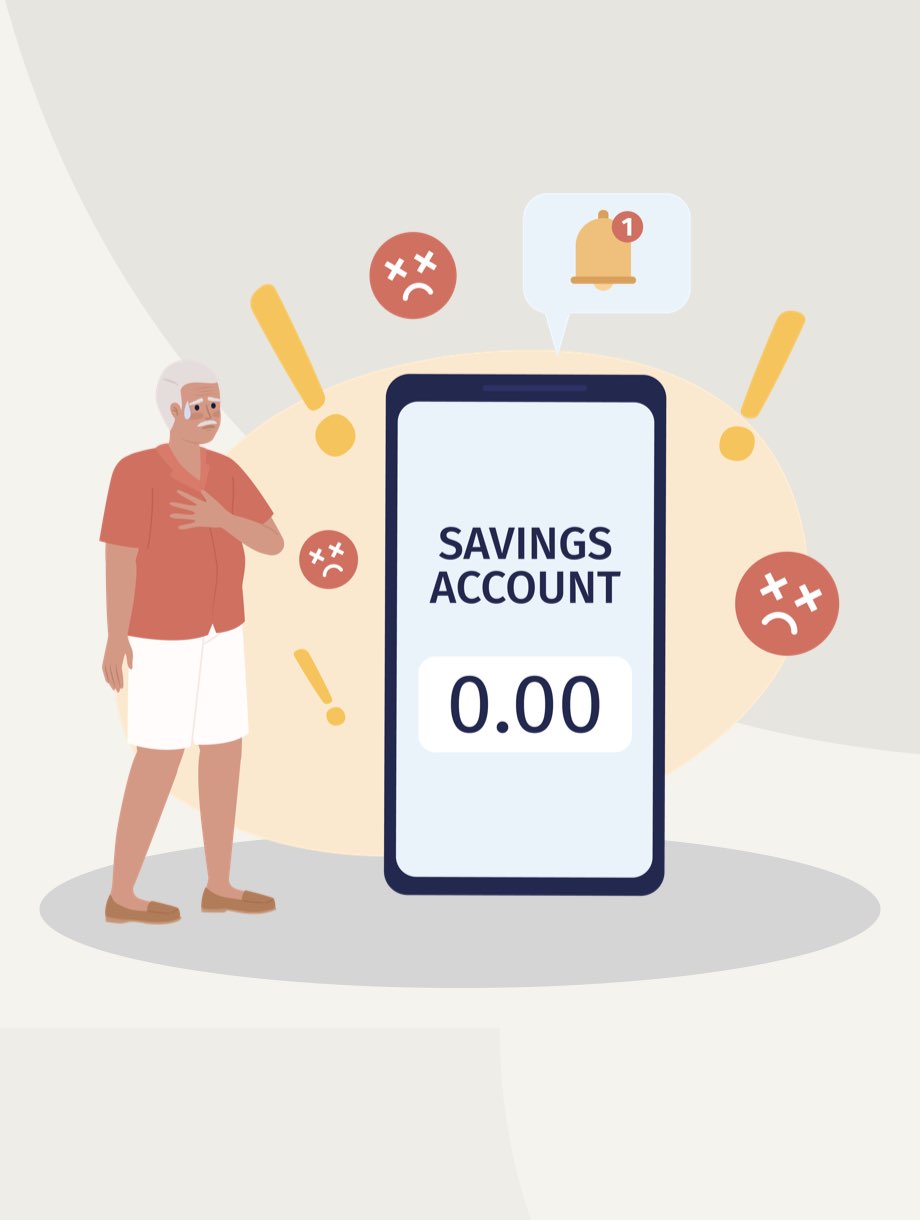
As inflation rises, its impact on retirees is becoming increasingly apparent. According to Schroders' 2024 US Retirement Survey, many retired Americans face financial challenges due to the decreasing value of their savings. Here are some key findings:
Financial Situations in Retirement
- Living the Dream: 4% of retirees reported being in an ideal financial situation.
- Comfortable: 44% described their financial situation as comfortable.
- Not Great, But Not Bad: 34% felt their financial situation was neither particularly good nor bad.
- Struggling: 15% admitted they were struggling financially.
- Living the Nightmare: 4% described their financial situation as a nightmare.
Other Key Findings
- Insufficient Savings: Less than half (44%) of retirees believe they have saved enough, while 32% are certain they haven't, and 24% are unsure.
- Top Concerns:
- Inflation: 89% are concerned about inflation reducing the value of their assets.
- Healthcare Costs: 85% worry about higher-than-expected healthcare expenses.
- Market Downturns: 76% fear a significant market downturn could deplete their assets.
- Income Generation: 69% are uncertain about how to generate income or draw down assets.
- Longevity Risk: 68% are concerned about outliving their savings.
- Financial Stress: One in three retirees worries that financial stress is affecting their health, and 26% lose sleep over their financial situation.
- Unplanned Expenses: Nearly half (47%) report higher-than-expected expenses in retirement, with healthcare costs consuming 14% of their monthly income on average.
- Uncertainty: 58% of retirees do not know how long their savings will last, and 63% wish they had done more planning before retiring.
This diversity in experiences underscores the varied impact of financial planning and the importance of tailored solutions to meet individual needs in retirement.
Solutions to Address These Challenges
Financial Planning and Education
- Don't Wait: Whatever stage you are at with your retirement, it's never too late to make necessary changes and correct your course.
- Seek Professional Advice: Consult with a financial professional to create comprehensive retirement plans considering inflation, healthcare costs, and market volatility.
- Education Programs: Participate in educational programs focused on retirement planning, financial literacy, and investment strategies to help you make informed decisions.
Diversification of Income Sources
- Multiple Income Streams: Diversify income sources, such as considering part-time work, annuities, and rental income to supplement retirement savings.
- Proper Portfolio Mix: A diversified portfolio with the appropriate amount of different asset classes can help counter the effects of inflation and the subsequent volatility it induces.
Healthcare Planning
- Health Savings Accounts (HSAs): Maximize contributions to HSAs to cover future healthcare expenses tax-free.
- Medicare Supplement Plans: Consider purchasing supplemental Medicare insurance to cover additional healthcare costs not included in standard Medicare plans.
- Long-Term Care Considerations: Proper planning can help mitigate the financial impact of long-term care, one of the most significant and unpredictable expenses retirees may face. Understand the different types of care and what types of LTC insurance are available.
Stress Management and Health
- Mental Health Support: Access mental health resources and support groups to manage stress and anxiety related to financial concerns.
- Healthy Lifestyle: Maintain a healthy lifestyle through regular exercise, a balanced diet, and routine medical check-ups to reduce healthcare costs.
Review and Adjust Plans Regularly
- Periodic Reviews: Regularly review and adjust retirement plans to account for changes in market conditions, inflation, and personal circumstances.
- Contingency Plans: Develop contingency plans for unexpected expenses or market downturns to ensure financial stability.
By addressing these challenges proactively and implementing strategic solutions, retirees can better manage the impact of inflation and other financial stressors, ensuring a more secure and comfortable retirement.
Freeing Up Money
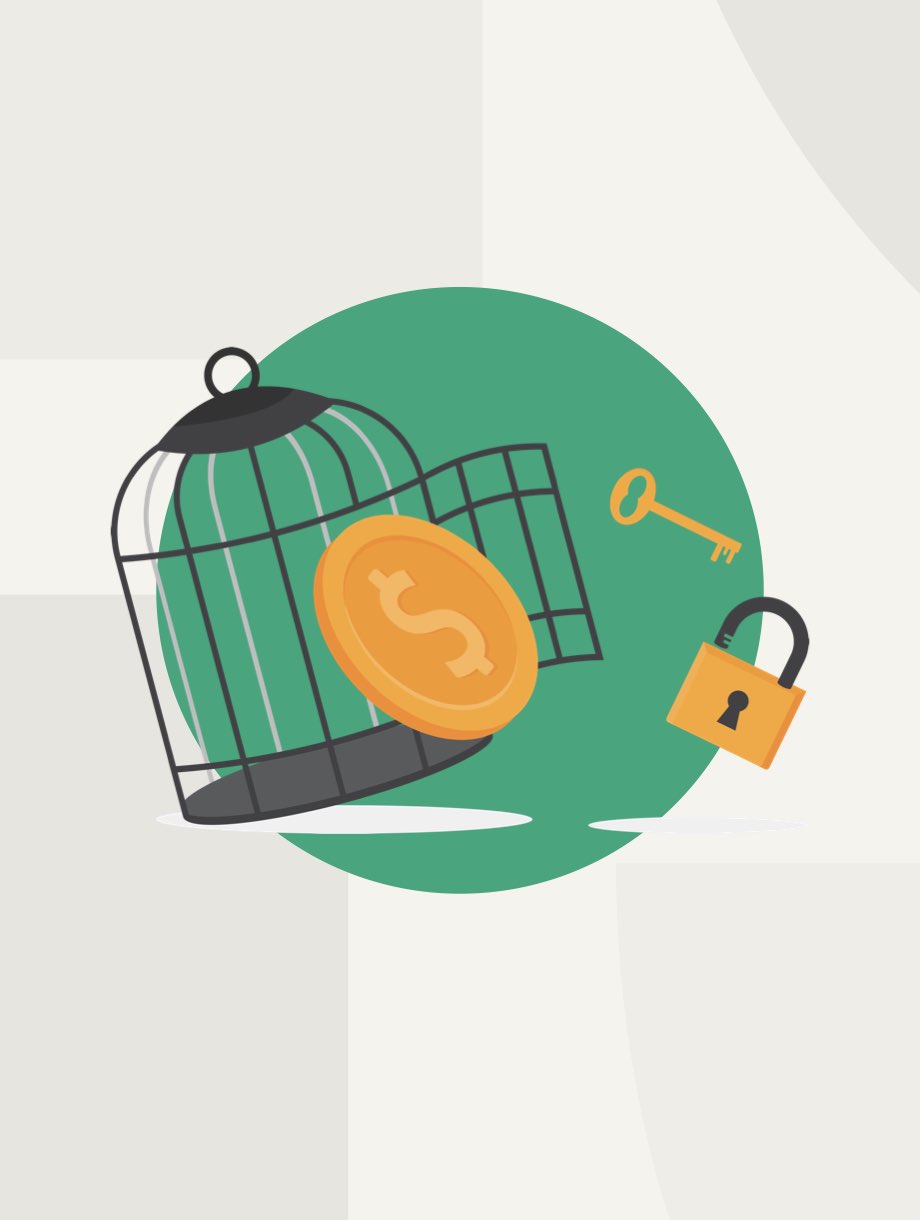
A Smart Move for Your Financial Future
Embarking on the path to financial literacy marks the initial phase of your journey toward achieving financial independence. This crucial first step lays the groundwork, but the true transformation in your financial health begins when you actively start reallocating funds you're currently using for immediate needs and wants, toward saving for your future. Engaging with a financial professional from WealthWave can be a game-changer, empowering you to make informed, strategic decisions that will solidify your path to financial security.
To kickstart this process, let’s delve into some effective strategies to maximize your hard-earned money. A great starting point is to familiarize yourself with the 7 Money Milestones, as detailed in the TheMoneyBooks series. These milestones provide a structured approach to managing your finances, helping you to identify areas where you can cut back on spending and increase your savings. By applying these principles, you'll begin to see a transformation in how you view and manage your money, leading to a more secure and prosperous financial future. Let's embark on this exciting journey together, exploring practical ways to unlock the full potential of your financial resources.
Start with Term Life Insurance
One of the initial steps in financial planning is to thoroughly shop for your term life insurance if you own some. It's crucial to ensure that the policy you choose is modern, up-to-date, and fully equipped with the features and benefits for which you qualify and that meet your specific needs and desires. Additionally, the policy should be offered at a competitive, low price.
Diligently shopping for term life insurance is not just a task; it's an opportunity that can potentially save you a significant amount of money every year. By securing the right policy, not only do you provide a safety net for your loved ones in case of any unforeseen events, but you also manage to free up substantial funds that can be redirected toward your future savings or other financial goals. This strategic approach toward selecting term life insurance is essential for anyone looking to optimize their financial security and ensure their peace of mind.
Adjust Your W-4 Allowances
An additional, often overlooked strategy to increase your available cash is by fine-tuning your W-4 allowances. A lot of individuals eagerly anticipate their tax refund annually, without realizing that this essentially equates to providing the government with a loan of their money, without earning any interest on it. By meticulously adjusting your W-4 form to more accurately represent your rightful tax deductions, you can effectively reduce or completely eliminate your tax refund.
This adjustment ensures that you retain a larger portion of your earnings in each paycheck throughout the year, rather than waiting for a lump sum refund. With the extra money available in your paycheck, you have the immediate flexibility to channel these funds into savings or to explore various investing opportunities, thereby making your money work harder for you right away. This proactive approach not only improves your financial health but also empowers you to take control of your finances with strategic planning.
Identify Obvious Savings Opportunities
Beyond the basic expenses of insurance and taxes, numerous opportunities exist to liberate extra funds in your budget. Consider looking into the following strategies:
- Cutting Unnecessary Subscriptions: Take a closer look at your monthly expenditures on subscriptions. Many of us accumulate subscriptions for services we seldom use. Conduct a thorough review and eliminate those that you find are not essential to your daily life. This can lead to significant savings over time.
- Reducing Utility Bills: There are several straightforward changes you can make to significantly reduce your utility bills. This includes adopting energy-efficient appliances which consume less electricity, being mindful of water usage by fixing leaks and using water-saving fixtures, and ensuring lights and electronics are turned off when not in use. These small adjustments can accumulate into substantial savings.
- Refinancing Debt: In an environment where interest rates fluctuate, there may be opportunities to refinance your mortgage, student loans, or other forms of debt. Refinancing can potentially secure you lower interest rates, which means lower monthly payments and less money paid over the life of the loan. It's worth researching and consulting with financial professionals to find the best options available.
- Eating Out Less: The convenience of dining out or ordering food can quickly add up. By preparing meals at home, you not only gain the opportunity to eat healthier but also save a considerable amount of money. Home cooking allows for bulk purchasing and meal prepping, which are both cost-effective strategies.
- Smart Shopping: Becoming a savvy shopper can significantly cut your spending. Utilizing coupons, taking advantage of sales, and buying in bulk for items that you use regularly can lead to noticeable savings. Also, consider the value of products before purchasing to ensure you're making smart, economical choices.
By examining these areas and implementing changes, you can free up money in your budget that can be used for savings, investments, or other financial goals.
The Intelligence Test
This exercise transcends the bounds of a mere financial task, evolving into a true test of intelligence. The legendary theoretical physicist, Albert Einstein, once eloquently stated, "The definition of insanity is doing the same thing over and over again and expecting different results." This powerful statement underscores the futility of repetitive actions without change or adaptation, especially in the context of financial management. It requires no intellectual effort to simply leave your money stagnant, allowing it to lose its potential value and growth opportunities.
In contrast, it demands a considerable amount of wisdom, foresight, and strategic thinking to reallocate your funds effectively and make them work to your advantage. Warren Buffett, one of the most successful investors of all time, famously advised, "Do not save what is left after spending, but spend what is left after saving." This profound advice highlights the importance of prioritizing saving and investing over immediate gratification by managing expenditures.
By adopting this forward-thinking mindset, you not only prioritize saving and investing but also lay the foundation for a more secure and prosperous financial future. This approach encourages a proactive stance toward financial management, where active engagement and thoughtful decision-making lead to sustained growth and stability.
Call to Action
Now is the crucial time to seize control of your financial destiny. The journey begins with educating yourself about finances and becoming financially literate, a fundamental step toward empowerment. However, knowledge alone isn't sufficient. It's essential to take a proactive stance by partnering with a financial expert from WealthWave, who can guide you in unlocking the true potential of your hard-earned money.
Begin by assessing your term life insurance to ensure it aligns with your current needs, adjust your W-4 allowances to optimize tax benefits, and meticulously search for other easily overlooked savings opportunities. It's crucial to understand that being adept at managing your finances today lays the foundation for a secure and prosperous future. Don't delay in taking decisive action to maximize your financial potential.
Reflecting on the wisdom of Benjamin Franklin, "An investment in knowledge pays the best interest," it becomes clear that by applying the financial insights and strategies you learn, you can create a thriving future for yourself and your loved ones. The path to financial freedom is within your grasp. Embrace the journey, invest in your financial education, and start making informed decisions today. The sooner you begin, the sooner you'll experience the profound benefits of financial independence and security. Don't hesitate—embark on your path toward financial freedom and witness the transformation in your financial well-being.
Blueprint for Prosperity
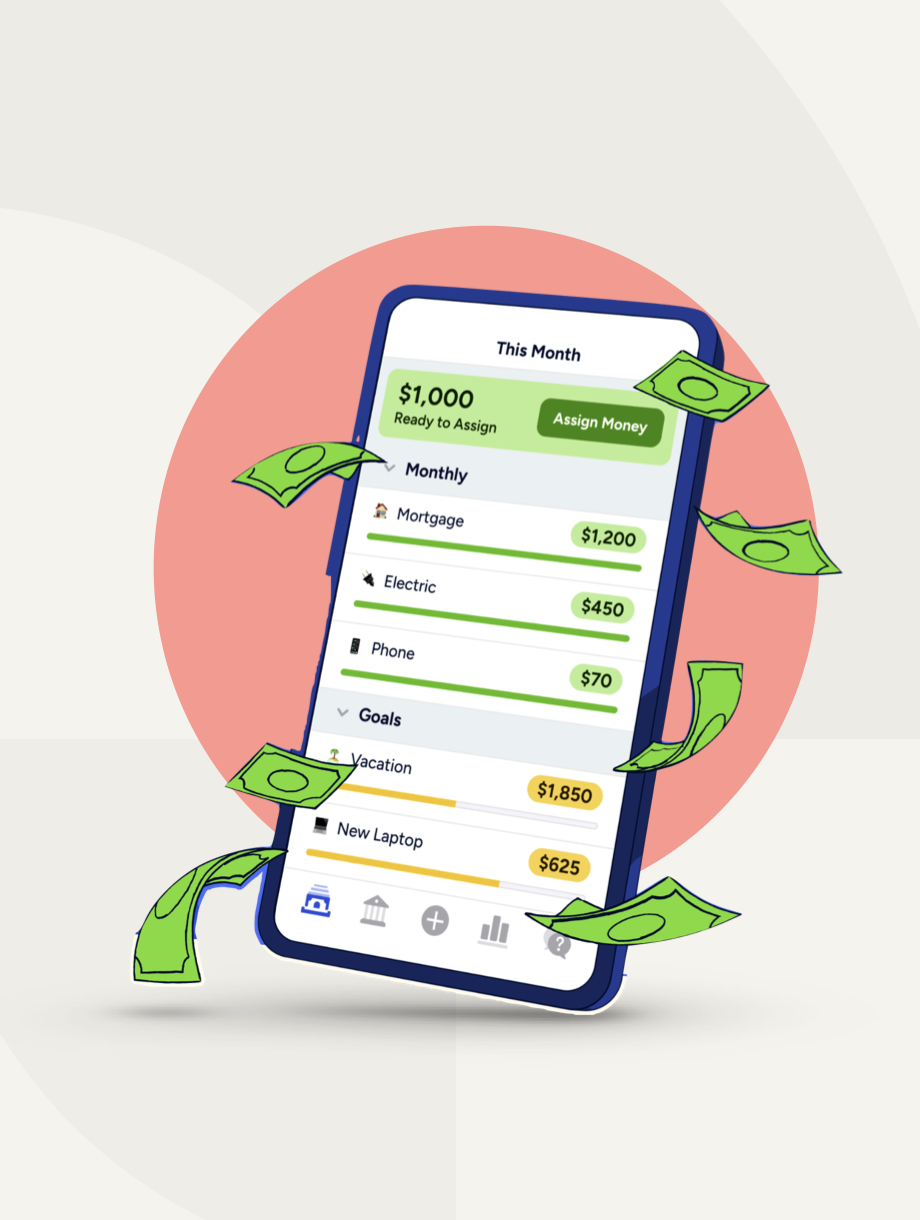
Crafting Your Personal Budget
Imagine two friends, Alex and Jordan, who are in similar financial situations, both earning the same salary from their respective jobs. Despite their similar incomes, their approach to managing their money is vastly different. Alex finds himself living paycheck to paycheck, frequently stressed about his financial situation and often running out of money before the month ends. This constant financial pressure leaves him unable to enjoy his earnings or save for the future.
On the other hand, Jordan seems to lead a more relaxed financial life. He's not only managing to cover his monthly expenses comfortably but is also saving for a dream vacation. The key to Jordan's financial peace of mind? He adheres to a well-structured budget. This budget allows him to allocate his earnings in a way that covers his essential expenses, while also setting aside money for savings and leisure activities. As a result, Jordan experiences less financial stress and has the freedom to plan for future enjoyments, such as his dream vacation, something Alex struggles to imagine for himself.
“A budget is telling your money where to go instead of wondering where it went.”
- John Maxwell
The Importance of Budgeting
Budgeting transcends mere expense tracking; it's a proactive approach to mastering your financial future. A budget is designed to be your roadmap to financial empowerment. By carefully following the steps outlined here, you will learn how to craft a budget that resonates with your lifestyle and financial goals. This isn't about restrictive living; it's about making informed choices that enable you to live more like Jordan, who thrives by making his money work for him, rather than like Alex, who is perpetually trying to catch up with his finances. Through this guide, you'll discover the keys to unlocking a future where your financial dreams are not just possibilities but realities.
Creating Your Budget: A Step-by-Step Guide
- Understand Your Income: Begin by meticulously calculating your monthly take-home pay. This includes all your earnings after taxes and deductions. Knowing your exact income is the foundation for effective budgeting.
- Track Your Spending: Make it a habit to record every single expense, no matter how small. This detailed tracking will illuminate areas where you might be overspending, allowing you to make informed decisions about where to cut back.
- Set Realistic Goals: Establish clear, achievable financial objectives. Whether you're saving for a comfortable retirement, a dream vacation, or an emergency fund, having specific goals provides direction and motivation to stick to your budget.
- Plan for Expenses: Organize your spending into distinct categories such as housing (rent or mortgage), groceries, entertainment, and utilities. This categorization not only simplifies tracking but also helps in allocating funds appropriately, ensuring coverage for all essential needs.
- Adjust as Necessary: Understand that a budget is not immutable. As your life circumstances evolve—be it a career change, a move, or unexpected expenses—so too should your budget. Regularly reviewing and adjusting your budget ensures it remains relevant and effective in meeting your financial goals.
Incorporating Technology: YNAB
In the fast-paced, digital world of today, budgeting apps such as YNAB (You Need a Budget) have emerged as great tools. YNAB's foundational philosophy is centered around the innovative concept of giving every dollar a specific role, which entails planning for unforeseen events and striving to escape the often stressful paycheck-to-paycheck lifestyle.
By adopting these tools, you can greatly simplify the complexities of budgeting. This, in turn, makes navigating the financial landscape much easier, thereby helping users to more effectively reach their financial objectives, whether that's saving for retirement, preparing for emergencies, or funding a dream vacation. Utilizing such apps can provide a clearer path towards financial stability and success.
Real-Life Success Story: Emily's Journey
Emily's journey is a powerful tale of financial liberation. Once burdened by a growing mountain of debt and a lifestyle that far exceeded her means, Emily found herself at a crossroads. Faced with the daunting task of turning her financial situation around, she made a decisive choice to take control of her finances. By adopting a meticulous approach to budgeting and embracing the principles of YNAB (You Need A Budget), Emily embarked on a disciplined path toward financial freedom.
She meticulously tracked every expense, cut unnecessary spending, and focused on paying off her debts one step at a time. Her dedication and commitment paid off remarkably. Within the span of just one year, Emily not only cleared her debt completely but also succeeded in building a robust emergency fund, safeguarding her future against unforeseen expenses. Emily's story is more than just an account of debt elimination; it is a testament to the transformative power of a well-executed budget and the enduring impact of financial discipline.
Following Expert Guidance
“Budgeting has only one rule: Don’t go over budget.”
- Leslie Tayne
This simple yet powerful piece of advice captures the very essence of effective financial management. It emphasizes the importance of strict adherence to your budget, regardless of the circumstances or temptations you might face. By sticking to your budget, you ensure that your financial goals and plans remain on track, laying a solid foundation for financial stability and success. Seek out expert advice and guidance, whether from a financial professional, budgeting apps, or books like this one, to further enhance your budgeting skills.
The Ripple Effect of Budgeting
Budgeting is a powerful tool that not only significantly improves your financial health but also elevates your overall life satisfaction to new heights. By giving you a clear understanding of your financial inflows and outflows, budgeting effectively reduces financial stress, which is a common source of worry for many.
Furthermore, it plays a crucial role in mending and improving relationships strained by financial disputes, fostering a more harmonious home environment. Most importantly, budgeting acts as a bridge to your dreams, enabling you to set and achieve realistic financial goals that bring you closer to realizing your aspirations, whether it's buying a new home, traveling the world, or securing a comfortable retirement.
Your Financial Freedom Awaits
Remember, the essence of budgeting is not about putting unnecessary constraints on your lifestyle; rather, it's about seizing control and making well-informed decisions that set the stage for achieving financial independence. The key is to start with small, manageable steps, and remain consistent in your efforts. Over time, these small steps will lead to significant changes in your financial landscape, allowing you to witness a transformation that can secure your future.
To embark on this journey, the first actionable step is to gain a solid understanding of your current financial situation. This involves closely examining your income and expenses to identify where your money is going each month. Following this, you can move forward with establishing a budget that suits your needs and goals. This doesn't have to be a complex process; a simple spreadsheet or utilizing a budgeting app like YNAB (You Need A Budget) can be incredibly effective tools. What's most important is that you take that initial step.
Let the stories of people like Jordan and Emily, along with countless others who have successfully navigated their way to financial freedom, serve as your inspiration. These stories underscore that, regardless of your starting point, the journey to financial well-being is possible with determination and the right approach.
Your journey toward financial freedom officially begins with this very first step. It's imperative not to postpone taking action in anticipation of a "perfect" moment. The reality is, the perfect time is now. By deciding to take control of your finances today, you're setting yourself up for a future filled with more security, peace of mind, and gratitude from your future self. Start now, and let each step forward be a building block toward your goal of financial independence.
Knowledge is Only the First Step
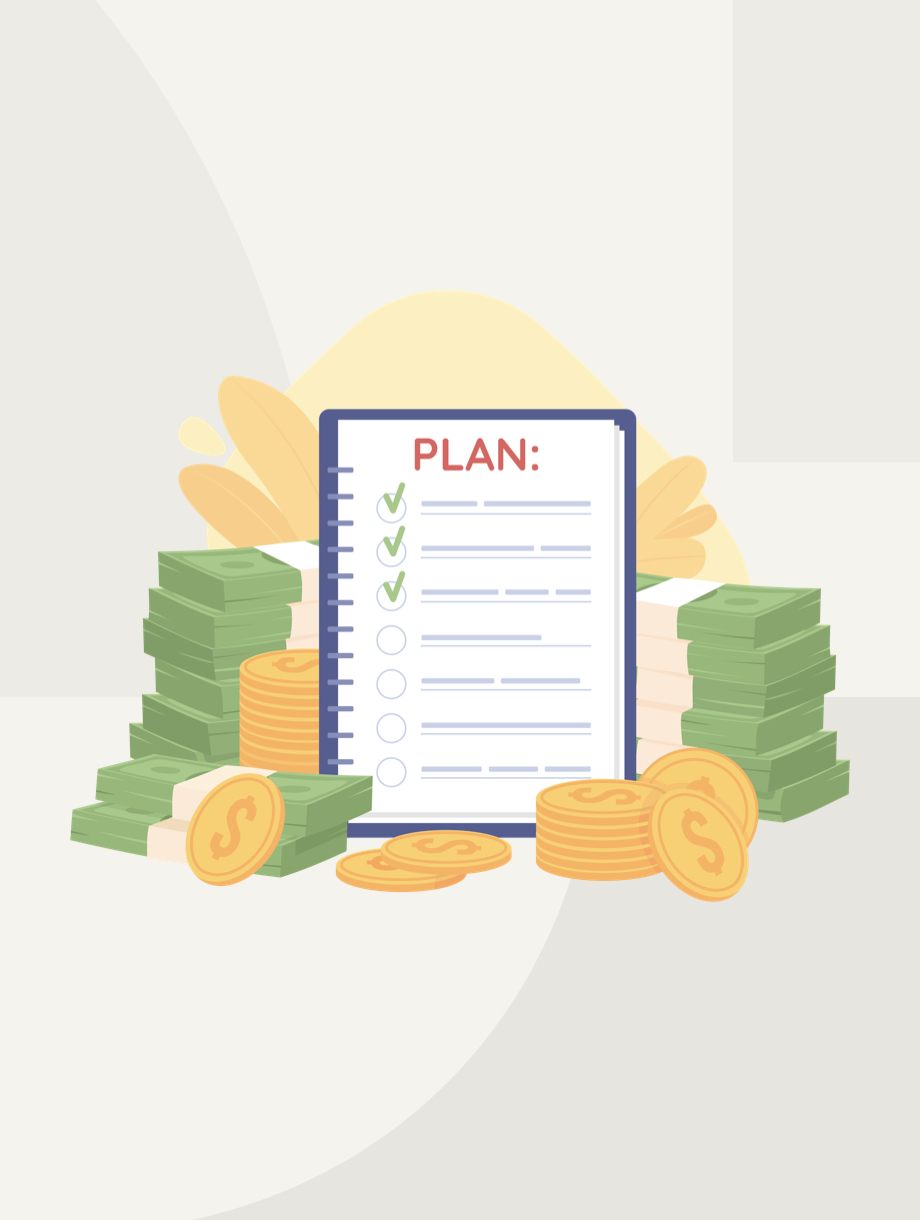
Information on personal finance is abundant everywhere you look. From detailed guides on budgeting and investing to advice on debt management and retirement planning, the resources available to enhance financial literacy are virtually limitless. Yet, despite the widespread availability of this valuable information, many individuals struggle to achieve financial stability. This paradox underscores a fundamental truth: financial literacy is crucial, but it is only effective when coupled with a plan and action.
The Importance of Financial Literacy
Financial literacy refers to the understanding of various financial areas including managing personal finance, money and investing. It empowers individuals to make informed decisions about their money, from everyday choices about spending and saving to long-term decisions about investment and retirement. The advantages of financial literacy are clear: it enables better budget management, reduces financial stress, and increases the likelihood of achieving financial stability.
Knowledge Alone Is Not Enough
While gaining financial knowledge is a critical step towards financial empowerment, it is not sufficient by itself. Knowledge must be transformed into action. Without application, the most sophisticated financial strategies and principles remain theoretical and fail to impact an individual's financial health.
The Gap Between Knowledge and Action
Several factors contribute to the gap between acquiring financial knowledge and implementing it:
- Procrastination: Many people put off financial planning and investment due to fear, uncertainty, or the belief that it can always be handled later.
- Overwhelm: The vast array of financial instruments and strategies can be daunting, causing paralysis rather than action.
- Lack of Specific Goals: Without specific financial goals, it is challenging to apply general knowledge in a meaningful way.
- Behavioral Barriers: Emotional spending, lack of discipline, and other behavioral factors often impede the practical application of financial knowledge.
Bridging the Gap: Turning Knowledge into Action
The key to bridging the gap between knowledge and action in financial literacy lies in targeted, manageable steps:
- Start with a Plan: Begin by outlining clear, achievable financial goals. Whether it's saving for a down payment, investing in companies, or paying off debt, specific goals provide a tangible target to work towards.
- Implement Budgeting: Use budgeting tools to keep track of spending and manage finances efficiently. A budget creates a framework for decision-making and helps enforce discipline.
- Automate Finances: Automating savings and investments can help overcome procrastination and ensure consistent financial growth.
- Seek Accountability: Sharing goals with a partner or financial professional can increase accountability and encourage adherence to financial plans.
- Educate Continuously: Stay updated with financial news and continue educating yourself about financial products and strategies. Ongoing education helps refine strategies and adapt to changing financial landscapes.
Working with a Financial Professional: An Easy First Step
For many, figuring where to start can be overwhelming, especially when it comes to applying the knowledge they’ve gained. In such cases, consulting a financial professional can be an excellent first step towards turning knowledge into action. Working with an expert offers several benefits and can significantly simplify the process of financial management.
Benefits of Consulting a Financial Professional
- Personalized Advice: Financial professionals can provide tailored advice based on your unique financial situation, goals, and risk tolerance. This personalized approach helps in crafting strategies that are more likely to succeed because they are designed specifically for you.
- Complexity Simplified: They are adept at breaking down complex financial concepts and products into understandable terms. This can be particularly helpful for those who find the world of finance daunting or are new to financial planning.
- Accountability: Regular meetings with a financial professional ensure that you stay on track with your financial goals. They serve as a constant reminder of your financial commitments and help maintain your focus on long-term objectives.
- Access to Resources: Financial professionals often have access to tools and resources that may not be readily available to the general public. This can include advanced market research, financial planning software, and wider range of investment vehicles.
- Emotional Detachment: One of the biggest challenges in financial decision-making is emotional bias. Financial professionals offer an objective perspective, making it easier to make decisions based on sound financial reasoning rather than emotions like fear or greed.
Getting Started
Financial literacy is a powerful tool, but its true value is realized only when translated into action. By bridging the gap between knowledge and practical application, individuals can not only enhance their own financial wellbeing but also contribute to the overall economic health of society. As the adage goes, "A journey of a thousand miles begins with a single step." In financial literacy, that step is moving from knowledge to action.
The Importance of Long-Term Care Insurance

A Necessity in Today’s Ageing Society
As we move deeper into the 21st century, two significant trends are reshaping the healthcare landscape: rising medical costs and increasing life expectancy. These changes are creating a growing need for long-term care insurance, a type of coverage many may overlook, but which can prove invaluable in ensuring financial stability and quality care in our later years.
Rising Medical Costs: A Growing Concern
The cost of healthcare has been on an upward trajectory for several decades. Factors such as advancements in medical technology, prescription drug prices, and administrative expenses contribute to this rise. More specifically, as the treatments become more sophisticated and comprehensive, their costs rise accordingly, impacting how much care one can afford out of pocket.
These costs can be daunting for individuals, especially seniors, who may require prolonged medical care or assistance with daily activities. Long-term care (LTC) insurance helps mitigate these expenses, covering services that regular health insurance policies typically do not, such as in-home care, nursing facility care, or assisted living.
Extended Life Expectancy: A Double-Edged Sword
Thanks to better healthcare services, nutrition, and living conditions, people are living longer than ever before. While this is a positive development, it also brings with it the challenge of ensuring that these additional years are lived with dignity and independence. As life expectancy increases, so does the potential need for prolonged periods of medical and personal care.
Statistically, about 70% of individuals over 65 will require some form of long-term care during their lifetime. This care is not just medical; it often includes help with daily activities such as bathing, dressing, and eating—tasks that are essential for maintaining a decent quality of life.
The Role of Long-Term Care Insurance
Long-term care insurance offers several benefits:
- Financial Security: LTC insurance helps protect your savings and assets from the high costs of care, which can quickly deplete one’s life savings.
- Flexibility of Care: It provides more choices for the type of care received and the location of that care. This could mean receiving care at home, which many prefer and often less disruptive than moving to a facility.
- Relief for Family Members: Family members often bear the burden of care. LTC insurance can alleviate this pressure by providing professional care, allowing family relationships to maintain more of their traditional dynamic.
Considerations Before Purchasing LTC Insurance
While the benefits are clear, deciding to purchase LTC insurance requires careful consideration:
- Cost vs. Benefit: Premiums can be high, especially if you start purchasing late in life. It’s advisable to consider buying LTC insurance in your mid-50s to early 60s.
- Inflation Protection: As the cost of care continues to rise, it’s crucial that your LTC policy includes inflation protection to ensure that the benefits you receive keep pace with rising costs.
- Policy Details: Understand what triggers your benefits, the types of care covered, and any exclusions or limits. Each policy is different, so comprehending the fine print is essential.
Working with a Financial Professional
Choosing the right long-term care insurance requires navigating a complex landscape of options and considerations. This is where a financial professional can be invaluable. They can help you:
- Assess your Needs: They can provide personalized insights based on your health status, financial resources, and family history.
- Understand Policy Options: They can help decipher the terms and conditions of various policies, ensuring you understand what is covered and what is not.
- Evaluate Costs and Benefits: They can assist in determining the cost-effectiveness of a policy, taking into account your age, the likelihood of needing care, and the potential future costs of care.
- Stay Updated: Insurance products and regulations change frequently. Working with a professional ensures that your policy remains in line with current laws and best practices.
The Bottom Line
Long-term care insurance isn't just an insurance product; it's an integral part of financial strategy, specifically your retirement planning. As medical costs continue to climb and life expectancy stretches, having an LTC policy can be the key to maintaining your health, independence, and financial security in your golden years. Whether you are approaching retirement or are helping a loved one plan for the future, consider long-term care insurance as a vital investment in a secure and dignified later life, and consider engaging a financial professional to navigate this crucial decision.
The Rising Cost of a Comfortable Retirement

Americans Adjust Expectations in the Face of Economic Realities
In recent years, the estimated financial cushion needed for a comfortable retirement, colloquially known as the "magic number," has surged significantly among American adults. This figure has climbed to an all-time high, indicating profound shifts in economic perceptions and retirement planning. According to the 2024 Planning & Progress Study by Northwestern Mutual, U.S. adults now believe they will need $1.46 million to retire comfortably. This represents a sharp 15% increase from the $1.27 million reported just last year, and an even more staggering 53% rise from the $951,000 figure anticipated back in 2020.
This ballooning of the retirement threshold is notably outpacing current inflation rates, which fluctuate between 2% and 3%. The discrepancy highlights a growing concern among future retirees about the adequacy of their savings in the face of rising living expenses, healthcare costs, and potential economic turbulence.
The data from a survey conducted by The Harris Poll among over 4,500 U.S. adults illuminates several key trends that underline these concerns. Not only have expectations for necessary retirement funds increased, but a significant disparity exists between these expectations and current savings. The average U.S. adult currently has $88,400 saved for retirement, which is a decline from previous years and more than $10,000 below the five-year peak of $98,800 seen in 2021.
Moreover, different generations have varied expectations concerning their retirement needs. Gen Z and Millennials estimate they will need over $1.6 million to retire comfortably—significantly higher than the average. High-net-worth individuals anticipate needing nearly $4 million, reflecting perhaps both a broader awareness of future economic challenges and a more lifestyle-driven understanding of what a 'comfortable retirement' entails.
These shifting perceptions are also seen in the age demographics of retirement planning. The study shows that while the average American begins saving for retirement at age 31, Gen Z members are starting almost a decade earlier at 22. This could suggest a heightened awareness among younger Americans about the importance of early financial planning.
As concerns about financial security in retirement grow, many Americans remain unprepared for potential long-term economic downturns, healthcare costs, and the sufficiency of social security. Alarmingly, more than a third of Gen Xers and Baby Boomers have not taken any steps to address the possibility of outliving their savings, despite understanding the risks.
This study highlights a critical reality: Americans are adjusting their financial strategies and expectations to ensure a stable and comfortable retirement as the cost of living continues to rise and economic uncertainties persist. The increased "magic number" is not just a reflection of inflation but a deeper, more comprehensive reaction to the anticipated needs of the future. Whether this trend leads to a more secure retirement for many or exposes gaps in our economic preparedness remains an essential topic for policymakers, financial advisors, and the individuals planning their retirements.
The Role of Financial Literacy in Achieving Retirement Goals
Financial literacy emerges as a critical tool for effectively navigating these rising retirement costs. Understanding basic financial concepts such as compound interest, investment risk, and the benefits of diversified portfolios can significantly influence one’s ability to accumulate the necessary funds for a comfortable retirement. Financial literacy not only helps in making informed decisions but also empowers individuals to plan strategically and avoid common pitfalls such as high debt levels and inadequate savings rates.
Steps to Enhance Retirement Savings
Given the complexities of modern financial landscapes, here are actionable steps that individuals can take to better prepare for retirement:
- Start Early: The power of compound interest means that money saved today grows exponentially over time. Starting early can significantly reduce the burden of saving larger amounts later in life.
- Maximize Retirement Contributions: Take full advantage of tax-advantaged retirement accounts. Ensure to contribute at least enough to capture any employer match, which is essentially free money.
- Educate Yourself About Finances: Regularly invest time in understanding financial products and current market trends. Resources like our TheMoneyBooks series, financial blogs, and educational seminars can be invaluable.
- Create a Financial Plan: Develop a comprehensive plan that includes savings goals, growth strategies, and risk management. Consider consulting with a financial professional to tailor a plan to your personal needs and financial situation.
- Monitor and Adjust Investments: As you approach retirement, it’s crucial to adjust your investments to ensure it aligns with your risk tolerance and retirement timeline. This might mean shifting from aggressive investments to more conservative ones as you near retirement.
- Plan for Healthcare Costs: Medical expenses can be a significant burden in retirement. Consider investing in a Health Savings Account (HSA), looking into Long-Term Care plans, and researching Medicare options to ensure you are adequately covered.
- Prepare for Longevity: With life expectancies increasing, planning for a longer retirement is crucial. Ensure your savings plan takes into account the possibility of living 20 or 30 years
Navigating Towards a Secure Retirement
The rising "magic number" for retirement underscores a crucial reality: the financial landscape for future retirees is becoming increasingly challenging. With costs that outpace inflation and growing economic uncertainties, understanding and preparing for these financial needs is more important than ever. Financial literacy not only provides the tools needed to navigate this complexity but also empowers individuals to make decisions that secure their long-term financial well-being.
As Americans adjust their expectations and strategies in response to these financial pressures, the importance of proactive planning cannot be overstated. By adopting a disciplined approach to saving, investing wisely, and staying informed about financial health, individuals can not only meet but potentially exceed their retirement goals. This preparation will ensure a more comfortable retirement and provide greater financial security in a world of ever-changing economic dynamics.
The Perils of Overspending

Financial Literacy Month is a prime opportunity for everyone to recalibrate their approach to managing personal finances. In an era of easy access to credit and relentless advertising, overspending has become a common pitfall with far-reaching consequences. Let’s explore the ramifications of overspending and the vital role financial literacy plays in empowering individuals with the knowledge to make informed financial decisions.
The Reality of Overspending
Overspending is a common problem that occurs when one's spending surpasses one's income. This results in a reliance on credit and the buildup of debt, creating a cycle that is simple to enter but challenging to break free from.
To draw a parallel, imagine overspending as akin to consuming calories. If you consistently intake more calories than you burn, the surplus will eventually lead to weight gain. In the realm of finances, this "surplus" materializes as debt, which can escalate rapidly if left unattended. Just as excess calories can impact one's physical health, unchecked debt can significantly affect one's financial well-being, highlighting the importance of managing expenses wisely and living within one's means.
Consequences of Overspending
Immediate Financial Strain - The most immediate impact of overspending is the depletion of your financial cushion, leading to potential struggles to cover essential expenses. This scenario often results in increased reliance on credit cards, thereby kicking off a cycle of debt that can be challenging to break.
Debt Accumulation - Debt, particularly from high-interest credit cards, can spiral, impacting current and future financial health. It can obstruct the path to financial goals, such as saving for retirement or purchasing a home, by diverting funds that could have been saved or invested toward interest payments.
Credit Score Impact - A healthy credit score is crucial for financial flexibility and obtaining favorable terms on loans and credit. Overspending can lead to missed payments and high credit utilization ratios, significantly damaging your credit score. This, in turn, can lead to higher interest rates on future loans and credit scarcity when you most need it.
Long-Term Financial Health - The long-term consequences of unchecked overspending are severe. They include delayed or compromised retirement plans, an inability to accumulate wealth, and potential financial insecurity during emergencies. The stress of debt can also take a toll on mental health and personal relationships.
The Importance of Financial Literacy
Financial literacy offers the tools and knowledge necessary to navigate the complex world of personal finance. It encompasses understanding how to create and adhere to a budget, use credit responsibly, and set and achieve financial goals.
Budgeting and Planning - A well-structured budget is the foundation of financial health, enabling individuals to track and control their spending, save for the future, and allocate funds toward debt repayment. Understanding your cash flow — what comes in and what goes out — is critical in avoiding overspending.
Wise Use of Credit - Financial literacy includes understanding the cost of credit and how to use it to your advantage. This means knowing when and how to use credit cards, paying off balances in full to avoid interest, and leveraging credit for significant purchases without jeopardizing financial stability.
Setting Financial Goals - Identifying and working toward financial goals is a motivational aspect of financial literacy. Whether building an emergency fund, saving for a down payment on a home, or planning for retirement, having clear objectives helps focus spending and saving behaviors toward achieving those goals.
Embracing Financial Literacy
Financial literacy is the foundation of understanding and effectively managing your finances. It encompasses a range of essential skills and knowledge that empower individuals to make informed decisions about their money. From creating and sticking to a budget to using credit responsibly and setting achievable financial goals, financial literacy equips individuals with the tools needed to navigate the complexities of personal finance confidently.
By developing a strong grasp of financial concepts and practices, individuals can not only make sound financial decisions in their daily lives but also build a secure financial future. This includes learning to save and invest wisely, understanding the implications of different financial choices, and planning for long-term financial stability.
Moreover, financial literacy plays a crucial role in promoting financial well-being and independence. It empowers individuals to take control of their financial situations, avoid common pitfalls such as debt accumulation, and work towards achieving their financial aspirations. Ultimately, cultivating financial literacy is a lifelong journey leading to greater financial security, peace of mind, and the ability to confidently navigate the ever-changing financial landscape.
Financial Literacy vs. Financial Capacity

Empowering Choices in April's Financial Literacy Month
April marks Financial Literacy Month, a time dedicated to raising awareness about financial education and empowering individuals to make informed financial decisions. While financial literacy is a term many of us are familiar with, the concept of financial capacity may not be as widely recognized. Yet, understanding the distinction between financial literacy and financial capacity is crucial for navigating the complexities of today's financial landscape.
What is Financial Literacy?
Financial literacy refers to the set of skills and knowledge that allows an individual to make informed and effective decisions with all of their financial resources. It encompasses understanding key financial concepts such as budgeting, saving, investing, and managing debt. Financial literacy is the foundation upon which individuals can build a secure financial future, navigate the complexities of financial products, and avoid common pitfalls like high-interest debt.
What is Financial Capacity?
Financial capacity, on the other hand, goes a step further. It not only involves having financial knowledge but also the ability to apply that knowledge in everyday life. Financial capacity includes the skills, tools, and resources necessary to make financial decisions effectively. This concept focuses on the practical application of financial literacy, taking into account an individual's unique financial situation, goals, and challenges.
The Interplay Between Financial Literacy and Financial Capacity
Imagine financial literacy as the theoretical knowledge you gain from reading a book on how to ride a bike, while financial capacity is the actual ability to get on the bike, balance, pedal, and navigate through traffic. You need the theory (literacy) to understand the mechanics and the practice (capacity) to actually ride the bike.
The Role of Financial Literacy Month
Financial Literacy Month serves as a crucial reminder of the importance of both understanding financial concepts and applying them to make sound financial decisions. It's an opportunity for individuals, communities, and organizations to engage in activities that promote financial education, from workshops and seminars to online resources and tools.
Building Financial Capacity
Building financial capacity requires taking proactive steps beyond acquiring knowledge. This includes:
- Setting Clear Financial Goals: Understand what you want to achieve, whether it's saving for retirement, buying a home, or funding education.
- Accessing Resources and Tools: Utilize budgeting apps, meet with financial professionals, and enrol in educational courses to manage your finances more effectively.
- Practicing Financial Decision-Making: Apply your knowledge by making real-life financial decisions, starting with smaller choices and gradually tackling more complex ones.
The Impact of Financial Literacy and Capacity
Enhancing both financial literacy and capacity can have a profound impact on individuals and communities. It leads to better financial well-being, reduces stress related to financial issues, and promotes a culture of informed financial decision-making. On a larger scale, it contributes to the overall economic stability and growth by fostering a financially educated population.
As we observe Financial Literacy Month, let's embrace both the acquisition of financial knowledge and the cultivation of financial capacity. By understanding the difference and importance of these concepts, individuals can navigate their financial journeys with confidence and resilience. Remember, financial literacy opens the door to knowledge, but it's through financial capacity that we can walk through it and take control of our financial destinies.
Empowering Older Women Through Grey Divorce: Insights and Solutions

The phenomenon of grey divorce, defined as divorce among adults aged 50 and older, has increasingly entered the public consciousness. As outlined in a detailed study published in the Journals of Gerontology: Social Sciences by Susan L. Brown, Ph.D., and I-Fen Lin, Ph.D., from Bowling Green State University, this demographic trend has been rising over the past five decades in the United States. Their research, "The Graying of Divorce: A Half Century of Change," not only charts this rise but also sheds light on the unique challenges and transitions faced by older adults, particularly women, navigating the complexities of divorce later in life.
The Growing Trend of Grey Divorce
Historically, the rate of grey divorce was modest but began to double from 1990 to 2010. Although there has been a slight decrease since then, the overall rate remains significantly elevated compared to earlier decades. Notably, while the rate among middle-aged adults has stagnated, it continues to climb among those aged 65 and older. This shift indicates a demographic change in those experiencing divorce, highlighting the importance of addressing the specific needs of this older population.
The Impact on Older Women
Older women facing grey divorce encounter distinctive challenges. Financial disparities, longer life expectancies, and potential employment gaps make the financial impact of divorce particularly pronounced for women. Socially, the task of rebuilding networks post-divorce can be daunting. At the same time, emotionally, the end of a long-term marriage brings its own set of grief and adjustment challenges.
Empowering Solutions for Navigating Grey Divorce
As the landscape of family dynamics shifts with the rising trend of grey divorce, it becomes crucial to address the specific challenges faced by older women embarking on this transition. The journey through a divorce later in life can be fraught with emotional upheavals, financial uncertainties, and social adjustments. However, within this transformative period lies an opportunity for growth, empowerment, and the rediscovery of individual resilience. Recognizing the unique hurdles older women face, below is a list of empowering solutions to navigate the intricacies of grey divorce.
Financial Independence and Security
- Financial Literacy Workshops: Tailored to the needs of older women, these workshops focus on managing finances independently, retirement planning, and understanding social security benefits.
- One-on-One Financial Planning: Consulting with financial professional specializing in divorce can clarify the implications of divorce settlements and retirement accounts.
Legal Support and Resources
- Accessible Legal Clinics: Legal clinics and pro bono services ensure women are well-informed about their rights and options, guiding them through the legal complexities of divorce proceedings.
Emotional Wellness and Support Networks
- Support Groups: Peer support groups offer a platform for sharing experiences and strategies, fostering community and mutual support.
- Counseling Services: Professional counseling can address the emotional aspects of divorce, offering personalized coping strategies.
Rebuilding Social Connections
- Community Engagement: Participation in community events, classes, or clubs can help rebuild social networks and foster new interests.
- Learning Opportunities: Pursuing new skills or hobbies can lead to personal growth and opportunities for social interaction.
Health and Wellness
- Wellness Programs: Programs focusing on nutrition, exercise, and mental health support the overall well-being of older women navigating divorce.
- Healthcare Navigation: Understanding post-divorce healthcare options is crucial, especially for those transitioning from a spouse’s insurance plan.
Secure and Comfortable Living
- Housing Guidance: Advice on downsizing, renting, or finding new housing can help women find secure and comfortable living arrangements post-divorce.
- Financial Aid for Housing: Financial assistance programs can ensure access to safe and affordable housing options.
Moving Forward
The increasing prevalence of grey divorce calls for a concerted effort to support older adults, particularly women, as they navigate this life transition. The research by Brown and Lin provides a critical foundation for understanding these needs and developing adequate support mechanisms. By focusing on areas such as financial planning, legal support, emotional well-being, and social connectivity, older women can emerge from the experience of grey divorce empowered and prepared to embrace a new chapter in their lives.
The Recipe for Longevity
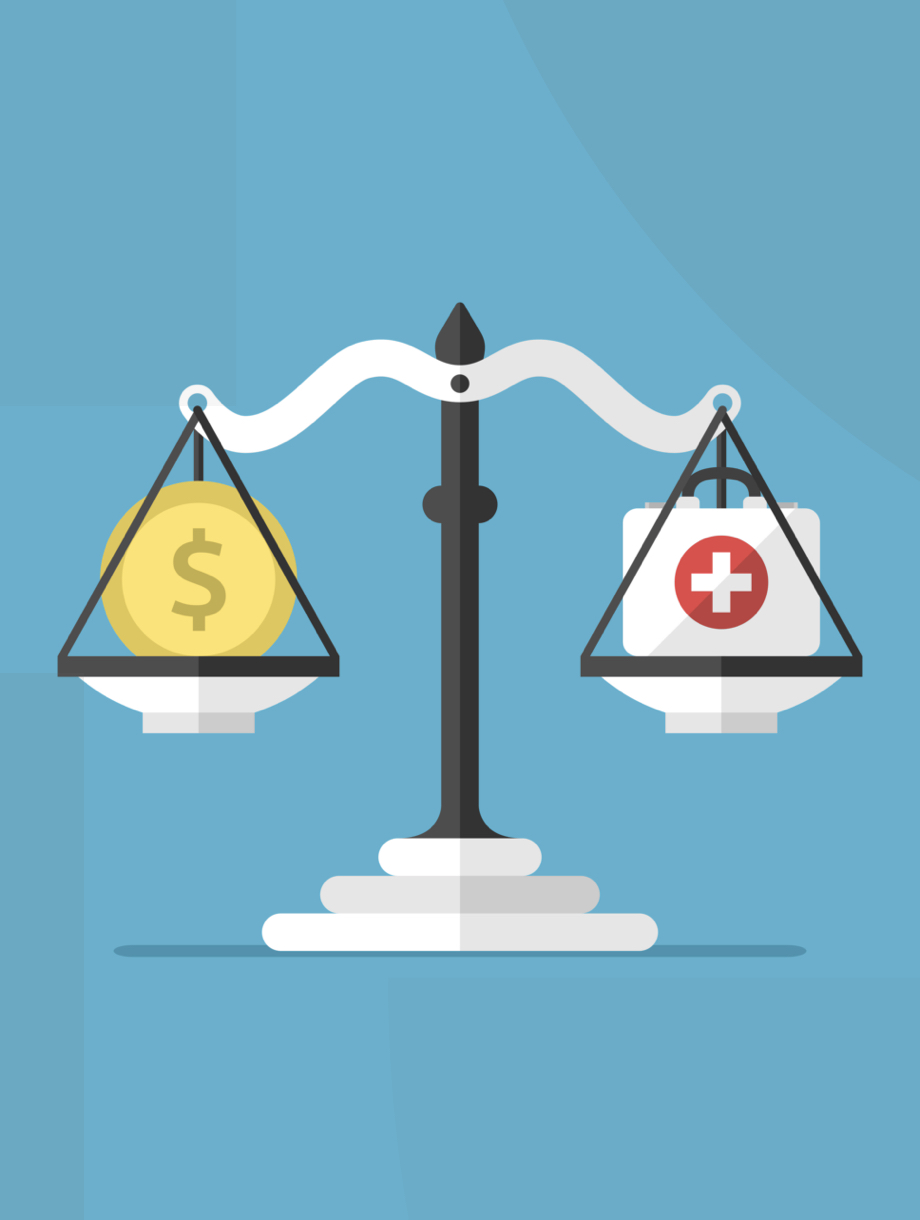
Better Health and More Wealth
Two indispensable ingredients stand out in the pursuit of a long and fulfilling life: better health and more wealth. Renowned gerontologist Dr. Ken Dychtwald, through his extensive research and insightful books, illuminates the significance of these factors in shaping our longevity journey.
By prioritizing our physical and mental well-being, adopting healthy lifestyle habits, and investing in our financial security, we can optimize our chances of leading a vibrant and prosperous life well into our golden years. Dr. Dychtwald's work illuminates the interconnectedness of health and wealth, offering valuable guidance and empowering individuals to make informed choices that positively impact their long-term well-being. Together, these essential elements create a solid foundation for a life of longevity, purpose, and fulfillment.
Dr. Dychtwald, a leading authority on aging, emphasizes the pivotal role of health in longevity. In his book "Age Wave," he articulates, "Health is not an optional luxury. Without it, we cease to be fully functional participants in life." Through this lens, he underscores the importance of proactive health management as a cornerstone of longevity. From maintaining a balanced diet to regular exercise and proactive healthcare practices, prioritizing health becomes a non-negotiable aspect of extending one's lifespan.
Moreover, Dr. Dychtwald emphasizes the correlation between financial well-being and longevity. In his book "The Power Years," he delves into the intertwined nature of wealth and longevity, stating, "Financial security provides a sense of stability and peace of mind that directly impacts our physical and emotional well-being." He advocates for prudent financial planning, emphasizing the significance of saving, investing wisely, and creating a robust financial framework to sustain oneself through life's journey.
Dr. Dychtwald recommends exploring educational resources like the TheMoneyBooks series to achieve these twin pillars of longevity. These books offer practical insights into financial literacy, empowering individuals to make informed financial decisions. By understanding concepts such as budgeting, investing, and wealth accumulation, readers can lay a solid foundation for their financial future.
Furthermore, Dr. Dychtwald stresses the importance of seeking guidance from financial professionals. Collaborating with a trusted advisor can provide personalized strategies tailored to individual financial goals and circumstances. This proactive approach not only enhances financial literacy but also cultivates a sense of confidence and security regarding one's financial trajectory.
The keys to a long and prosperous life lie in nurturing better health and cultivating more wealth. Drawing from Dr. Dychtwald's wisdom, these two elements are intertwined and essential for realizing our longevity potential. By embracing proactive health practices, educating ourselves on financial literacy, and seeking guidance from professionals, we can pave the way for a vibrant and fulfilling journey through the years ahead.
For those eager to embark on a transformative journey toward longevity and overall well-being, I strongly recommend immersing yourself in the thought-provoking and illuminating books Dr. Dychtwald wrote. With his extensive expertise in the field, his insightful writings will expand your knowledge and serve as a guiding light, inspiring you to take meaningful action toward a healthier, more fulfilling life. By delving into his wisdom, you will gain invaluable insights and practical strategies that can transform your perspective and empower you to make positive changes for long-term well-being and personal growth.
In addition to immersing yourself in the invaluable wisdom shared in Dr. Dychtwald's books, I highly encourage you to delve into the captivating TheMoneyBooks series. These empowering resources will equip you with the essential financial knowledge and skills needed to navigate the complexities of money management confidently, make informed decisions, and embark on a journey toward sustainable wealth creation.
Whether you are just starting your financial journey or seeking to enhance your existing knowledge, this series offers a comprehensive guide that covers a wide range of topics, from budgeting and investing to retirement planning and estate management. Embrace the opportunity to expand your financial literacy and empower yourself with the tools to secure a prosperous future.
To maximize your journey toward holistic success, consider partnering with a trusted and knowledgeable financial professional. Together, you can craft a personalized roadmap tailored to your unique circumstances and aspirations. This collaborative approach will ensure you are on the right track toward a healthier, wealthier, and more fulfilling life.
By investing in both your physical and financial well-being today, you are making a profound commitment to your future self. Take this valuable opportunity to create lasting positive change and establish a rock-solid foundation for a prosperous and purposeful future. Your future self will undoubtedly express gratitude for your proactive and transformative step towards a life brimming with abundance, fulfillment, and overall wellness. Seize the chance to cultivate a holistic approach to health and wealth that will shape your journey toward a genuinely extraordinary existence.
Equal Pay Day 2024
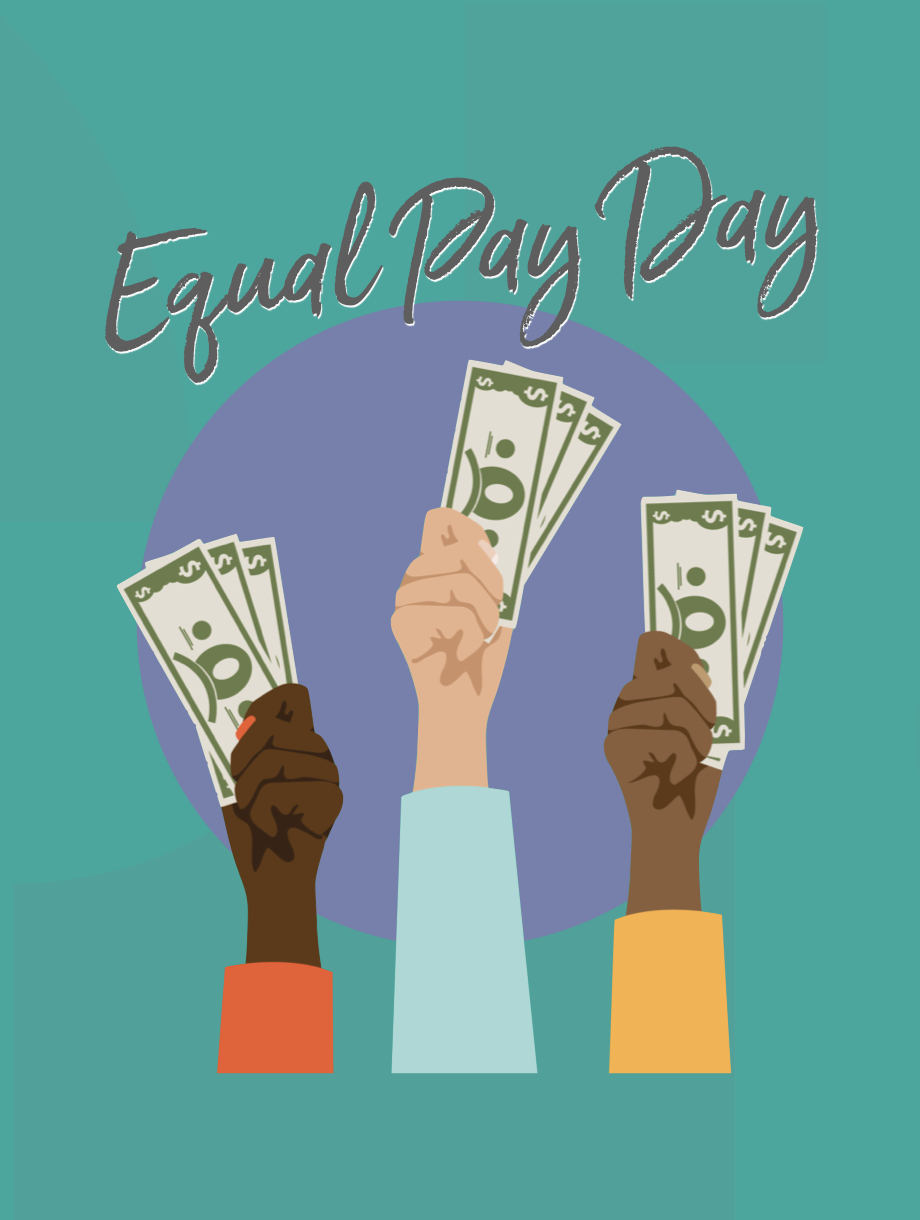
A Milestone and a Spotlight
Equal Pay Day symbolizes the ongoing struggle for gender wage equality. This significant day sheds light on the additional days women must work into the new year to reach parity with their male counterparts' earnings from the previous year. In 2024, women did not catch up to men’s income from 2023 until March 12th, more than two months after the end of the year.1
Despite progress made since the Equal Pay Act was established in 1963 during President Kennedy's administration, the journey to closing the gender pay gap remains fraught with challenges and slow progress. Addressing systemic barriers and advocating for fair wages for all individuals, regardless of gender, remains a crucial focus in our ongoing pursuit of equality in the workplace.
The landscape in 1963 witnessed a groundbreaking moment with the Equal Pay Act, a pivotal step toward eliminating wage discrimination based on gender. At that time, women earned a mere 60 cents for every dollar a man made. Moving forward to 1990, thirty years later, the gap only slightly narrowed to 70 cents.2 Fast forward another three decades to today, and women now earn 82 cents for every $1 men earn. While this progress is commendable, it reveals the gradual and uneven trajectory toward equality.3
The disparities are even worse for women of color, who confront the compounded challenges of gender and racial pay gaps. Black women earn 58 cents, Latinas earn 54 cents, and Native American women earn 60 cents for every $1 white, non-Hispanic men earn. Consequently, Equal Pay Day for these groups falls much later in the year (July 9 for Black women, October 3 for Latinas, and November 21 for Native women), casting a long shadow over their economic contributions and rights.1
Projections indicate that the gender pay gap may persist until 2059, a further 35 years into the future.4 This sluggish rate of change is unacceptable. It demands a renewed dedication to policies and strategies addressing the core issues of wage inequality. The gender pay gap transcends being merely a women's issue; it is a societal matter impacting the financial welfare of families and communities.
Advocating for pay transparency, robust enforcement of equal pay regulations, and bolstering support for women in underrepresented high-paying professions are crucial steps to expedite progress. Additionally, combatting the "motherhood penalty" and strong support for work-life balance is paramount to prevent women from sacrificing career growth for family obligations.
Equal Pay Day serves as both a milestone recognizing advancements women have achieved and a spotlight on the work that lies ahead. It beckons policymakers, employers, and individuals to redouble their efforts in attaining genuine wage parity. Let this Equal Pay Day not only be a commemoration of the past but a catalyst for a future where pay fairness is not just an aspiration but a concrete reality. The journey is long, but the goal remains clear: a future where pay is based on skill and ability, not gender or race.
Kim Scouller
1. AAUW, “March 12 is Equal Pay Day 2024,” (2024). https://www.aauw.org/resources/article/equal-pay-day-calendar/
2. Investopedia, “Gender and Income Inequality: History and Statistics,” GregDaugherty (Mar 1, 2023). https://www.investopedia.com/history-gender-wage-gap-america-5074898
3. Pew Research Center, “The Enduring Grip of the GenderPay Gap,” Rokesh Kochhar (Mar 1, 2023). https://www.pewresearch.org/social-trends/2023/03/01/the-enduring-grip-of-the-gender-pay-gap/#:~:text=The%20gender%20pay%20gap%20–%20the%20difference%20between,when%20they%20earned%2080%20cents%20to%20the%20dollar.
4. Forbes, “Gender Pay Gap Statistics in 2024,” KatherineHaan (Feb 27, 2023). https://www.forbes.com/advisor/business/gender-pay-gap-statistics/
Navigating Credit Invisibility

Empowering Women to Build Their Own Credit Identity
In the intricate dance of personal finance, credit invisibility remains a significant barrier for many. Still, it disproportionately affects women, especially those who have historically relied on their spouse's credit history. This reliance can leave women vulnerable and financially invisible when they face life changes such as divorce or widowhood. Understanding credit invisibility, its implications, and pathways to credit visibility is crucial in empowering women to establish and maintain financial independence.
The Reality of Credit Invisibility Among Women
Credit invisibility occurs when an individual lacks a credit report or has insufficient history to generate a credit score. This situation is particularly common among women who may have deferred financial management to their spouses, including using credit. As a result, despite potentially managing household finances or making regular payments, their financial reliability remains undocumented in the eyes of credit bureaus.
The Implications for Women
For women emerging from the shadow of a spouse's credit history, the implications of credit invisibility can be far-reaching. It can limit access to financial products necessary for independence, such as personal loans, mortgages, and business financing. This invisibility can also affect renting apartments, securing jobs that require credit checks, and obtaining competitive rates for insurance and utilities.
Pathways to Visibility for Women
Empowering women to build their own credit identity is vital for financial autonomy. Here are targeted example strategies that could help women transition from credit invisibility to visibility:
Secured Credit Cards: A practical first step, secured credit cards require a deposit that typically serves as the credit limit. This tool is invaluable for women looking to build credit independently, offering a way to demonstrate financial responsibility.
Credit Builder Loans: These loans are designed to help individuals build credit. The borrowed amount is held in an account. At the same time, payments are made, ideally suited for women aiming to establish a credit score without the risk of accruing unmanageable debt.
Authorized User Status: Becoming an authorized user on a trusted person's credit card can help women benefit from another's credit history. It's crucial to ensure that the primary account holder's credit behavior will positively impact your credit score.
Report Alternative Payments: Reporting rent and utility payments to credit bureaus can help establish a credit history. Services that facilitate this reporting can be particularly beneficial for women who have managed household expenses without receiving credit recognition.
Retail and Gas Credit Cards: While these cards often come with higher interest rates, they are generally more accessible. They can be a stepping stone for women to build their credit, provided balances are managed wisely.
Financial Education and Support: Seeking out financial education resources and support networks can empower women with the knowledge to navigate credit building and financial planning effectively.
Empowering Women Financially
For women facing credit invisibility due to relying on a spouse's credit history, the journey to establishing their credit identity is empowering and essential. By leveraging tools designed to build credit and adopting responsible financial habits, women can overcome the challenges of credit invisibility. This journey not only enhances their ability to access financial products but also secures their financial independence and resilience. As women take charge of their credit identities, they pave the way for a future where financial empowerment is within reach for all.
Teaching Children How Money Works

A Guide for Parents
One of the many responsibilities for parents is preparing our children for the real world, and a significant part of that preparation involves understanding money and finances. Teaching children how money works from a young age can set them up for success later in life. Here are some simple ideas for introducing financial concepts to your children in an engaging and age-appropriate way.
Start with the Basics: What is Money?
Begin by explaining what money is, the different forms it can come in (coins, bills, digital), and its purpose. Use real money as a visual aid; let them hold, count, and sort coins and bills to familiarize themselves with different values.
Activities:
Coin Identification: Teach them to identify and value different coins.
Play Store: Set up a mini-marketplace at home where they can "buy" and "sell" items.
Earning and Saving
Once they understand what money is, introduce the concept of earning money through chores or tasks. This not only teaches them the value of work but also the importance of saving.
Activities:
Chore Chart: Create a chore chart with associated earnings. It helps them understand work-reward dynamics.
Piggy Bank Savings: Encourage them to save their earnings in a piggy bank for something they want to buy.
Budgeting
Teaching kids to budget is about planning how to spend their money wisely. You can start this lesson even with young children using simple terms and examples.
Activities:
Envelope System: Use envelopes to allocate money for different purposes (e.g., savings, spending, charity). It visualizes budgeting concepts.
Goal Setting: Help them set financial goals, like saving for a toy, and plan their savings accordingly.
The Concept of Credit
While credit might seem a complex topic for kids, it’s crucial in today’s digital age. Explain credit as borrowing money that needs to be returned, usually with extra (interest).
Activities:
Loan for a Toy: Offer to "lend" them money for a toy they want, with a simple "interest" concept, like doing extra chores.
Smart Spending
Teach them that spending money wisely means thinking carefully about what you're buying and whether you need it.
Activities:
Wants vs. Needs: Discuss the difference between wants and needs, and have them categorize items in a magazine or flyer.
Comparison Shopping: Show them how to compare prices and the value of items in stores or online.
Generosity and Giving
Understanding money also involves learning about generosity and giving to those in need.
Activities:
Charitable Giving: Encourage them to allocate a portion of their savings to donate to a charity of their choice.
Volunteering: Involve them in volunteer activities that don’t involve money but time and effort, teaching them other ways to give back.
Use Resources Wisely
Many tools and resources are available to make learning about money fun and engaging, including apps, games, and books tailored to children.
Activities:
Financial Literacy Apps: Utilize child-friendly apps designed to teach money management through games.
Books on Money: Read books that introduce financial concepts in story formats suitable for children, like our How Money Works series!
Be a Financial Role Model
Children learn a lot by observation. Let them see you budgeting, shopping wisely, and saving. Discuss your financial decisions with them at an appropriate level to involve them in the process.
Teaching your children about money management is a gift that will benefit them throughout their lives. By starting early and using engaging, practical activities, you can help them develop a healthy relationship with money. Remember, it's not just about giving them financial knowledge but also instilling values around money that will guide their decisions in the future.
Social Security's Financial Saga

Unraveling Myths and Facing Stark Truths
"Social Security teeters on a precarious edge," proclaimed the 2023 annual report of the Social Security Board of Trustees. The surplus in the trust funds that disburse retirement, disability, and other Social Security benefits could be depleted by 2034. This stark warning serves as a wake-up call, urging Congress to take immediate action to strengthen and secure the program's future. The report not only presents a dry financial forecast but also highlights the significance of addressing this issue head-on.
Despite the urgency and the availability of viable, pragmatic solutions, our collective inertia has hindered progress. As the clock ticks, the need for political bravery to confront this daunting challenge becomes more pronounced. It’s imperative that we prioritize and invest in the long-term sustainability of Social Security, ensuring the financial well-being of current and future generations. We need to seize this opportunity to enact meaningful reforms and safeguard this vital social safety net.
A Glimpse into the Challenge
The unvarnished truth? Securing a comfortable retirement will cost more than ever before. As advances in healthcare continue to increase our life expectancy, the need for adequate retirement savings becomes even more crucial. Additionally, the rising costs of healthcare place an added burden on retirees. Furthermore, with the aging workforce, there is a growing strain on the Social Security system, making it imperative to strengthen its foundations. In this evolving landscape, it is vital to promote robust workplace retirement plans as well, ensuring that individuals have multiple avenues to secure their financial future.
Pessimism often clouds our view, given the long-standing deficit projections of Social Security. However, it is important to recognize that these forecasts have been remarkably consistent over time, highlighting a stark reality that cannot be ignored. The ongoing crisis is not merely a result of analytical inaccuracy, but rather a consequence of the glaring absence of decisive and corrective action. It is imperative that we delve deeper into the intricacies of this issue, understanding the underlying factors that contribute to the persistent challenges faced by Social Security. By doing so, we can pave the way for effective and sustainable solutions that address the root causes and ensure a brighter future for this crucial social program.
A Historical Interlude: The 1983 Game-Changer
Reflecting on the past can be an enlightening journey. Let's delve into the historical significance of the 1983 legislative revamp of Social Security funding, a relic from the era of Atari consoles. This remarkable legislative mastery, grounded in economic and demographic foresight, has not only sustained the system for four decades but has also played a pivotal role in ensuring the well-being of countless individuals. As we applaud this foresight, we must acknowledge the passage of time and pivot our focus to today's actuarial realities, embracing the need for updated projections and strategies to ensure a secure future for all.
A Political Tightrope: The Unthinkable Prospect of Benefit Cuts
Imagine a future where Social Security, the lifeline for retirees, slashes benefits by a staggering 20-25%. The mere thought of such a drastic reduction seems unthinkable, right? This looming threat not only rattles the financial stability of retirees but also creates unease among politicians, who are well aware that alienating the influential demographic of seniors is a political misstep they simply cannot afford to make. As we reflect on the strategic moves made by politicians in the past, such as George W. Bush's 2004 Medicare expansion, we are reminded of the political truism that harming seniors is deemed completely off-limits in the realm of policymaking.
Inevitably, Congress will take action to address the critical importance of Social Security. This vital program serves as a lifeline for millions of individuals, providing essential support and financial security. However, any delay or hesitation in addressing the issues at hand only serves to increase the cost of finding a solution. In the event of a last-minute rescue, it may become necessary to tap into federal funds, a rare and potentially controversial fiscal maneuver that highlights the urgency of the situation.
The Taxation Quandary: Who Bears the Burden?
This dilemma isn't just about numbers; it's about fairness. Resorting to general funds for Social Security might shift the financial burden disproportionately onto higher-income taxpayers, without commensurate benefit increases. This could potentially destabilize the program's long-standing principle: a direct correlation between one's payroll contributions and benefits. Such a shift in financial responsibility could have far-reaching implications, not only impacting the financial well-being of higher-income individuals but also potentially undermining public trust in the Social Security system. It is crucial to carefully consider the potential consequences and explore alternative solutions that preserve the integrity and fairness of the program.
The Time Factor: An Urgent Call for Action
As with any retirement plan, taking early action reaps significant rewards. For Congress, the decision to delay Social Security reform only serves to escalate both the financial cost and the complexity of the issue. Therefore, it becomes imperative to take immediate action, not just as a gesture towards our valued seniors, but as a testament to our commitment to fiscal prudence and responsible governance. By addressing this matter promptly, we can ensure a secure and sustainable future for all.
The saga of Social Security's finances is more than just a policy debate; it serves as a poignant reflection of our societal values and the importance of forward-thinking. As we find ourselves at this critical crossroads, the choices we make today will resonate and reverberate through generations to come, significantly shaping the very fabric and resilience of our social safety net.
It’s imperative that we approach these decisions with careful consideration and a deep understanding of the long-lasting impact they will have on the well-being and security of individuals and families across our nation.
What We Can Do As Individuals
In light of the challenges confronting Social Security, personal financial planning emerges as a critical endeavor. Herein, we outline strategic measures individuals can undertake to secure their financial future:
1. Commence Savings Early - Leveraging the compound interest effect by initiating savings at an early stage can significantly augment one's retirement fund.
2. Diversify Income Sources - Reliance solely on Social Security is precarious. Cultivating multiple income streams, such as investments, rental income, or part-time entrepreneurship, can enhance financial stability in retirement.
3. Optimize Retirement Contributions - Maximizing contributions to employer-sponsored retirement plans and personal retirement accounts is pivotal. For individuals nearing retirement, leveraging catch-up contributions can be especially beneficial.
4. Prudent Investment - Adopting a strategic approach to investing, aligned with one's risk tolerance and retirement objectives, is crucial. Seeking the counsel of a financial advisor can optimize investment decisions.
5. Healthcare Cost Planning - Anticipating healthcare expenses in retirement is essential. Contributions to Health Savings Accounts (HSAs), where applicable, offer tax advantages and can alleviate future healthcare costs.
6. Develop a Holistic Financial Plan - A comprehensive financial strategy should encompass budgeting, an emergency fund, insurance coverage, and estate planning, with periodic reviews to adapt to changing circumstances.
7. Stay Informed - Maintaining awareness of legislative changes affecting Social Security and retirement policies enables informed decision-making and timely adjustments to one's financial plan.
8. Seek Professional Guidance - Engaging a financial professional can provide personalized advice, facilitating the development of a robust retirement strategy that considers all potential income sources, including Social Security.
9. Financial Literacy - Empowerment through financial education is fundamental. A solid understanding of financial principles can significantly impact one’s ability to make informed decisions.
10. Longevity Planning - With increasing life expectancies, planning for an extended retirement period is imperative. Ensuring adequate savings to support a potentially 30-year retirement phase is essential.
The discourse surrounding Social Security’s financial health is emblematic of broader societal values and the collective commitment to future generations' welfare. Personal financial planning stands as a safety net against the uncertainties of Social Security, underscoring the importance of proactive measures in securing a financially stable retirement. The essence of navigating this landscape lies in preparation, diversification, and ongoing education, ensuring resilience against the ebbs and flows of public policy and economic shifts.
Celebrating Love and Finance

A Guide for Couples this Valentine's Day
Valentine's Day, the day of love and romance, is a special time for couples to exchange heartfelt gestures and expressions of affection. However, beyond the traditional symbols of roses and chocolates, it presents a unique opportunity for partners to delve into a lesser-discussed aspect of their relationship: their financial compatibility and planning for the future.
This year, let's take a closer look at how couples can not only celebrate their love but also cultivate financial savvy, ensuring a strong and prosperous journey together.
1. Budget-Friendly Celebrations
Valentine's Day is truly about the sentiment, not the expenditure. Instead of extravagant gifts, couples can find joy in cooking a special meal together, recreating their first date at home, or enjoying a cozy movie night. These shared experiences often hold more value and create lasting memories than any costly gift could.
2. Financial Compatibility
Understanding and respecting each other's financial perspectives is crucial in a relationship. Regular conversations about budgeting and spending habits can help align financial goals and avoid misunderstandings, paving the way for a harmonious financial future together.
3. Experiences Over Material Gifts
The value of shared experiences, like a cooking class or a hike, far exceeds that of material gifts. These activities not only create lasting memories but also strengthen the bond between partners, enriching the relationship in a more meaningful way.
4. Joint Financial Goals
Setting shared financial goals, such as saving for a vacation or a home, is a journey that brings couples closer. It involves teamwork and building a shared vision, making the process incredibly rewarding and a testament to the strength of the relationship.
5. Money and Communication
Open and honest communication about finances is key. Regular discussions about money, including understanding each other's financial concerns, build trust and prevent money matters from turning into relationship issues.
6. The Role of Financial Planning in Relationship Health
Proactive financial planning can significantly reduce stress in a relationship. Having a clear financial plan and budget helps couples avoid surprises and feel more secure about their shared future.
7. Learning Together
Approaching financial education as a joint venture can be both enjoyable and beneficial. Engaging in financial workshops, webinars, or reading books on personal finance together can enhance financial skills and mutual understanding.
8. Celebrating Financial Milestones
Achievements like paying off debt or reaching savings goals are milestones worth celebrating. These moments are as significant as traditional romantic milestones, symbolizing the hard work, commitment, and mutual support in the relationship.
9. Respecting Different Spending Habits
It's normal for partners to have different spending habits. Finding a balance that works for both involves setting a joint budget for common expenses while allowing for personal discretionary spending, thus maintaining financial harmony.
10. Investing in the Future
Investing in the future is about more than just finances; it's about investing time and effort into the relationship. Regular discussions and planning for the future can be a profound way of celebrating and strengthening the bond, reminding couples that their commitment extends beyond the present.
This Valentine's Day, as couples come together to celebrate their love, it is also an opportune moment to reflect on their shared journey towards financial wisdom and security. By acknowledging the importance of sound financial decisions and planning, they not only deepen their affectionate bond but also lay a solid foundation for their partnership to flourish in the years to come.
Through open and honest communication, unwavering mutual support, and mindful financial practices that prioritize both short-term goals and long-term aspirations, we can effectively navigate life's inevitable challenges with unwavering confidence and grace. By doing so, we ensure a prosperous and fulfilling future together, built on a foundation of shared values, aspirations, and a deep understanding of one another's dreams and ambitions.
So, on this Valentine's Day, let’s not only celebrate and embrace the boundless love that unites us but also empower ourselves with the invaluable tools, resources, and knowledge necessary to build a resilient and thriving financial future. With these empowering insights, we can forge ahead, hand in hand, confidently embracing the journey ahead as we continue to grow, adapt, and create a life that is both harmonious and prosperous in every sense of the word.
Unlocking The 7 Money Milestones Before Age 40

A Guide to Thriving, Not Just Surviving!
Hey, future young millionaires in the making! As we sprint towards the big 4-0, one key question might be burning in your mind: "How do I set up a killer financial game plan by the time I hit 40?"
Don't sweat it! We've got the secret sauce for you – The 7 Money Milestones® you must achieve and why they're crucial. Plus, some gems from financial educators Lauren Fairey and Christa Mathews can ensure you're not just playing but winning the money game!
The '80 Percent' Retirement Rule
Imagine lounging by the beach, sipping on a piña colada in your golden years. Sounds like a dream, right? You must know the '80 percent' rule to make that a reality. Christa Mathews explains,
“In retirement, you'd ideally want to live on 80% of your current income. So, start planning with that goal in mind.”
Navigating retirement requires foresight, precision, and an in-depth understanding of your financial health. At the heart of this preparation lies a fundamental principle: knowing your numbers. It's not just about how much you save; it's about understanding how those savings translate to your future lifestyle.
Quick math: If you're earning $100,000 now, aim to have enough long-term savings to spend $80,000+ yearly in retirement. Sounds like a lot? Remember, with the magic of compounding and intelligent investing, this dream figure can be within your grasp!
Retirement Income Calculator:
Your gateway to a secure future, a calculator like this, is designed to provide a comprehensive projection of the monthly income you can expect during your golden years. Based on both your current nest egg and anticipated retirement contributions, it can offer a clear picture of your financial horizon. If your aspirations for retirement seem beyond reach with your current trajectory, a financial calculator can serve as an invaluable guide, highlighting areas for potential adjustment.
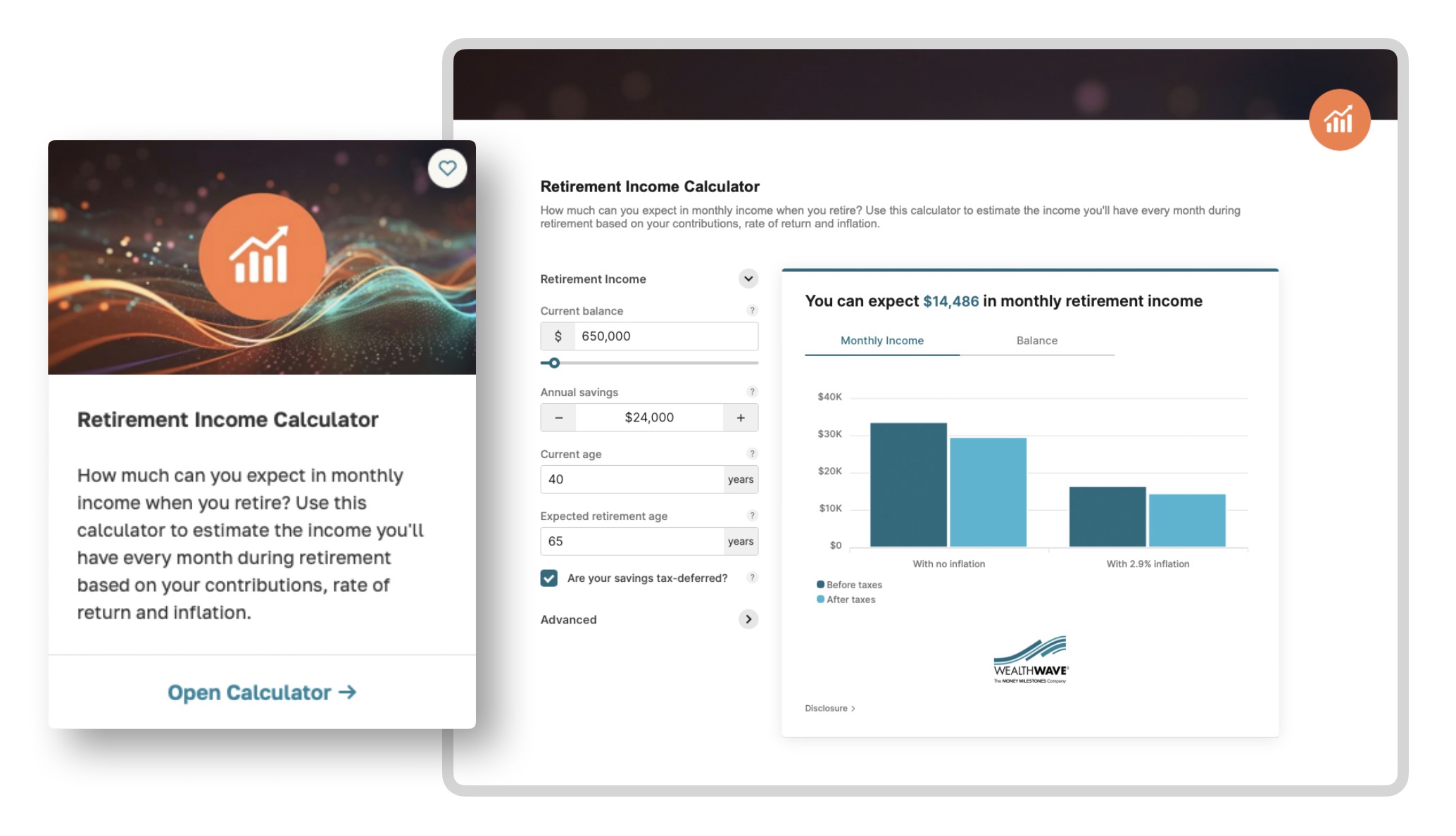
Should you envision a retirement commencing at 65, this tool becomes essential. Input your present savings, forecasted returns, and monthly contributions, and gain clarity on whether you're genuinely on the path to the retirement you desire. Because, in retirement planning, knowledge isn't just power – it's peace of mind.
Navigating the intricate maze of personal finance can often feel daunting. From managing daily expenses to planning for a future filled with dreams and uncertainties, creating an adaptable and robust roadmap is challenging. A clear path can not only alleviate the overwhelm but can turn financial planning from a chore into an exciting journey of empowerment.
The best-selling TheMoneyBooks series has crystallized this path into seven pivotal money milestones. These milestones are more than just steps; they're transformative shifts that ensure individuals and families survive and thrive in their financial landscapes. As we delve into each milestone, envision them as guiding beacons, illuminating your path to financial mastery and independence.
1. Get a Financial Education
In an age where financial uncertainty looms, arming yourself with knowledge is the first line of defense. Financial education hasn't been a priority in most schools. By diving into one of our TheMoneyBooks, you're giving yourself an invaluable gift: the comprehensive financial education you missed. It serves as a compass, helping navigate the complexities of the monetary world. As the adage goes, knowledge is power – and with these books, you're taking the first vital step to control and optimize your financial destiny.
2. Secure Proper Protection
Life is unpredictable, filled with both exhilarating highs and unforeseen challenges. Securing proper protection through life insurance isn't just a checkbox task; it's a testament to your foresight and care for your loved ones. It ensures that they remain financially shielded against life's curveballs. By investing in life insurance, you're sending a clear message: come what may, the financial well-being of my loved ones is non-negotiable.
3. Create an Emergency Fund
An emergency fund isn't merely a financial buffer; it's the anchor that keeps your financial ship steady during turbulent times. Whether unforeseen medical expenses, sudden job loss, or unexpected repairs, this fund ensures that life's hiccups don't derail your financial journey.
It allows you to face challenges head-on without compromising your long-term financial vision. Your fixed expenses (think mortgage, utilities, groceries) aren't going to pay themselves. Lauren Fairey says,
“Having three months of cash reserve is non-negotiable. It's your safety net against life's curveballs.”
And why three months? Turns out, that's the average time a 40-something needs to score a new gig. As you age, this buffer needs to increase, so by 50, target a six-month reserve.
Your emergency fund is sacred, but life's also for a living! By 40, aim to set aside a cool $5,000 (or more!) for those 'treat yourself' moments. As Lauren says,
“Think of this as the adult version of your childhood piggy bank, but instead of candies, you're splurging on that Parisian getaway or a sleek kitchen makeover.”
4. Apply Debt Management
Debts can be like shackles, holding you back from achieving your financial dreams. However, with strategic debt management, these chains can be broken. It's about understanding, strategizing, and methodically eliminating debt, freeing up resources to fuel your dreams. By managing your debts effectively, you're paving a smoother, more straightforward path to financial prosperity.
5. Increase Cash Flow
Financial growth is not just about saving; it's about expanding your income streams. Actively seeking opportunities to increase your cash flow transforms your financial landscape, opening doors to new investments, opportunities, and financial milestones. With more cash flowing in, you're better positioned to make decisions that align with your present needs and future aspirations.
6. Build Your Wealth
Saving is the beginning; wealth building is the masterstroke. This milestone is all about making your money work for you. Through savvy investing, intelligent financial decisions, and leveraging opportunities, you're not just accumulating wealth but ensuring it can grow, multiply, and create a legacy. It's about transitioning from being a passive saver to an active wealth builder.
7. Protect Your Wealth
Building wealth is commendable, but ensuring it's protected and seamlessly passed on is where true financial mastery lies. Estate planning is the guardian of your financial legacy. It ensures that your hard-earned assets are distributed according to your wishes, safeguarding your loved ones and preserving your financial vision even if you're not around.
These seven milestones offer a holistic blueprint for any individual or family seeking a robust financial future. With these as your guiding principles, the road to financial mastery becomes clear, achievable, and truly empowering. Christa challenges us,
“Planning for your financial future is not about restriction, but about empowering yourself to live fully today and tomorrow!”
So, gear up, take charge, and let's make the journey to 40 and beyond a financially fabulous one!
Setting the Stage for Future Success
Now that we've unlocked the crucial seven money milestones, it's not just about setting these goals but actively working towards them with enthusiasm and determination. Achieving these milestones doesn't happen overnight. It's a marathon, not a sprint, so prepare for a journey full of learning, adapting, and growing. Lauren wisely explains,
“Financial freedom isn't just about accumulating wealth. It's about creating opportunities, having peace of mind, and affording the lifestyle you've always envisioned for yourself and your family.”
Every dollar saved and invested is a step closer to building a financial fortress that allows you to live boldly and confidently.
Furthermore, remember that these milestones aren't set in stone. Life is dynamic, with its fair share of twists and turns. Periodically review and adjust your financial plan to align with your evolving lifestyle, goals, and dreams. As your income grows and your responsibilities change, your approach to money should also mature and develop.
“Your financial plan should be a living, breathing entity that grows and evolves with you. It should be your compass, guiding you through the financial wilderness towards a destination of financial stability and independence,”
advises Christa. Let these milestones be your North Star, illuminating the path towards a stable, secure, and enjoyable life in retirement.
Call to Action
Eager to champion your finances? The ideal time is now! Seize the moment and strategically position yourself for a cascade of financial success. Whether you're a blank canvas just beginning your financial journey or you've already painted a few strokes, let those seven milestones illuminate your pathway. And remember, when you're young, time isn't just on your side — it's your greatest asset. Leverage it!
Don't leave your golden years to chance. Utilize a retirement income calculator to ensure your financial strategy aligns seamlessly with your future aspirations. You can gauge whether you're on track to meet or exceed your retirement dreams by inputting your savings details and anticipated contributions. Planning today brings peace of mind for tomorrow; let the calculator guide you toward a fulfilling retirement.
Engage with financial educators like Lauren and Christa, immerse yourself in financial websites like howmoneyworks.com, and join communities of like-minded individuals navigating their financial journeys. With determination, discipline, and the proper knowledge, the vision of your financially secure future is not just a dream but an achievable reality.
Remember, knowledge is your superpower in personal finance, and action is your ally… especially if you're under 40. So, empower yourself, embrace the challenge, and let's secure a future that's not just financially sound but downright thrilling!
Redefining Wealth

It's Not Just About the Money
In an era characterized by financial aspirations, a new understanding of wealth emerges from America's heartland. Schwab’s seventh annual Modern Wealth Survey, which meticulously dissected the thoughts of Americans about money and affluence, showcased an intriguing twist to the common narrative of wealth.
While many might conjure images of sprawling mansions and hefty bank statements when thinking of affluence, a significant portion of Americans have a more profound, heartfelt interpretation. For them, the genuine essence of wealth isn't measured solely in dollars and cents.
Surveyed individuals were posed with the challenge of quantifying the monetary value equated with being "wealthy" in America. The collective consensus settled around an average of $2.2 million. Yet, a remarkable observation was that nearly half of the surveyed Americans, who self-proclaimed they felt wealthy, had an average net worth of $560,000. This is merely a fraction of the average amount. So, what gives?
Diving deeper, it becomes clear that for many, non-financial assets like health, family, and emotional well-being carry more weight in defining wealth than the zeros in one's bank account. Over 62% of respondents believe that nurturing healthy relationships defines wealth more accurately than amassing large sums of money. An even more heartwarming statistic reveals that seven in 10 Americans believe wealth is fundamentally about being free from financial stress rather than hoarding more money.
Expressing their sentiments about wealth, Americans, especially the older generation, prioritize well-being and experiences over monetary accumulation. For them, the richness of life isn't encapsulated by materialistic pursuits but rather by meaningful experiences, relationships, and peace of mind.
Yet, even in this redefined landscape of wealth, the survey found that planning for financial goals remains an afterthought for many. Only about one-third of Americans have actively charted their financial journey. The reasons range from perceived insufficiency of funds to complexity or sheer lack of time.
In this interconnected age, while strong familial ties are the cornerstone of perceived wealth, the world of social media offers a double-edged sword. It's a space where comparisons can easily sow seeds of doubt and insecurity, reshaping perceptions of personal wealth. The ability to live a life on par with peers is a significant determinant of feeling affluent for almost half the surveyed individuals. Social media amplifies this comparison, influencing lifestyle choices, financial decisions, and investment strategies, especially among younger Americans.
To navigate these complex feelings and decisions about wealth, a new wave of financial educators is rising to provide tools and content to address financial queries and empower individuals to make informed choices.
As America strides forward, the nation's heartbeat echoes a new mantra: Wealth isn't just about money; it's about life's riches that money can't buy. Whether it's the warmth of family gatherings, the joy of memorable experiences, or the peace of a stress-free life, the real treasures lie in the intangibles.
"Wealth consists not in having great possessions, but in having few wants.”
- Epictetus
"True wealth is not of the pocket, but of the heart and of the mind.”
- Kevin Gates
“Wealth is the ability to fully experience life.”
- Henry David Thoreau
"The real measure of your wealth is how much you'd be worth if you lost all your money.”
- Anonymous
"Wealth is not about having a lot of money; it's about having a lot of options.”
- Chris Rock
Loud Budgeting

Loud budgeting, a relatively new trend in personal finance, has gained significant popularity through various social media platforms. It involves a movement where individuals openly and publicly share their budgeting experiences, financial goals, and spending habits.
This transparent approach stands in contrast to the traditional method of keeping one's financial matters private. By embracing loud budgeting, individuals not only gain insights and inspiration from others but also foster a sense of accountability and motivation in their financial journeys.
This trend encourages a supportive community where people can learn from each other's successes and setbacks, ultimately leading to improved financial well-being and a more mindful approach to money management. So, whether you're looking to save for a dream vacation, pay off debt, or simply gain a better understanding of your financial habits, loud budgeting can provide the guidance and support you need to achieve your goals.
Here are some key aspects of how loud budgeting works:
1. Public Sharing of Financial Goals and Budgets: Individuals post their financial goals, budgets, and even detailed expense tracking online. This can be done through various social media platforms like Instagram, Twitter, or personal blogs. The idea is to be as transparent as possible about one's financial situation.
2. Accountability and Community Support: By sharing their financial journey publicly, people seek accountability and support from their online community. Followers might offer encouragement, share tips, or even hold the individual accountable for their financial decisions.
3. Educational Aspect: Many who participate in loud budgeting also aim to educate others. They share financial tips, tricks, and sometimes even mistakes they've made, turning their personal finance journey into learning opportunities for others.
4. Real-time Updates: Unlike traditional methods where budgeting is a private and sometimes infrequent activity, loud budgeting often involves regular, even real-time, updates about spending, savings, and financial challenges.
5. Use of Digital Tools and Apps: Participants often use budgeting apps, spreadsheets, or other digital tools to track their finances, which they then share screenshots or summaries of on social media.
6. Inclusivity and Diversity: Loud budgeting has opened the door to diverse voices in the field of personal finance. People from various socio-economic backgrounds share their unique perspectives and challenges, making financial discussions more inclusive.
Examples of Loud Budgeting:
1. Instagram Stories: An individual might use Instagram Stories to share their weekly or monthly budget, including breakdowns of expenses, savings, and financial goals.
2. Twitter Threads: Someone could create a thread documenting their journey toward a specific financial goal, such as paying off debt or saving for a house, including the ups and downs along the way.
3. YouTube Vlogs: Personal finance vloggers might create detailed videos explaining their budgeting techniques, showing how they allocate funds each month, and discussing how they adjust their spending habits.
4. TikTok Challenges: Short-form videos on TikTok where users participate in savings challenges, showcasing their progress and encouraging others to join.
5. Blogging: Detailed blog posts that include monthly financial reports, reflections on spending habits, and lessons learned about personal finance.
Loud budgeting has become a rapidly growing movement in personal finance. With the advent of social media, people now have the power to create a more open and supportive financial culture like never before. This shift in mindset not only encourages accountability and responsible spending, but also fosters a deep sense of solidarity as people from all walks of life come together to share their experiences, offer valuable tips, and overcome common challenges in managing their finances.
Through collaboration, people can forge a resilient, economically empowered community that uplifts and fosters mutual support on the journey toward financial success. Together, we can make financial well-being a tangible reality for everyone!
Kim Scouller
Navigating the Complexities of Social Security in 2024

The Information You Need
As we step into 2024, understanding the intricacies of Social Security becomes increasingly essential, especially for those nearing retirement. This vital program, often the cornerstone of retirement planning, demands strategic decision-making to maximize its benefits.
According to a study by the Social Security Administration, approximately 61% of retired individuals rely on Social Security for at least half of their retirement income. This underscores the significance of this program for many retirees in the United States, serving as a primary source of income during their golden years.
But how does Social Security actually work? And what factors determine the amount of benefits that an individual receives?
As mentioned, Social Security provides retirement income for millions of Americans. But it also serves as a safety net for people with disabilities and for surviving spouses and children. The program is funded through payroll taxes, which are withheld from workers' paychecks throughout their careers.
Bernie Sanders emphasized the value of Social Security, calling it “the most important and valuable social program in the history of the United States.”
Early Application: A Strategic Move
Initiating your Social Security retirement benefits requires a proactive approach. You are eligible to apply up to four months before your intended start date. However, timing is crucial. While you can commence receiving benefits as early as 62, each year you delay (up until 70) significantly increases your monthly payout.
Critical Considerations: When to Start Your Benefits
The decision of when to start receiving Social Security should not be taken lightly. If you opt to receive benefits at 62, you'll face a reduction compared to waiting until the full retirement age (FRA) of 67. Patience pays off; delaying benefits past your FRA can increase your monthly amount until you turn 70.
Payment Schedule: Understanding the Lag
Social Security operates on a delayed payment system. Benefits for any given month are paid in the following month. For instance, September's benefits will be disbursed in October. Your birthday significantly influences your payment schedule:
- 1st-10th of the month: Benefits arrive on the second Wednesday of the following month.
- 11th-20th of the month: Expect your benefits on the third Wednesday of the following month.
- 21st-31st of the month: Benefits are paid on the fourth Wednesday of the following month.
Application Process: A Step-by-Step Guide
Applying for Social Security is a straightforward process, primarily conducted online at ssa.gov. The website offers various applications, encompassing retirement, spousal, disability (SSDI), and Medicare benefits. Alternatively, you can call 800-772-1213 or visit a local office. To expedite the process and reduce wait times, scheduling an appointment is recommended.
Required Documentation: Preparing for Your Application
A successful application necessitates a comprehensive collection of personal and professional information, including:
- Personal details: Birth information, Social Security number, citizenship status, and proofs of birth and U.S. citizenship/work authorization.
- Spouse and children's information: Names, Social Security numbers, birthdates, marriage/divorce/death details.
- Previous Social Security applications, bank account details for benefit deposit, and intended start date for benefits.
- Employment information: Employer details, earnings, W-2 forms or self-employment tax returns, Social Security statement or earnings record, and special work or benefits history.
Which Claiming Age is the Best?
In-depth research conducted by United Income, a prominent online investment management firm, has shed light on the critical question: When is the best age to claim Social Security benefits for maximum lifetime income? This question, crucial for future retirees, intertwines factors like health, marital status, and financial needs, making the decision complex and uncertain.
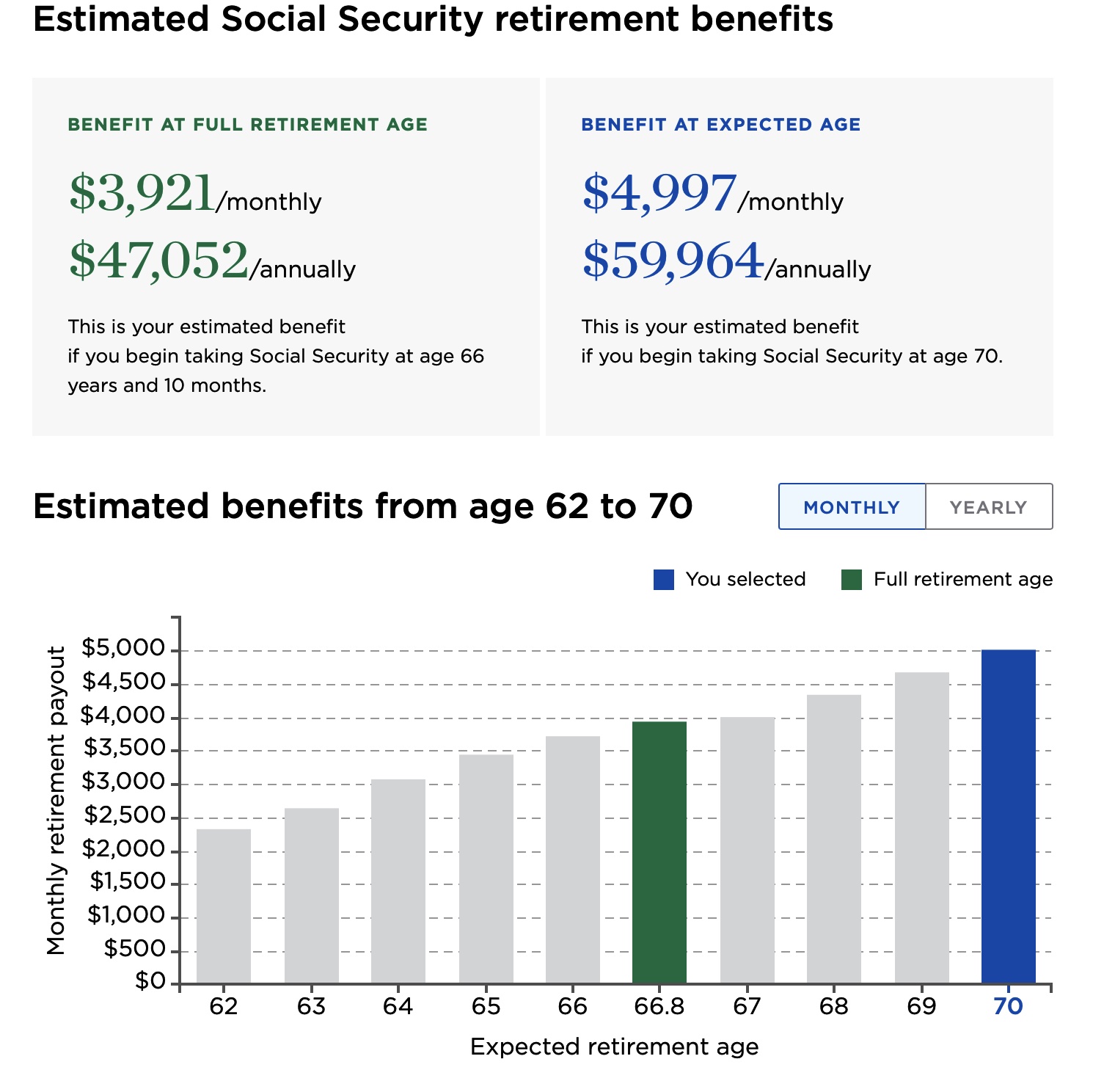
United Income's groundbreaking study, titled "The Retirement Solution Hiding in Plain Sight," delved into the Social Security claim records of 20,000 retired workers. These records, sourced from the University of Michigan's Health and Retirement Study, date back to 2019. The findings reveal a striking contrast between the common practice of early claims and the actual age that yields the highest lifetime benefits.
The analysis uncovered that only a mere 8% of those who claimed their Social Security benefits between the ages of 62 and 64 made the optimal decision in terms of maximizing lifetime income. On the other hand, a substantial 57% of retirees would have benefited most by waiting until the age of 70 to claim their benefits. While claiming at age 66 does offer a better outcome than claiming at 62, it's still surpassed by the benefits accrued from waiting until ages 67 through 70.
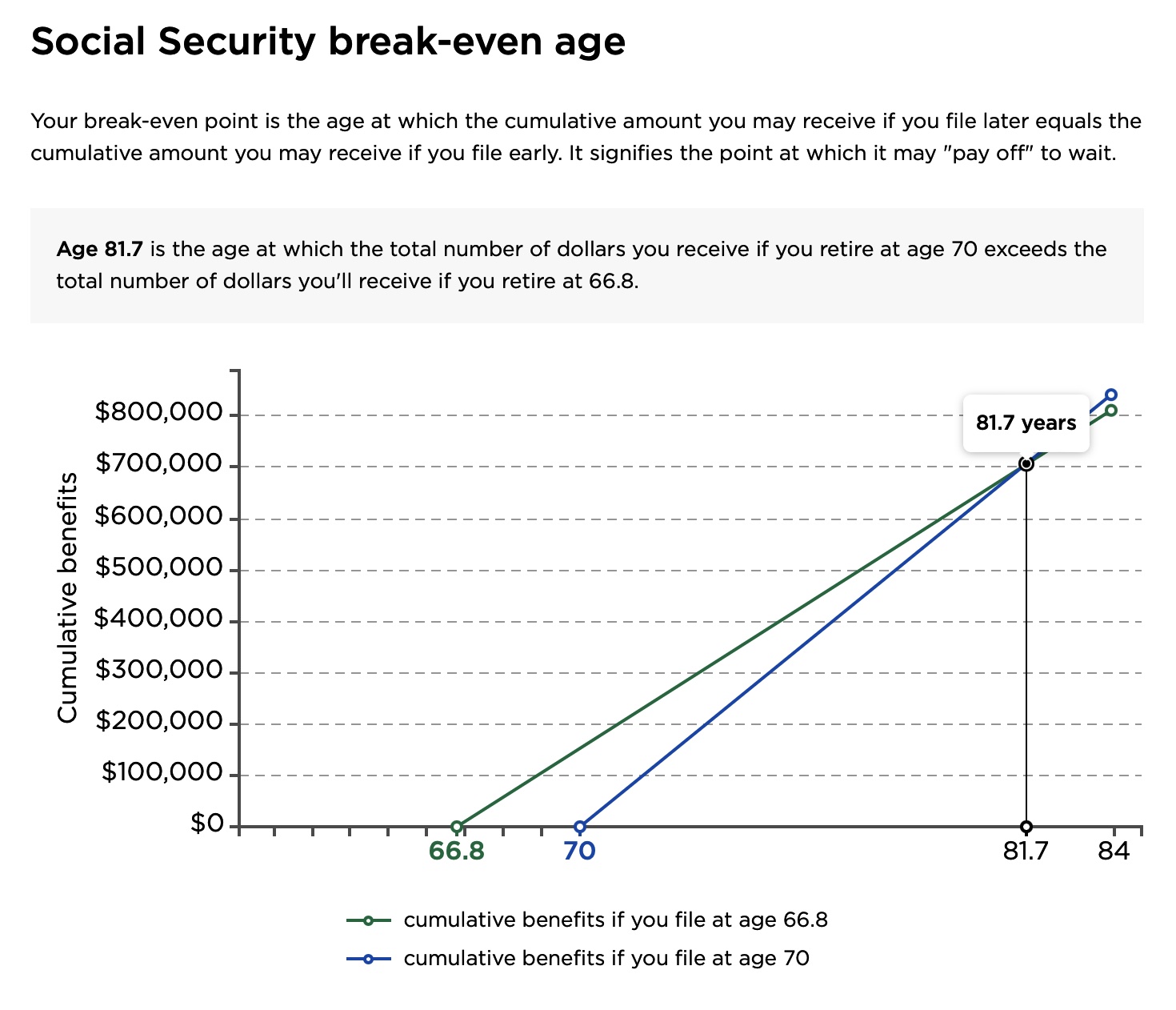
It's important to note, however, that this study does not dismiss the validity of early claims in certain scenarios. Individuals facing chronic health issues potentially reducing their life expectancy may find that claiming benefits early could result in higher overall income. Nevertheless, the overarching message from United Income's comprehensive research is clear: For the majority of future retirees, patience can be a strategic asset in maximizing their lifetime Social Security benefits.
2024 Social Security Updates: What to Expect
Social Security is a dynamic program continually evolving to serve its beneficiaries better. Key changes for 2024 include:
- Cost-of-Living Adjustment (COLA): Beneficiaries will receive a 3.2% COLA, enhancing monthly payouts to counter inflation.
- Varied Full Retirement Ages: Individuals born in 1957 and 1958 will experience different FRAs, impacting when full benefits can be accessed.
- Increased Maximum Benefits: The maximum benefit for high-income earners retiring in 2024 has risen, reflecting recent inflation trends.
- Higher Payroll Taxes for Top Earners: The wage base for Social Security payroll taxes has increased, affecting high-earning employees and self-employed individuals.
Empower Your Retirement: Staying Informed
Maximizing your Social Security benefits requires staying informed and making strategic decisions. Regularly monitoring your Social Security status and understanding annual changes are crucial steps in ensuring you receive the full financial support the program aims to provide. As 2024 unfolds, let this be your guide to navigating Social Security with confidence and clarity.
The Rule of 72

Unlock the Power of Compounding
In the world of personal finance, understanding the power of compound interest is crucial for making informed decisions. One valuable tool for grasping its implications is the Rule of 72, which offers a brilliantly simple way to estimate the time it takes for an investment to double. But did you know that this rule is equally insightful when considering the impact of borrowing?
Let's dive deeper into how the Rule of 72 can work both for you and against you, using real-world data as of December 2023. By exploring concrete examples and scenarios, we can gain a clearer understanding of the potential long-term effects on your financial goals. So buckle up as we delve into the details and uncover the fascinating dynamics of this mental math shortcut, The Rule of 72!
How the Rule of 72 Works
The Rule of 72, a simple and useful formula, provides an estimate of the time required for an investment to double. By dividing the number 72 by the annual rate of return or interest rate, you can obtain an approximate number of years it will take for your investment to double its initial value.
This rule is commonly employed by consumers as a quick assessment tool to evaluate the potential growth of their investments and make informed decisions about their financial goals.
By understanding the Rule of 72, you can better strategize and plan your investment portfolios, considering factors such as risk tolerance, time horizon, and desired returns.
When You Save: A Slow Climb
The national average Annual Percentage Yield (APY) for savings accounts currently stands at 0.57%1 as of December 2023. This means that for every $1,000 you save, you could expect to earn approximately $5.70 in interest over the course of a year.
Using the Rule of 72, which states that you can estimate the number of years it takes for your money to double by dividing 72 by the interest rate, we can see that it would take around 126 years for your savings to double at this rate.

This calculation unveils a stark reality: at the current rate of growth, it would take a staggering 126 years for your savings to double. This emphasizes the slow and sluggish nature of money's growth in traditional savings accounts, further underscoring the urgent need for more effective investment strategies.
The Impact of Low-Interest Rates
Now, let's contrast these figures with the reality of many traditional banks. Despite the national average for savings account APY being 0.57%, a significant number of bigger banks are offering meager interest rates as low as 0.01%.5
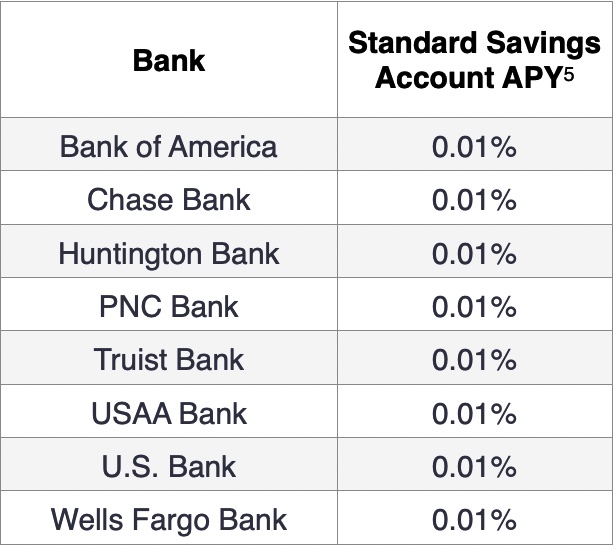
Applying the Rule of 72, this would theoretically require an astonishing 7,200 years for the amount to double. It's a sobering reminder of the importance of carefully considering where and how you decide to save and invest your money.
82% Overlook The Opportunity for Growing Wealth
As you can see, it’s not uncommon for bigger banks to offer lower savings account rates, as they have less need to attract new customers for deposit accounts. To truly outpace inflation and achieve substantial wealth accumulation over time, it’s crucial to explore alternative investment avenues that offer higher returns and greater financial opportunities.5
When it comes to saving money, many Americans are missing out on a fantastic opportunity to grow their savings with minimal risk. High-yield savings accounts can offer attractive interest rates, currently exceeding 5%, which is almost 10x higher than the national average for traditional savings accounts. Shockingly, a recent CNBC Select and Dynata Banking Behaviors Survey3 revealed that a staggering 82% of the population does not take advantage of these accounts.
The significance of this is clear - countless Americans are unknowingly forfeiting the chance to earn free money. Consider this: according to the Federal Reserve4, the average American family holds approximately $8,000 across various bank accounts, including checking and savings. If this amount were to earn the current average 0.57% APY in a traditional savings account, the total interest earned in a year would be a meager $46. Of course, this is far superior to the meager $0.80 you would have earned from one of the banks offering a negligible 0.01% APY. Conversely, if the same amount were deposited into a high-yield savings account earning 5.0% APY, the interest earned would exceed $400 for the same timeframe.
It is evident that by neglecting high-yield savings accounts, Americans can miss out on a significant opportunity to maximize their savings and make their money work harder for them.5
When You Borrow: A Fast Descent
The national average Annual Percentage Rate (APR) for new credit cards currently stands at a staggering 24.56%2 as of December 2023. This means that for every $1,000 balance you keep, you can expect to pay approximately $246 in interest over the course of a year.
Taking into account factors such as interest charges and fees, the APR provides a comprehensive understanding of the financial implications associated with credit card usage. By gaining a deeper insight into this significant metric, you can make more informed decisions when it comes to managing your finances and choosing the most suitable credit card options.

In less than three years, the amount you owe could double, compounding the urgency and illustrating the alarming speed at which debt can grow. This serves as a critical reminder of the perils of high-interest debt, emphasizing the importance of managing credit responsibly and taking proactive steps to mitigate its impact on financial well-being.
By adopting sound financial practices, such as budgeting, saving, and making timely payments, Americans can safeguard themselves against the detrimental effects of mounting debt and pave the way for a more secure and stable future.5
A Tale of Two Candies: Dum-Dums and Smarties
Banks often go the extra mile to offer small tokens of appreciation to their customers, such as delicious candies. Interestingly, one common choice that catches the eye is Dum-Dums lollipops. At first glance, it might seem like a simple and innocent gesture, but if we delve deeper, we can uncover a subtle metaphor that reflects the financial choices we encounter in our lives.

What's intriguing is that Dum-Dums are manufactured by the same company, Spangler, that produces another popular candy, Smarties. This stark contrast between the two candies serves as a powerful symbol, representing the decisions we make when it comes to our finances.
On the one hand, Dum-Dums represent the allure of financial complacency, where we may be tempted to make unwise choices without considering the long-term implications. On the other hand, Smarties embody the essence of smart and informed financial decisions, highlighting the importance of making choices that align with our goals and aspirations.
By offering these seemingly insignificant candies, banks remind us of the profound impact our financial decisions can have on our lives. It encourages us to reflect on the choices we make and strive to be more conscious and intentional in our financial journey.
For Savers: Seek Better Returns
Given the historically dismal returns on traditional savings accounts, it's crucial for consumers to explore other investment avenues that have the potential to generate higher returns over the long term.5 One such avenue to consider is low-cost index funds, which are designed to track the performance of a specific market index and offer diversification benefits.5
Additionally, investing in individual stocks or bonds can provide opportunities for higher returns, although they may come with higher risks.5 By diversifying your investment portfolio across different asset classes, you can increase your chances of achieving your financial goals and building long-term wealth.5
For Borrowers: Manage and Reduce Debt
If you carry high-interest debt, especially on credit cards, it is crucial to prioritize paying it off as soon as possible. One effective strategy to consider is debt consolidation, which involves combining multiple debts into a single loan with a lower interest rate.5
Another option is transferring balances to lower-rate cards, which can help reduce the overall interest charges and make it easier to pay off the debt faster. By taking these proactive steps, you can regain financial control and save money in the long run.5
Educate and Empower Yourself
Knowledge is a powerful asset that can greatly impact your financial decisions. By familiarizing yourself with tools like the Rule of 72, you gain a deeper understanding of how money works and can make smarter choices. It's important to seek financial education and advice to further enhance your financial literacy.
Remember, whether you choose the path of the Dum-Dums (those who lack financial knowledge) or the Smarties (those who make informed decisions), the choice is ultimately yours to shape your financial future.
The Rule of 72 is more than just a mathematical shortcut; it's a powerful tool that provides valuable insights into your financial decisions. By comprehending the dynamics of how money can either work for you or against you, you gain the ability to take control of your financial future.
With this knowledge, you can make informed choices that pave the way for prosperity and ultimately lead to lasting financial freedom. So, embrace the Rule of 72 as a guiding lens, empowering you to navigate the intricacies of personal finance with confidence and success.
- Average Savings Account Rate 12/13/2023: https://www.bankrate.com/banking/savings/average-savings-interest-rates/
- Average New Credit Card Rate 12/13/2023: https://www.lendingtree.com/credit-cards/average-credit-card-interest-rate-in-america/
- CNBC Savings Article https://www.cnbc.com/select/americans-not-using-high-yield-savings-accounts/
- Federal Reserve Survey of Consumer Finances: https://www.federalreserve.gov/econres/scfindex.htm
- The information provided is for educational and informational purposes only and should not be construed as financial advice. The discussion about the impact of low savings account interest rates and the opportunities for growing wealth through alternative investment avenues, including high-yield savings accounts, and high credit cards rates, reflects general market trends and data available 12/13/2023. Individual financial situations and goals may vary, and it's crucial to consult with a qualified financial professional before making any savings, investment or credit decisions. The examples and data cited, including interest rates and survey results, are illustrative and may not represent current market conditions. Readers should conduct their own research and consider their financial circumstances and risk tolerance before investing.
Financial Empowerment for Women
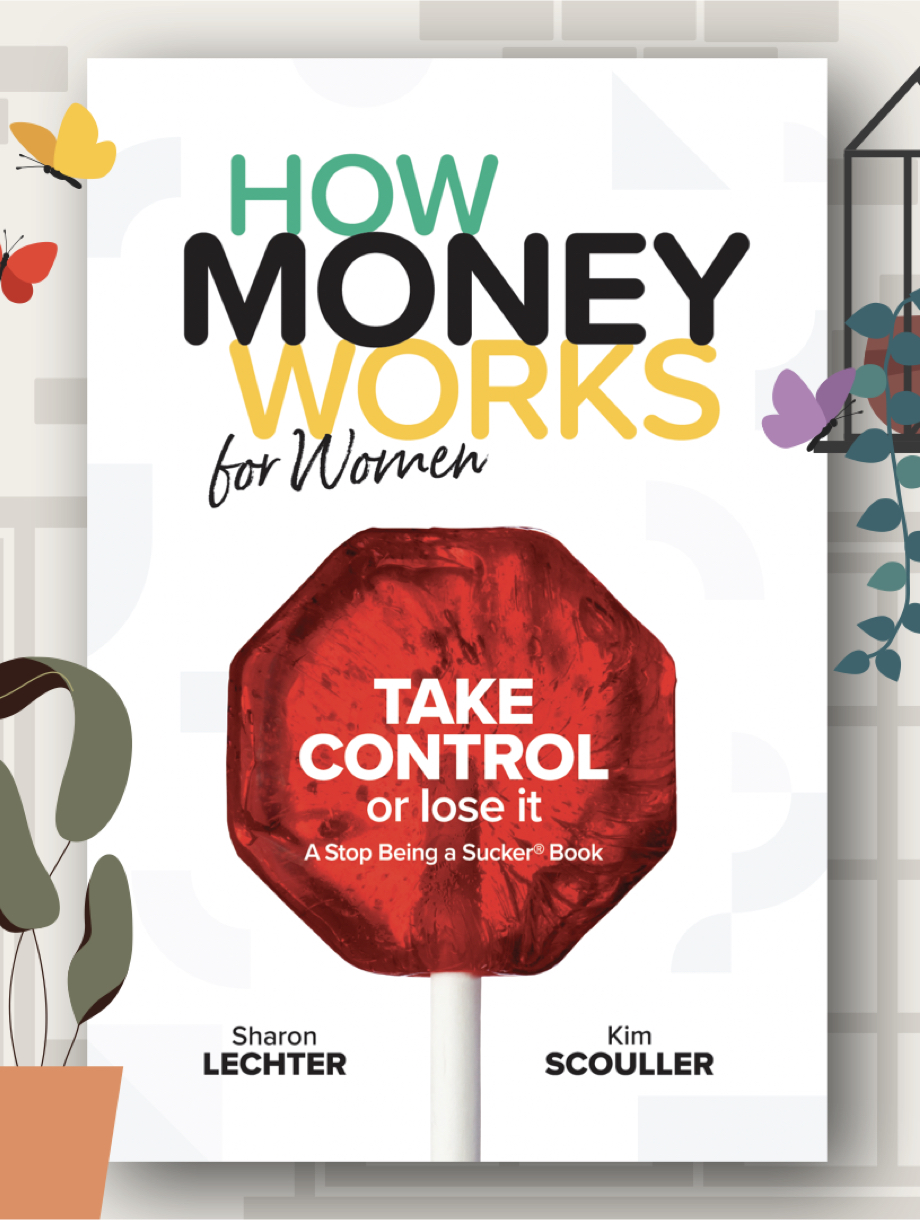
Insights from Kim Scouller
Attorney and Certified Financial Educator Kim Scouller, celebrated for her new book How Money Works for Women, was recently interviewed on the global health and wellness show Bloom on NBC Tampa. Hosted by Gayle Guyardo, the episode provided a platform for Kim, a stalwart Women’s Financial Advocate, to shed light on the inspirations behind her literary piece.
During her engaging chat with Gayle, Kim imparted valuable financial wisdom tailored to women. Here's a glimpse of the financial empowerment she advocated:
Break the Silence on Money
Traditionally, discussions about money have remained muted amongst women. To foster change, it's essential that women, more than anyone, discuss financial matters with family, friends, and fellow women. Let's shift money talk from a hush-hush topic to an open conversation.
Grasp Your Financial Reality
Understanding one’s financial situation is paramount. Every woman must be aware of her cash flow, assets, insurance, and debts. Acquiring a holistic view of your finances helps in recognizing areas of strengths and opportunities for improvement. It's all about being proactive and being in the driver’s seat of your financial journey.
Chart Your Financial Journey
Carve out your own savings and spending plans aligned with your financial aspirations. To amplify your financial health, introspect: How can I augment my income? How do I transcend the paycheck-to-paycheck life? What's my strategy to curtail unwanted debt? Do my savings suffice for retirement? What's my investment capacity right now?
Dive into Fundamental Financial Concepts
Many might be oblivious to financial terminologies such as Compound Interest, The Time Value of Money, or The Rule of 72. Yet, these are foundational concepts that can magnify your financial growth. Hence, it's vital for women to familiarize themselves with the mechanics of money.
Forge Alliances with Financial Experts
Engaging with a financial expert isn't a luxury limited to the affluent. It’s a necessity for all. Seek a trustworthy financial professional who can offer insights specific to your financial scenario. Such collaborations can pave the way for a robust financial future tailored to your individual needs.
Kim's appearance on NBC Tampa and Bloom not only highlighted the essence of her book but also reiterated the importance of financial literacy amongst women. As women move forward, let her insights be a beacon for them to achieve financial autonomy and security.
The Power of Financial Education

In today's rapidly changing and complex economic landscape, the importance of financial education cannot be overstated.
Only 23 States offer courses in high school that could start the process. Financial literacy, the understanding of basic financial concepts and the ability to make informed decisions about money, is a fundamental skill that can pave the way to success and prosperity. From managing personal finances to making investment decisions, a solid foundation in financial education is crucial for individuals to navigate the intricate world of money effectively.
The Financial Literacy Gap
One of the pressing challenges facing many people is the financial literacy gap. A significant portion of the population lacks the knowledge and skills required to make sound financial decisions. This gap can lead to dire consequences, including high levels of debt, poor retirement planning, and limited access to wealth-building opportunities. Without a proper understanding of financial principles, individuals may fall victim to predatory lending, make uninformed investment choices, and struggle with long-term financial stability.
Empowering Decision-Making
Financial education empowers individuals to take control of their financial destinies. By providing the knowledge needed to manage budgets, create savings plans, and understand the implications of different types of debt, people can make informed decisions that align with their long-term goals. This level of empowerment reduces financial stress, enhances financial well-being, and opens doors to opportunities that might otherwise be out of reach.
The Benefits of Early Education
Introducing financial education at an early age is particularly impactful. When children and young adults learn about the importance of saving, investing, and budgeting from an early stage, they develop healthy financial habits that can last a lifetime. Understanding the value of money, the power of compounding, and the risks and rewards of different financial choices gives young people a head start in building a secure financial future.
Navigating the Complex World of Investments
Investing is a cornerstone of building wealth, but it can be daunting for those without a solid financial education. Understanding the basics of stocks, bonds, mutual funds, and other investment vehicles is crucial to making informed choices that align with individual risk tolerance and financial goals. Without this knowledge, individuals might be susceptible to fraudulent schemes or might miss out on opportunities for growth.
Adapting to Changing Times
The financial landscape is continually evolving, with new technologies, investment options and economic trends emerging regularly. Without a foundation in financial education, individuals can struggle to keep up with these changes and make well-informed decisions. Financial education not only imparts timeless principles but can also teach individuals how to adapt and thrive in a rapidly changing financial environment.
Bridging the Gap with Financial Education
Families, companies, educational institutions, and communities can all play vital roles in bridging the financial literacy gap. Integrating financial education into daily life at home or work and school curricula growing up can foster a culture of open conversations about money and collectively elevate financial literacy rates.
Individuals themselves also have a role to play. Taking the initiative to seek out financial education resources, reading books like HowMoneyWorks: Stop Being a Sucker and HowMoneyWorks for Women: Take Control or Lose It, attending classes, and working with a financial professional can all contribute to one's personal growth in financial literacy.
In a world where financial decisions have a profound impact on our lives, the need for financial education cannot be overstated. Empowering individuals with the knowledge and skills to make informed decisions about money is a crucial step toward financial success. Whether it's managing personal finances, making informed savings choices, or planning for retirement, a solid foundation in financial education can provide the tools necessary to navigate the complex world of finance with confidence. By investing in your financial education today, you can secure your financial future and pave the way for a life of prosperity and success.
Understanding the Time Value of Money

A Fundamental Financial Concept
When it comes to financial literacy, few principles are as essential and foundational as the time value of money (TVM). It's a concept that serves as the bedrock for many financial decisions, from investments to loans and savings. But what is the time value of money, and why is it so crucial?
What is the Time Value of Money?
At its core, the time value of money posits that the purchasing power of a unit of currency can vary over time. In other words, a dollar today doesn't have the same value as a dollar tomorrow. This principle implies that money's worth is intrinsically tied to time.
Why Does Money Have Time Value?
There are several reasons why money changes value over time:
Opportunity Cost: Money has potential earning capacity. If you have $100 today, you could invest it and earn interest, making your $100 worth more tomorrow. Conversely, if you receive $100 a year from now, you've lost a year's worth of potential earnings on that money.
Inflation: Over time, most economies experience inflation, which means that goods and services gradually increase in cost. As a result, the purchasing power of money decreases. A candy bar that costs $1 today might cost $1.10 next year due to inflation.
Risk and Uncertainty: The future is always uncertain. There's a risk that you might not receive money in the future due to various reasons, such as a borrower defaulting on a loan. Hence, money today is considered more valuable than the promise of the same amount in the future.
Consumption Preferences: Many people prefer immediate gratification over delayed rewards. This preference means that they might value having money today to spend immediately rather than waiting.
Applications of the Time Value of Money
Understanding TVM is crucial for various financial applications:
Investment Decisions: When considering an investment, you'll want to know the future value of your money based on the returns you expect to earn.
Loan Calculations: Lenders charge interest to compensate for the opportunity cost of lending money. TVM helps in determining appropriate interest rates.
Retirement Planning: When planning for retirement, it's vital to consider how much money you'll need in the future, accounting for inflation and expected returns on investments.
Valuation of Businesses: In business valuation, future revenues and costs are discounted back to their present values to provide an accurate valuation.
Key TVM Concepts
Present Value (PV): This refers to today's value of money. It answers the question, "What is the value of future money in today's terms?"
Future Value (FV): This refers to what money today will be worth in the future after earning interest or returns.
Discount Rate: This rate is used to discount future money back to its present value. It represents the interest rate or return rate and can be thought of as the opportunity cost of money.
Delving Deeper Into the Time Value of Money: Its Implications and Real-World Examples
While the foundational understanding of the time value of money (TVM) rests on the idea that the worth of a currency unit varies over time, the implications of this principle permeate vast areas of finance and economics. Let’s delve deeper into the nuances of TVM and examine how it plays a role in everyday life and sophisticated financial scenarios.
Compounding: The Eighth Wonder of the World
Albert Einstein famously said, “Compound interest is the eighth wonder of the world. He who understands it, earns it; he who doesn't, pays it.” Compounding refers to the process by which an investment grows not only based on the principal (the initial amount) but also on the accumulated interest from prior periods.
Example: If you invest $1,000 at an annual interest rate of 5%, you'll have $1,050 after one year. If you keep it invested, you won't just earn 5% on the original $1,000 during the second year; you'll earn it on the full $1,050, leading to even more significant growth.
Discounting: The Reverse of Compounding
Just as compounding allows us to determine the future value of present money, discounting enables us to figure out the present value of future money. This is particularly valuable in scenarios like valuing cash flows expected from an investment in the future.
Real-World Scenarios: TVM in Action
Mortgages and Car Loans: When banks determine monthly payments, they consider the TVM. This is why interest payments are higher at the beginning of a loan term.
Annuities and Pensions: Monthly retirement benefits are calculated based on TVM, ensuring that the sum set aside today will cover future retirement needs.
Lease Agreements: Companies that lease equipment or property will use TVM to determine lease payments, ensuring the lessee pays for both the use of the asset and the lost potential interest.
Project Valuation: Companies use TVM to decide whether to pursue projects. They'll discount future cash flows to determine if they present a positive net present value.
Factors Affecting TVM
Interest Rate Fluctuations: As central banks adjust rates in response to economic conditions, the TVM shifts. For example, in a high-interest environment, the future value of money invested today becomes more significant.
Economic Policies: Governmental fiscal policies can influence inflation and, in turn, the purchasing power of money, affecting its time value.
Global Events: Events like pandemics or geopolitical tensions can lead to economic uncertainties, affecting interest rates and inflation expectations.
Tools for TVM Calculations
In today's digital age, various tools can help individuals and professionals with TVM calculations:
Online Financial Calculators: Online financial calculators stand out as a prime example of modern financial technology tools that cater to both seasoned professionals and financial novices. Designed with user-centric principles, these calculators simplify complex financial computations, enabling users to effortlessly evaluate investment returns, project retirement savings, and assess debt repayment strategies, among other tasks.
Moreover, the integration of real-time data ensures that the calculations are always based on the most current market conditions. Coupled with an intuitive interface and robust data visualization tools, these online calculators not only demystify the numerical aspects of finance but also empower individuals to make informed decisions that align with their financial goals.
Spreadsheet Software: For those who love do-it-yourself, platforms such as Microsoft Excel, Apple Numbers, and Google Sheets have transformed the realm of financial calculations with their built-in functions tailored for computing present and future values, factoring in diverse variables.
These versatile spreadsheet tools are more than just digital canvases for data entry; they enable users to create dynamic financial models, run simulations, and visualize trends. With just a few keystrokes, you can swiftly analyze investment scenarios, compare loan offers, or chart retirement savings trajectories.
Mobile Apps: Numerous finance and investment apps offer the capability to perform TVM calculations on-the-go, significantly aiding in swift and informed decision-making. Many finance professionals lean into the digital age by using the HP 12C Platinum app on their smartphones. The app, a digital replica of the iconic HP 12C calculator, brings the familiarity of classic financial calculations to the palm of your hand.
Final Thoughts
The time value of money is a prism through which myriad financial decisions should be viewed. Its principles are immutable, yet the factors influencing it are dynamic. As we navigate our financial journeys, understanding the interplay of money, time and potential opportunities ensures we remain informed, proactive and prepared for the future.
The time value of money is a fundamental financial concept that underscores many personal and business financial decisions. Whether you're saving for a significant purchase, planning for retirement, or considering an investment opportunity, understanding how money's value changes over time can lead to better, more informed decisions.
Remember: A dollar today isn't just a dollar—it represents potential growth, opportunities, and future security.
Unveiling the Silent Partner in Your Financial Journey
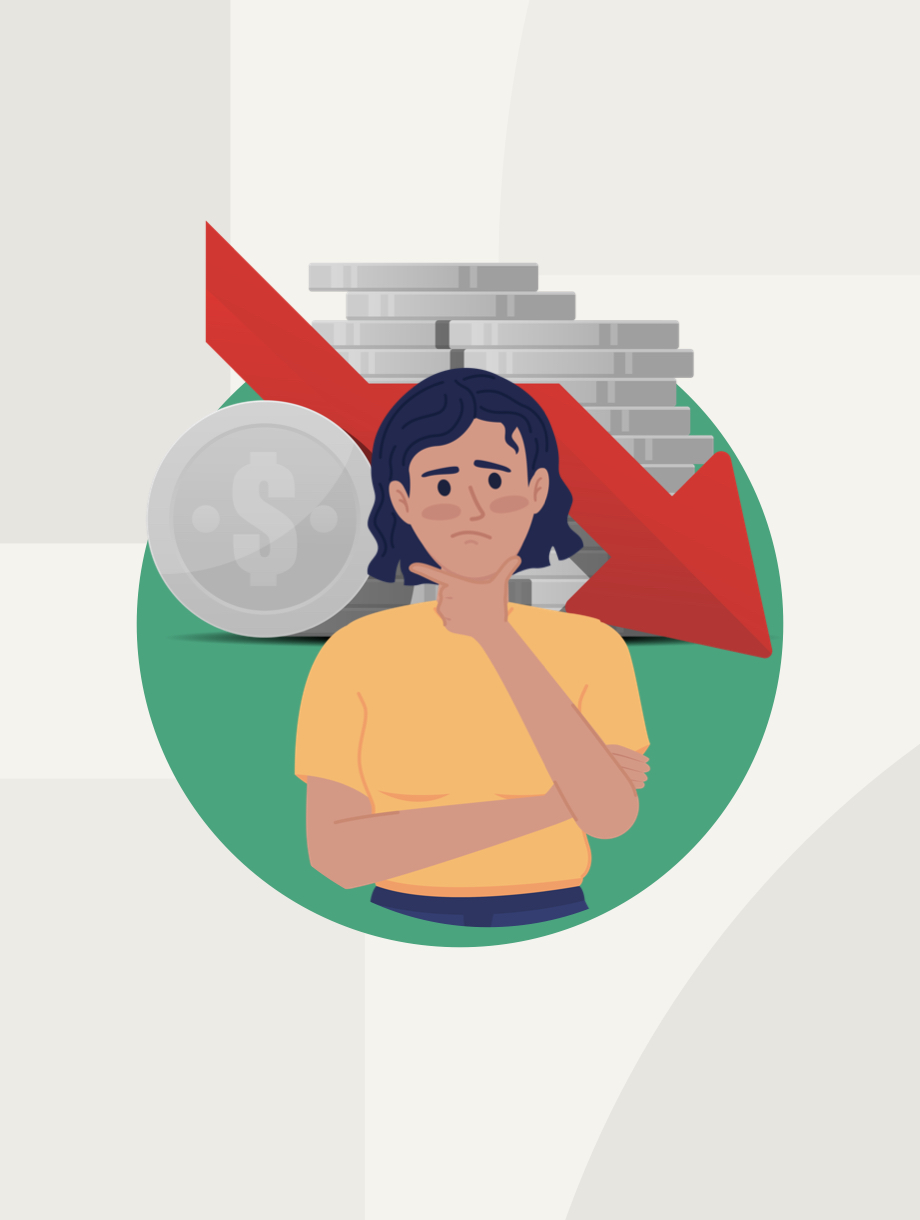
Exploring the Unseen Impact of Inflation on Your Finances
In the world of personal finance, where numerous factors play a crucial role in shaping your financial future, one often overlooked companion stands out: inflation. Inflation, an economic phenomenon characterized by the gradual increase in the prices of goods and services over time, wields a significant influence over the economic landscape.
It can erode the purchasing power of money, affecting everything from the cost of living to investment returns.
Understanding the implications of inflation is paramount for making informed financial decisions and safeguarding your financial well-being in the long run.
Four Decades of Inflation
Over the past 40+ years, inflation rates in the U.S. have exhibited a downward trend with moderate fluctuations. In the early 1980s, the country experienced high inflation, with rates soaring over 13%. This was partly due to the Federal Reserve's effort to quell the rapid inflation of the 1970s. The remainder of the decade witnessed a steady decline, with inflation averaging around 4% by the late 1980s.
Moving into the 1990s, inflation rates remained relatively stable, hovering around 2-3%. This period of low inflation, coupled with economic expansion, is often referred to as the “Great Moderation.”
The turn of the millennium brought with it the dot-com bubble burst and the 2008 financial crisis, causing temporary spikes in inflation. However, the overall trend remained stable, with inflation rates predominantly in the 1-3% range.
In the 2010s, despite the economic recovery, inflation remained low, even dipping below 1% at times.
As we move through the decade of the 2020s, it’s worth noting that inflation rates have witnessed significant volatility due to the far-reaching economic repercussions triggered by the unprecedented COVID-19 pandemic. The global health crisis has upended economies worldwide, leading to fluctuations in inflation rates as governments and central banks grapple with the challenges of stabilizing their respective economies and supporting businesses and individuals during these uncertain times.
The Impact of Inflation on Your Finances
While low and stable inflation is generally beneficial for economic growth, it can have a significant impact on your personal finances. One of the most significant effects of inflation is its erosion of purchasing power over time. In simpler terms, the same amount of money will buy you less in the future due to rising prices.
For example, let's say you have $10,000 in a savings account earning 2% interest. If the inflation rate is also at 2%, your money will essentially stay the same in purchasing power. However, if inflation increases to 4%, your savings will only be worth around $9,500 in today's dollars after one year.
This is why it is crucial to consider inflation when making financial decisions, such as investment choices and budgeting for the future. It's like a quiet breeze that is constantly present, subtly impacting the economy and affecting the purchasing power of individuals. Understanding the dynamics of inflation and its implications is crucial for making informed financial decisions and planning for the future.
How Inflation Works: A Tale of Two Coffees
Let's illustrate the concept of inflation with a simple story. Imagine, ten years ago, you could walk into your favorite coffee shop and purchase a steaming cup of your beloved coffee for just $2. Fast forward to today, and that same cup of coffee now costs $3.50. This increase in price is a direct result of inflation, which refers to the general rise in prices over time.
Essentially, what inflation means is that the purchasing power of your money decreases as time goes on. In other words, the dollar in your pocket today won't be able to buy you as much as it could a few years down the line. This is why it's important to understand inflation and its impact on our daily lives. By staying informed and making wise financial decisions, we can navigate the ever-changing economic landscape and make the most of our hard-earned money.
Inflation and Your Finances: A Balancing Act
Inflation impacts every aspect of your finances, from savings to investments to debts. If you're saving money, inflation acts as a silent thief, eroding the future value of your savings. For instance, if you stash $10,000 in a box today, it might only have the buying power of $7,000 or less in 10 years, depending on the rate of inflation.
However, it's not all gloomy. Inflation can actually work in favor of those who have long-term fixed-rate debts, such as a mortgage. Here's why: When you lock in a mortgage at a fixed rate, the amount you pay remains constant.
As inflation rises, the real value of what you pay back decreases. This means that over time, you effectively end up paying back less in real terms than what you initially borrowed. So, while inflation may seem like a negative force, it can actually benefit those who have fixed-rate debts in the long run by reducing the real burden of repayment.
The Investment Balancing Act
The key to combating inflation lies in making wise investments. Historically, stocks have proven to be an excellent investment option, offering returns that have consistently outpaced inflation. Additionally, real estate investments can serve as a valuable hedge against inflation.
As property values and rents tend to rise in tandem with inflation, investing in real estate can help preserve the purchasing power of your assets over time. By diversifying your investment portfolio and considering these options, you can effectively protect your wealth from the erosive effects of inflation.
A Cautionary Tale
Consider the story of Emily, who saved $20,000 in her bank account over 20 years ago. She felt secure, believing her nest egg would suffice for her retirement. However, she didn't account for inflation. Now, her $20,000 has the same purchasing power as around $12,000 had two decades ago. Emily's story teaches us the importance of accounting for inflation in our long-term financial planning.
“Inflation is when you pay fifteen dollars for the ten-dollar haircut you used to get for five dollars when you had hair.”
– Sam Ewing
Embracing the Silent Partner
Inflation, the persistent rise in prices over time, is an inescapable and crucial aspect of our financial lives. It has the potential to work against us, eroding the purchasing power of our money. However, by comprehending and planning for inflation, we can mitigate its impact and safeguard the value of our hard-earned money.
Developing financial literacy entails not only acquiring the knowledge of how to generate income but also understanding the strategies to preserve its value in the face of inflationary pressures. By taking proactive steps to account for inflation, we can navigate the ever-changing financial landscape with confidence and resilience.
A Call to Action
Educate yourself about inflation, the gradual increase in prices over time. It's important to understand its impact on your savings and investments. By adjusting your strategies to outpace inflation, you can ensure the growth of your financial portfolio. Embrace inflation as a silent partner, one that challenges you to be proactive, creative, and strategic in your financial journey.
Stay informed about economic trends, explore diverse investment options, and make well-informed decisions to navigate the ever-changing financial landscape. Remember, by staying ahead of inflation, you can protect your purchasing power and achieve long-term financial success.
Thriving in an Inflationary World
While inflation, the gradual increase in prices over time, is an unavoidable companion in our financial journey, it doesn't have to be a formidable foe. By understanding the factors that drive inflation, such as changes in the money supply, demand-pull, and cost-push factors, we can gain a deeper insight into its impacts on our economy.
“Plan for inflation: it's not just a challenge, but an opportunity to grow smarter, stronger, and more resilient in your financial journey. Remember, the best time to plant a tree was 20 years ago. The second best time is now. Start planning, start investing, start defeating the silent partner that is inflation.”
- Tom Mathews
Implementing effective strategies, such as diversifying our investments, hedging against inflation, and adjusting our spending habits, can help us navigate the challenges posed by inflation. By doing so, we not only turn this silent partner into a catalyst for smarter financial planning but also pave the way towards a more secure and resilient financial future.
With careful consideration of investment options, diversification, and staying informed about economic trends, we can navigate the impact of inflation and ensure that our hard-earned money retains its value and grows over time. Remember, being proactive in managing inflation is a key component of long-term financial success.
The best way to compare inflation rates is to use the end-of-year consumer price index (CPI), which creates an image of a specific point in time.
The table below compares the inflation rate (December end-of-year) with the fed funds rate, the phase of the business cycle, and the significant events influencing inflation.
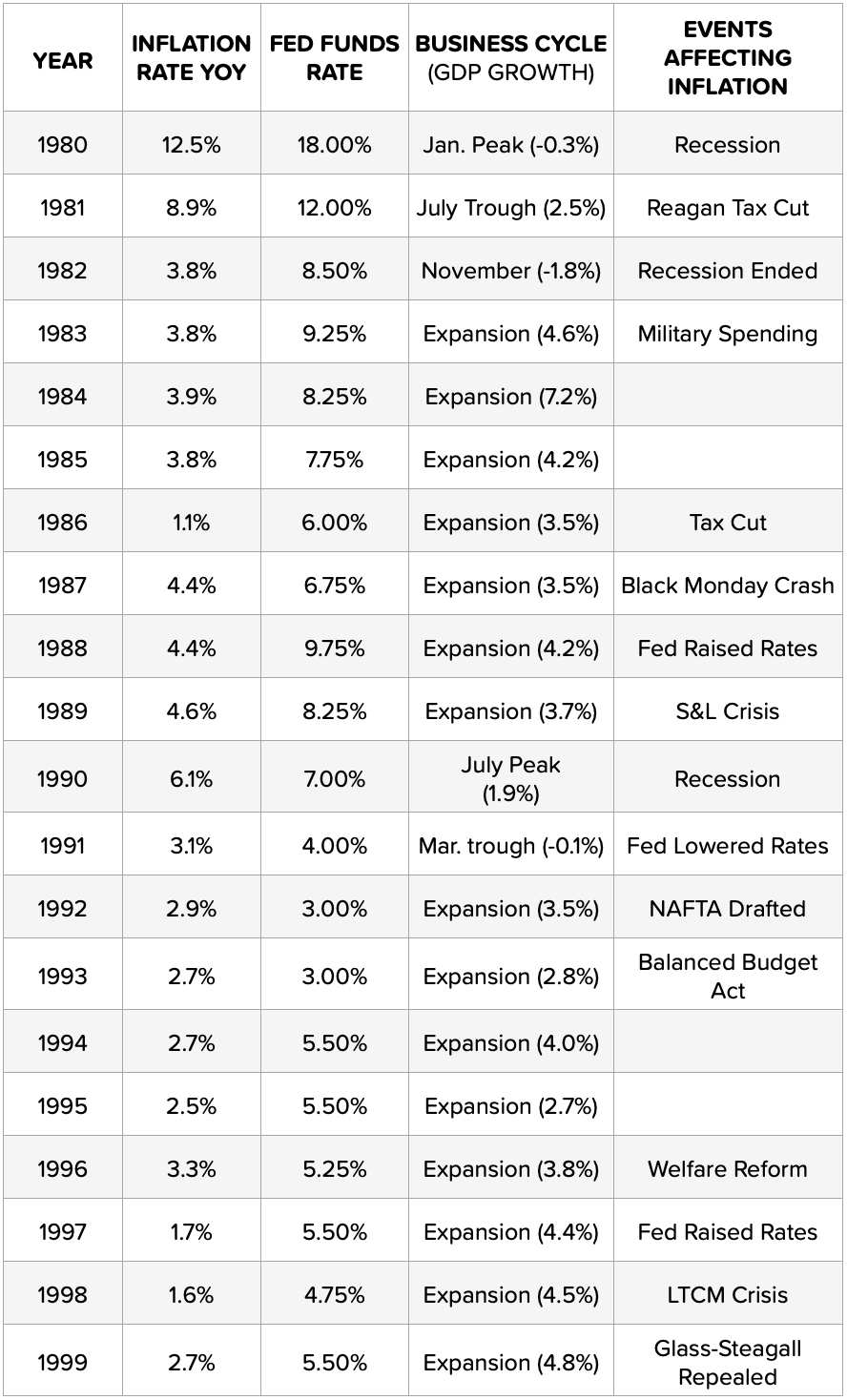
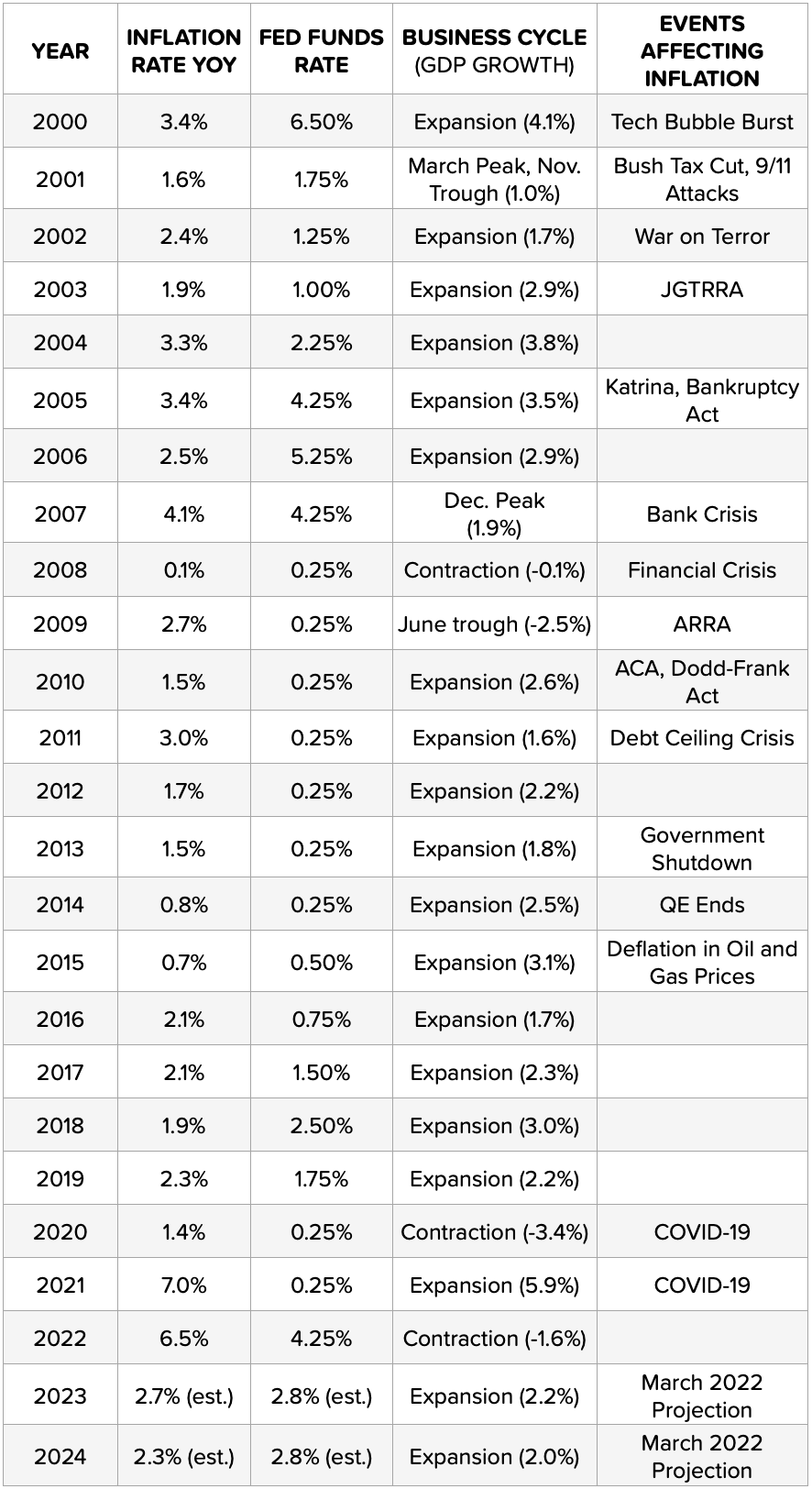
Turning Inflation from Foe to Ally
Inflation is not just an economic concept, but a living, breathing aspect of our financial realities. It's an uninvited guest at every financial decision we make, but understanding and planning for it transforms this potential adversary into a powerful ally.
We cannot control the winds of economic change, but we can adjust our sails. It's time to embrace the challenge. Educate yourself about inflation and its effects. Review and adjust your savings and investment strategies to not just withstand, but also outpace inflation. Seek advice from financial experts, leverage tools and resources available to you, and stay informed about economic trends.
Your call to action is clear: Start today. Reevaluate your financial plans with an eye on inflation. Invest in knowledge, in assets that historically beat inflation, and in strategies that can secure your financial future. Remember, the best time to take control of your financial journey was yesterday; the next best time is now.
Together, we can turn the silent challenge of inflation into an opportunity for growth, security, and financial success. Let's take this journey not as passive observers, but as active, informed participants shaping everyone’s financial destinies.
Unlocking the Mysteries of the Rule of 72
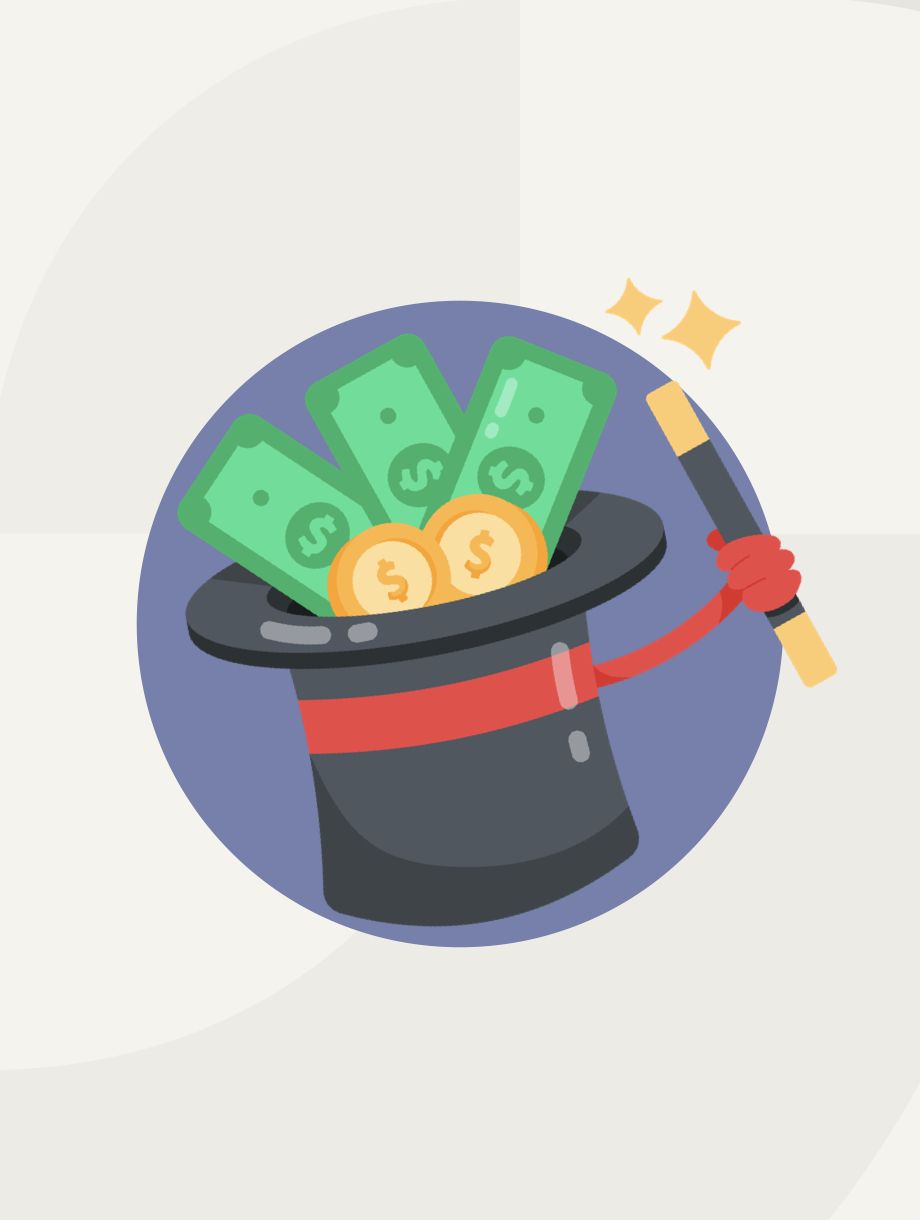
Ever wished you had a magic wand to foresee the future? Well, guess what?
In the world of finance, we have something pretty close: The Rule of 72! It’s almost like a crystal ball that offers glimpses into your money's future, and it’s simple enough for anyone to use.
The Rule of 72: A Quick Overview
The Rule of 72 is a fascinating and incredibly handy tool. At its core, it gives us insight into how long it'll take for an investment to double in value. It's the magic number that, when divided by the annual interest rate, spills the beans on your money's future doubling time. For instance, at a 6% annual return, your money would double in roughly 12 years (72 ÷ 6 = 12).
Three Exciting Ways to Play with the Rule of 72
Doubling Down on Your Investments:
Let’s say you have $1,000, and you’re curious about how long it will take to turn it into $2,000 at a certain interest rate. With the Rule of 72, you can whip out your calculator and, in seconds, determine the magic number of years. Whether you're saving for a dream vacation or a cool gadget, this tool offers a quick peek into your investment's future.
Quadrupling Fun:
But why stop at doubling? Let's kick it up a notch! The Rule of 72 doesn’t just tell you when your investment will double. You can use it to estimate when your money will quadruple! If you discover your money doubles in 8 years, give it another 8 and bam! You're looking at a quadrupled amount!
Racing Against Time:
Here's a fun game to play: If you have a particular period in which you wish to double your money, the Rule of 72 can tell you the annual rate of return you’d need. Dreaming of doubling that cash in 6 years? You'd need an interest rate of about 12% (72 ÷ 6 = 12).
The Rule of 72 offers a blend of simplicity, excitement, and practicality, making financial forecasting not just accessible, but, dare we say, fun!
It demystifies the complex world of investments, turning it into a playground where you’re armed with a powerful tool to envision your monetary future. So, go on and explore this financial magic; the power of 72 awaits!
Charting a Tax-Smart Retirement Journey

Embarking on the golden years of retirement, it’s imperative to illuminate the often-shadowed realm of taxes, a crucial player that, without meticulous planning, can significantly erode the value of your hard-earned retirement funds.
Envision a robust $1 million portfolio nestled in a 401(k) plan or a traditional IRA; this seemingly formidable nest egg might dwindle to a mere $800,000 or even less post-taxes. Similarly, investments harbored in standard, taxable accounts are not immune to the tax bite on the income they yield.
However, fear not, for there are strategic maneuvers available to navigate this fiscal maze. One potent strategy is to amplify your savings and investment efforts during your employment years, thereby accruing additional funds designed specifically to offset your tax liabilities. Alternatively, adopting a tax-savvy approach to your investment and account selections can significantly minimize your tax burden, leaving more of your funds intact and available for your enjoyment and use during retirement.
Let’s delve into the treasure trove of retirement income sources that are mercifully exempt from taxes:
Roth Withdrawals
Roth accounts are your steadfast allies in the quest for tax-free retirement income. Both IRA and 401(k) plans can don the Roth mantle, offering no tax deductions on contributions but granting the boon of tax-free withdrawals post the age of 59 ½. With Roth, you graciously pay your taxes at the contribution stage, thereby freeing your future withdrawals from the tax chains. While income ceilings exist for Roth contributions, fear not, for the conversion of traditional plans to Roth is always an option, albeit with applicable taxes on the conversion amount.
Inheritances
While relying solely on inheritances for retirement is a precarious strategy, many fortunate individuals do receive these tax-free financial windfalls, which can seamlessly supplement existing retirement savings.
Municipal Bond Income
Investing in municipal bonds, those issued by states and localities to fund essential public projects, offers a dual benefit: contributing to the common good and enjoying tax relief at the federal level on the interest earned. Residents of high-tax states may find these bonds particularly appealing, as they often come with state tax exemptions as well.
HSA Withdrawals
Health Savings Accounts (HSAs) are the financial Swiss Army knives of retirement planning, blending the best features of traditional and Roth IRAs. With tax deductions on contributions and tax-free growth within the account, HSAs are a potent tool, especially when funds are used for qualifying healthcare expenses.
Some Social Security Payments
While not universally tax-free, many Social Security payments do enjoy this status. However, it’s crucial to be aware that income levels can influence the taxation of these benefits, with higher earners potentially facing taxes on a portion of their Social Security income.
Life Insurance Proceeds
Life insurance payouts, often substantial, can provide a significant boost to retirement funds. Like inheritances, these proceeds are typically tax-free to the recipient, especially when received as a lump sum.
Embarking on retirement is a monumental life transition, laden with both excitement and challenges. Taxes, while potentially daunting, can be effectively managed with strategic planning and savvy decision-making. By harnessing the power of tax-exempt income sources and adopting a proactive approach to tax planning, you can safeguard your retirement funds, ensuring a financially secure and enjoyable retirement. The golden years are yours to relish, unencumbered by undue financial stress. With wisdom and foresight, navigate towards a retirement where your funds work for you, not against you, in the grand tapestry of your life’s next exhilarating chapter.
As you stand on the brink of retirement, the horizon is painted with endless possibilities, each day offering a canvas for you to paint with the vibrant colors of life’s joys and pleasures. However, the specter of taxes can cast a shadow over this bright panorama, subtly eroding the financial foundation upon which your dreams are built. It is here, in the meticulous crafting of a tax-wise retirement strategy, that you can truly set the stage for a retirement that is as financially secure as it is delightful and fulfilling.
Harness the power of tax-exempt income sources, those silent warriors that work tirelessly behind the scenes to protect your wealth from the relentless grasp of taxes. With instruments like Roth accounts, inheritances, municipal bonds, HSAs, certain Social Security payments, and life insurance proceeds in your arsenal, you have at your disposal a suite of tools designed to maximize your income while minimizing your tax liability. Each of these vehicles offers unique benefits, and when strategically integrated into your broader financial plan, they collectively serve as a bulwark against unnecessary wealth erosion due to taxes.
But remember, the journey to a tax-efficient retirement doesn’t happen by accident. It is the result of deliberate planning, informed decision-making, and a deep understanding of the tax landscape and its implications for your retirement income. Engage with financial advisors, immerse yourself in financial education, and stay abreast of the ever-changing tax laws and regulations. Knowledge, after all, is your ally, illuminating the path to a retirement where financial stress is minimized, and the joy of living is maximized.
So, as you step forth into the golden tapestry of retirement, do so with confidence and the assurance that comes from being prepared. Let the knowledge of tax-free income sources be the wind beneath your wings, propelling you forward into a retirement that is not just endured, but truly lived. With foresight, planning, and a commitment to financial wisdom, your retirement can indeed be a golden era marked by financial stability, peace of mind, and the freedom to pursue your heart’s deepest desires and joys. The canvas of retirement is yours to paint; make it a masterpiece of financial prudence and joyful living.
Closing the Gaps in Financial Literacy

Closing the Gaps in Financial Literacy
Financial literacy is a crucial skill set in today's world. It enables individuals to manage their income, control debt, make wise spending decisions, and plan for the future. However, national surveys highlight a concerning disparity in financial literacy rates among different racial and ethnic groups in the United States. This gap not only poses challenges to individual financial well-being but also plays a significant role in perpetuating the broader racial wealth gap.
The Data Paints a Bleak Picture
A 2021 study by the Financial Industry Regulatory Authority (FINRA) revealed a disheartening trend: financial literacy among American adults is declining. When respondents were tested with five basic financial questions, the average score was only 2.6 out of five, down from 3 out of five in 2008. The decline was particularly pronounced among adults under the age of 40, indicating a growing generational gap in financial knowledge.
Furthermore, lower financial literacy was linked to increased financial stress during the COVID-19 pandemic, underlining the real-world consequences of this knowledge gap.
Disparities Across Racial and Ethnic Groups
When examining financial literacy through a racial lens, disparities become evident. Asian-American and White individuals tend to score higher on financial literacy tests compared to Hispanic and Black individuals. In a 2018 FINRA report, Asian and White Americans scored an average of 3.2 out of six questions assessing basic financial literacy, while Hispanic Americans scored 2.6, and Black Americans scored 2.3—both below the national average.
These disparities are not limited to adults; they manifest early in life. Data from the PISA Financial Literacy Results in 2018 showed that White and Asian 15-year-olds have significantly higher financial literacy rates compared to their Black and Hispanic peers of the same age.
Economic Well-Being and Financial Fragility
Racial disparities in financial literacy are intertwined with economic well-being. While the percentage of unbanked Americans has decreased, certain racial groups, such as American Indian and Alaska Native, Black, and Hispanic households, are more likely to rely on alternative financial services like bill payment services and check cashing. This reliance often stems from financial insecurity and limited access to basic banking services.
Native American communities face particular challenges, marked by higher levels of financial fragility and distress. Their financial literacy rates are similar to those of Black and Hispanic populations, which lag behind White and Asian Americans.
Root Causes of the Gap
The racial financial literacy gap is not solely attributable to insufficient parental guidance or individual decisions. Recent studies suggest that socioeconomic and political barriers are significant factors. Minority groups are often directed toward predatory financial services from an early age, depriving them of access to essential financial education.
The gender gap in financial skills, partly attributed to differences in financial experience and education between men and women, may parallel the racial gap. Structural barriers, such as limited access to wealth, higher unemployment rates, and lower-quality education, can restrict minority individuals' financial development.
Historical injustices, which have left some racial groups with high poverty and unemployment rates, further exacerbate the issue, creating a cycle of limited opportunities and knowledge.
The Impact of Financial Literacy
Financial literacy directly influences financial well-being. The U.S. Financial Literacy and Education Commission emphasizes that financial literacy is foundational for full participation in the market, unlocking economic opportunities at the individual and national levels. With the increasing complexity of financial services like credit cards, mortgages, and student loans, financial literacy is paramount to navigating these intricacies successfully. Individuals without financial knowledge risk falling behind and becoming vulnerable to fraud.
Moreover, high financial literacy scores are instrumental in retirement planning, a key component of household wealth. This gap in financial literacy also contributes to the racial wealth gap, which measures wealth disparities among different racial groups in the U.S.
Closing the Gap
Efforts to narrow the racial gap in financial literacy are essential. The U.S. Financial Literacy and Education Commission's 2021 proposal outlines key changes, including clear guidelines for financial educators, increased access to one-on-one financial counseling, and consistent measurement of results. Tailoring financial literacy education to the specific needs of communities is highlighted as a crucial approach.
One-on-one counseling programs have proven effective in addressing financial literacy gaps, according to federal reviews. Government-funded initiatives, such as digital literacy programs, are targeted at communities in need, like Native American communities, to promote financial education.
Financial Literacy: A Necessity for All
Financial literacy is indispensable for individuals of all backgrounds. In today's complex financial landscape, everyone is expected to understand and make informed decisions about credit cards, loans, investments, and retirement planning. Those lacking financial savvy are more susceptible to scams and fraudulent schemes.
Acquiring financial literacy begins with assessing one's knowledge and identifying areas for improvement. Resources like the National Financial Capability Study and FINRA's quiz can help individuals gauge their financial literacy levels. Followed by targeted education and accessible online resources, anyone can take steps toward making smarter financial decisions.
Addressing the racial gap in financial literacy is not only a matter of individual well-being but also a critical step toward reducing broader economic disparities. We can work toward a more financially literate and equitable society for all through targeted education, equitable access to financial resources, and concerted efforts.
Planting the Seeds for a Secure Retirement: Why Now is the Perfect Time

“The best time to plant a tree was 20 years ago. The second best time is now.”
This ancient proverb not only offers wisdom about the value of time but also resonates profoundly when it comes to saving for retirement. Like a tree that grows over years, providing shade and fruit, your retirement savings need time to mature to offer you a comfortable and secured life in your golden years. Let's delve into understanding the essence of this saying in the context of retirement planning.
The Power of Compound Interest
Imagine if you had planted a tree 20 years ago. Today, it would likely be robust, tall, and bearing fruit. Similarly, when you start saving early for retirement, your savings grow exponentially due to the magic of compound interest. The interest you earn on your savings gets reinvested, leading to interest on interest, causing your savings to grow at an accelerated rate. The longer your money has to compound, the more you'll have when you retire.
The Recommended Savings Rate
Financial professionals often suggest saving 10-15% of your current income for retirement. This benchmark is based on starting in your early to mid-20s and retiring around 65 with a comfortable nest egg. However, this percentage is not a one-size-fits-all solution. The ideal savings rate varies based on when you start.
The High Cost of Waiting
The proverbial tree planted 20 years ago would be much larger than one planted just a year ago. Similarly, the later you start saving for retirement, the more you'll need to set aside to achieve the same financial goals.
For instance, if you start saving in your 30s instead of your 20s, you might need to save 15-20% of your income instead of the recommended 10-15%. If you delay until your 40s or 50s, that percentage could rise even higher. The reason is simple: less time for compound interest to work its magic.
Let's put this into perspective with an example:
Anna starts saving for retirement at 25, contributing $300 every month (roughly 10% of her income). By the time she's 65, with an average annual return of 8%, she will have accumulated over $1 million.
On the other hand, John, who starts saving the same amount at 45, will have just over $175,000 by age 65, given the same annual return.
The difference is staggering, and it's all because Anna gave her savings 20 more years to grow.
Practical Steps to Start Now
If you haven't started yet, don't be disheartened. Remember, the second best time to plant a tree is now. Here are some actionable steps to kickstart your retirement savings:
1. Assess Your Current Financial Situation: Understand your income, expenses, and any debts. Create a budget that allocates a specific percentage for retirement.
2. Set Clear Retirement Goals: Determine how much you'll need for retirement. Consider factors like living expenses, inflation, medical costs, and any plans for travel or hobbies.
3. Utilize Retirement Accounts: Take advantage of employer-sponsored retirement plans like 401(k)s. If self-employed or if your employer doesn't offer a plan, look into IRAs.
4. Seek Professional Advice: Consider consulting a financial professional. They can provide personalized advice based on your unique situation and goals.
5. Regularly Review and Adjust: As you age, your financial situation and goals might change. Regularly review your retirement plan and make necessary adjustments.
While it's beneficial to start saving for retirement as early as possible, it's never too late to begin. The key is to start now and be consistent. By understanding the importance of time and the power of compound interest, you can plant the seeds today for a secure and comfortable retirement tomorrow.
Empowering Women Financially
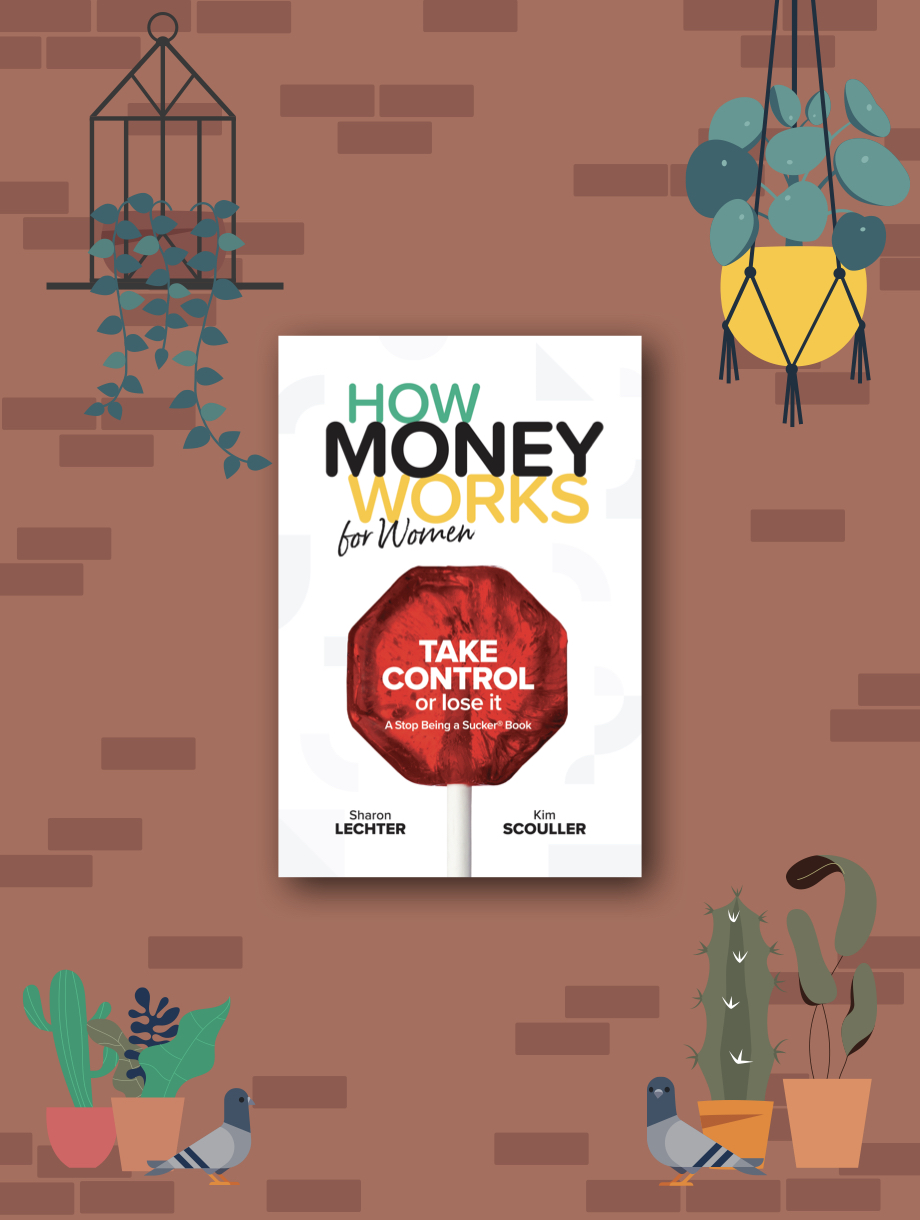
A Journey Beyond Wealth
In our world today which is constantly changing and evolving, the concept of wealth for women is undergoing a considerable transformation. Wealth is no longer solely focused on just financial security, but extends to include a broader spectrum of financial knowledge as well as emphasizes the importance of empowerment and holistic success.
As women leaders, our journey towards financial freedom is paved by more than just how much we earn. It is paved by overcoming obstacles, making well-informed decisions along the way, and gaining wisdom from some good-old-fashioned experience. Embracing this multidimensional journey to wealth allows us to cultivate a legacy of lasting significance while inspiring others to reach their full potential as well.
The Power of Financial Literacy
Possibly the most crucial aspect of empowering women financially is getting a financial education. Learning how to manage money is definitely important, but truly understanding core financial concepts in order to be better decision makers when it comes to money could change the trajectory of our success. Learning these concepts as early as possible in our journey truly enables us to make a difference in our lives and the lives of our family members as well. By equipping ourselves with knowledge, we gain a deeper understanding of key concepts involved in successfully budgeting, investing, saving and retirement planning. Being informed about these main concepts enables us to make smart financial decisions that align with our goals and values. Who wouldn’t want to do that?
Furthermore, financial education serves as a foundation which can be built on as we develop the skills needed to navigate the ever-changing economic landscape and adapt to new opportunities. Everyone can be susceptible to financial exploitation or manipulation, but the statistics are even higher for this happening to women in our ever-changing world. A financial education equips women to stay away from threats like this and be confident while taking control of their finances. By investing in financial education, we invest in the empowerment and independence of women, creating a ripple effect that benefits individuals, families, and communities as a whole.
Breaking Through Barriers
Despite significant progress being made in recent years, there are still pervasive barriers that hinder women from attaining the financial success they work hard for. One of the most prominent and persistent challenges is the gender pay gap, a phenomenon where women continue to earn less than their male counterparts for performing the same job roles. This unjust disparity not only affects women's current earnings but also has long-term implications on their retirement savings and social security benefits, perpetuating a cycle of financial disadvantage. It is crucial that we continue to address and dismantle these barriers, working towards a more equitable and inclusive society for all.
Another barrier is the lack of access to financial resources and support systems, especially for marginalized communities and developing countries. This can be addressed through initiatives that provide financial education, and entrepreneurship opportunities for women in need.
Paying It Forward
Challenges will always exist on our journey towards financial independence and equality, and along our way there will be women who lend us a hand, give us guidance and provide us with support in the way in which we need at the time. It is crucial for us to pay it forward by extending our support to other women who may be facing their own challenges along the way. One of the most impactful ways we can do this is through mentorship programs, where we can share our knowledge and experiences to uplift and empower women who may not have the same opportunities as we do.
Although it may sound simple, another impactful thing we can do is set a positive example and share our success stories. When we do this, we inspire other women to believe in themselves and their own capabilities. Together, we can create a ripple effect of change that will benefit not just ourselves but also future generations of women.
How can you help? Engaging in volunteer work and philanthropic initiatives allows us to create a positive ripple effect in the lives of women, helping them overcome barriers and providing them with the resources they need to thrive. A perk of living in the information era: a Google search will provide you some with organizations that have opportunities where you can help. Together, let's create a community that embraces and supports one another, fostering a better future for ALL women.
Redefining Wealth: Knowledge & Empowerment
The contemporary woman leader, in her pursuit of wealth, recognizes that it extends far beyond monetary measures alone. She perceives wealth as a harmonious blend of knowledge, empowerment, and financial independence. This comprehensive perspective on wealth is absolutely crucial in today's world, where women are shattering glass ceilings and reshaping societal roles across all domains.
The path to wealth, therefore, unfolds along two interconnected avenues: 1) acquiring financial literacy and 2) working with a financial professional to make well-informed decisions with an unwavering confidence. By proactively going down these two avenues, we are poised to unlock a world of possibilities and create a lasting impact.
The Must-Reads for Aspiring Women Leaders
To aid in this transformative journey, books can offer profound insights and invaluable guidance. Books can often help us navigate life's financial challenges with wisdom, cultivate personal growth, and unlock all women’s full potential when it comes to acquiring wealth. Here are five must-read (or must-listen-to) books that will ignite your imagination, challenge your perspective, and inspire you to embrace your own journey of self-discovery and empowerment:
- Think and Grow Rich for Women by Sharon Lechter: This book is not just about growing rich in the financial sense but also rich in experience, knowledge, and wisdom. Sharon reinterprets Napoleon Hill's famous work through the lens of the female leader, providing a roadmap that is both inspiring and practical.
- How Money Works for Women by Sharon Lechter & Kim Scouller: Sharon and Kim present a guide specifically tailored for women, addressing unique challenges and opportunities. It's a book that demystifies financial concepts, making them accessible and understandable.
- Build an Empire by Elena Cardone: This book takes the concept of wealth beyond the individual. Elena inspires women to think big - not just for themselves but for their families, communities, and beyond. It’s about building something lasting and impactful.
- Smart Women Finish Rich by David Bach: David provides a pragmatic approach to achieving financial independence. This book is a comprehensive guide that covers everything from investing to saving and spending wisely.
- Women With Money by Jean Chatzky: Jean offers a fresh perspective on how women can approach money with confidence and clarity. It's about understanding one’s worth and making money choices that resonate with personal values and goals.
"You are where you are today because of choices you've made before today. If you want something different, simply make different choices."
Sharon Lechter
The Path to Empowerment
These books provide incredibly valuable insights and strategies to navigate the complexities of the business world, as well as create your own path to success. They empower you with the knowledge and mindset to thrive in the male-dominated financial industry, challenging societal norms and paving the way for future generations of women leaders.
For the aspiring woman leader, these books are not just a source of financial education but a powerful catalyst for personal growth. They inspire you to think differently about wealth, recognizing it as more than just a number, but as a tool for achieving your dreams and aspirations.
So, I encourage you dive into these empowering books and unlock YOUR full potential. Let them be your personal guiding light as you embark on an incredible journey of both personal and financial growth. On this path, wealth is not solely measured by material possessions, but by the person you become through the transformative process of knowledge and self-discovery. Embrace the company of these literary treasures and let them guide you towards a future filled with endless possibilities and fulfillment.
- Lauren Mathews Fairey
American Savings Trends in 2023
.png)
Cultivating the habit of saving money is a cornerstone of sound financial health,
serving as a vital strategy for achieving significant fiscal objectives while avoiding the pitfalls of debt accumulation. This practice gained significant momentum during the initial phase of the pandemic, as reflected in the notable increase in average savings account balances. However, the current financial landscape presents a more complex scenario.
Despite a substantial rise in interest rates over the past few years, personal savings rates have not mirrored this trend proportionally. This discrepancy highlights a broader issue: numerous factors influence an individual's capacity to save. These factors can range from fluctuating income levels, increased living costs, and unexpected expenses, to more systemic issues like economic instability and wage stagnation.
There are various reasons why people save. Short-term goals include saving money for holidays, purchases, or renovating a house. In the long term, the most crucial reasons for putting money aside in the United States are related to the costs of the education of one's children or ensuring financial stability in retirement. However, the high inflation rates in the United States since 2021 have made it more difficult to save money.
Moreover, there is a growing body of evidence indicating a strong desire among individuals to enhance their savings beyond current levels. This aspiration, however, often clashes with the practical realities of their financial situations. To address this, it's essential to acknowledge the diverse challenges people face in their savings journey and to explore a variety of strategies that can help bridge the gap between their savings goals and their actual savings behavior.
Effective money-saving techniques are not one-size-fits-all; they require a personalized approach that takes into account individual circumstances and financial goals. By understanding and adapting to these varied factors, individuals can develop more realistic and achievable savings plans, positioning themselves for greater financial stability and success in the long term.
Total U.S. personal savings amounted to $802.1 billion as of November, 2023. The personal savings rate (personal savings as a percentage of disposable personal income) was 3.4%.
- From 1971 to 2023, interest rates averaged 5.42%. Interest rates reached an all-time high of 20% in March 1980 and a record low of 0.25% in December 2008.
- Data from the Federal Reserve shows the average American family has $62,410 in transaction accounts.
- Factors like age or education level may impact the amount the typical American actually has saved.
- The average American savings balance may also depend on household size and homeownership status.
A Forbes Advisor survey of savings habits conducted in March 2023 found that two-thirds (66%) of Americans said they were able to save money in the past year. Increased interest rates (50%) and pay increases (35%) were the most common factors helping respondents save.
The uncertain state of the economy motivates many to save, but this is only one way people are attempting to protect themselves. A 2023 report from Northwestern Mutual found that Americans are taking three major steps to address economic uncertainty: Nearly 64% of respondents are cutting costs, 50% are building savings and 41% are delaying large expenses. Each household often utilizes multiple strategies at a time.
Still, Americans face many barriers to saving and are putting away less of their income overall. According to data from the St. Louis Federal Reserve, personal savings only accounts for 4.1% of disposable personal income as of April 2023. That’s well below pandemic highs of 33.8% in April 2020 and 26.3% in March 2021 and lower than the savings rate a decade prior, 6.2% in April 2013.
And while savings interest rates are at a 15-year high, many Americans may find it difficult to take advantage of these competitive rates in the current economic environment.
Transaction account estimates can shed light on the overall banking balances of Americans. In 2022, the national per capita disposable personal income was $55,832 and the personal savings rate was 3.6%. Based on this data, Americans were able to save roughly $2,010 per person last year.
According to data from the Federal Reserve's 2022 Survey of Consumer Finances, the average American family has $62,410 in savings, across savings accounts, checking accounts, money market accounts, call deposit accounts, and prepaid cards.
Note that this number is an average, not a median, which means it can be skewed by households with especially high or low balances. This number does not include investment balances, like money held in a retirement account or other brokerage account, or any equity held in real property, like a house.
When you look a little closer at the data, there are several factors that influence how much an American household actually has saved.
Average Savings Balance by Age
Older Americans tend to have more cash in the bank than younger Americans. The average person between the ages of 45 to 54 has $50,590 more than the average person under age 35. However, average savings account balances start to decline after age 70.
Here's how the average savings balances break down by age group, according to Federal Reserve data:
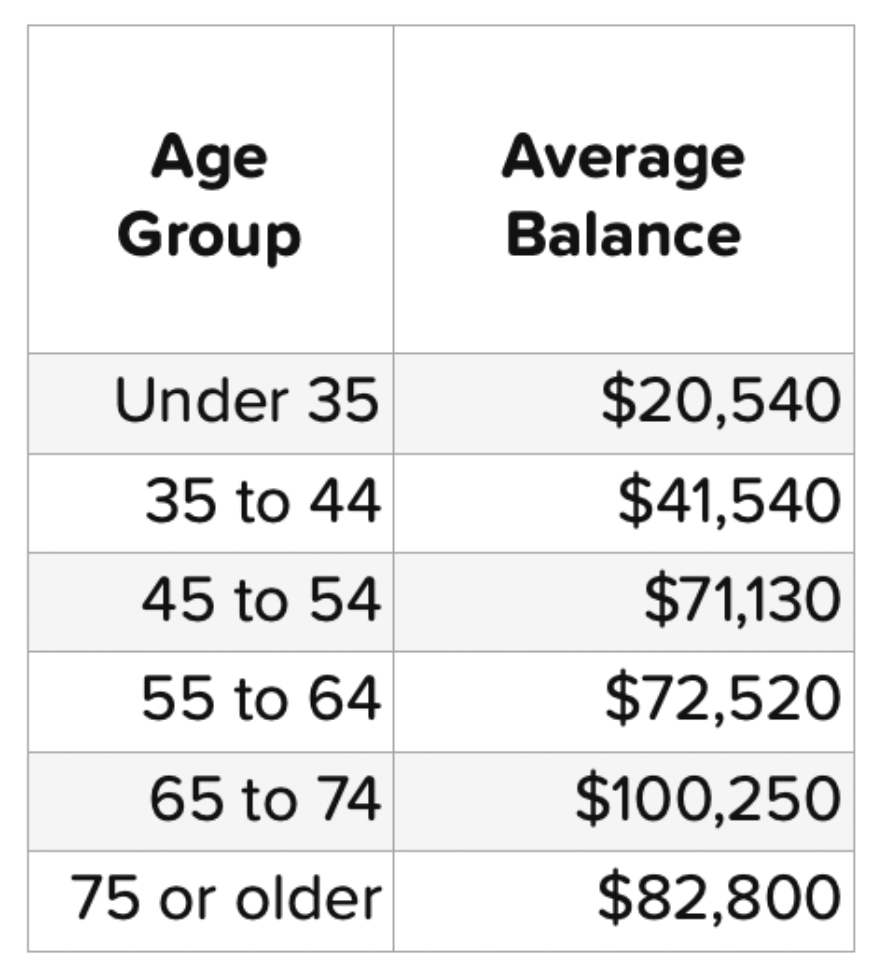
Average savings balance by household size
Kids and marriages tend to dramatically change a family's household savings balance.
On average, single-parent households under the age of 55 tend to have the lowest average savings balances, while couples without children tend to have the highest average savings balances.
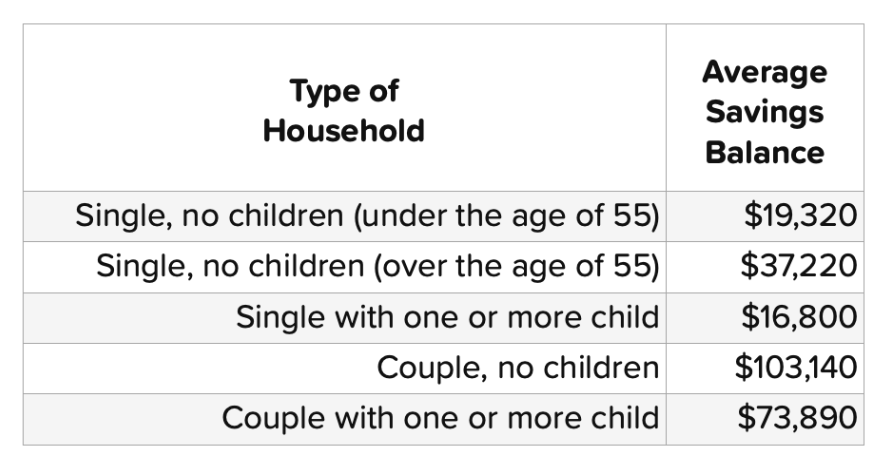
Average Savings Balance by Race
A large racial wealth gap still exists in America, from income to household wealth. According to data from the Federal Reserve, that gap flows into savings balances as well.
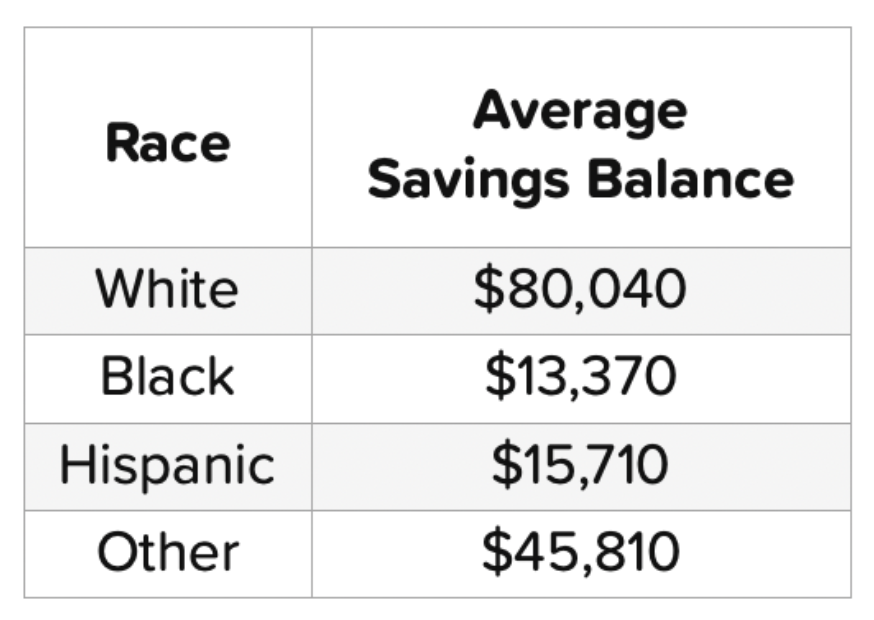
Average Savings Balance by Education Level
As a family's education level increases, so does the average savings balance. People who earned a high school diploma have an average savings balance double that of those who haven't. Similarly, people with a college degree have an average savings balance about five times greater than that of someone who only completed high school.
Here's how education affects savings balance, according to the 2022 Survey of Consumer Finances:
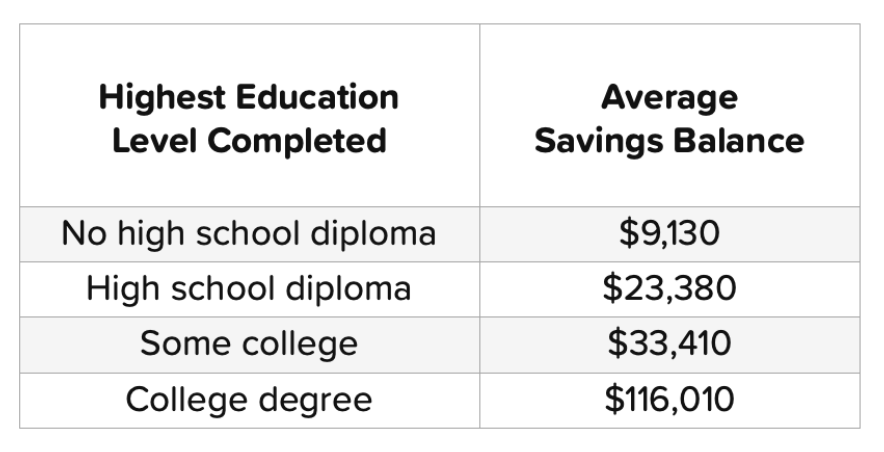
Average Savings Balance by Homeownership
People who own homes tend to save more, on average, than people who own homes have more cash in the bank than those who rent, according to Federal Reserve data.
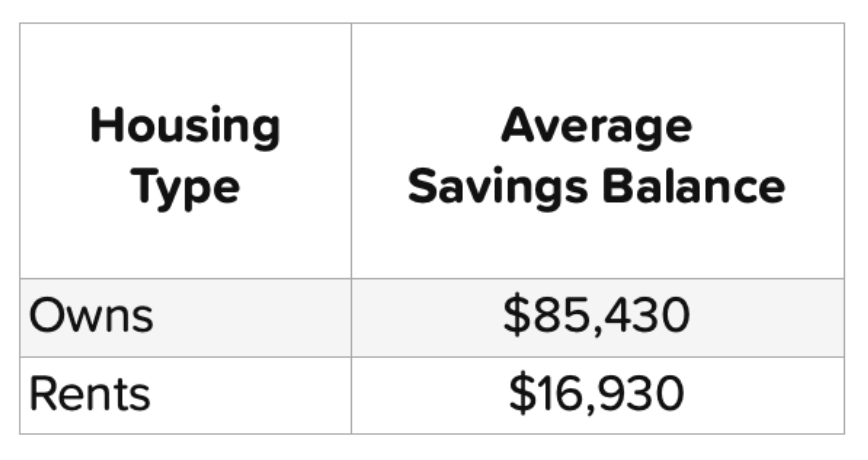
Average American Savings Balances
The average American savings balance can vary greatly depending on your circumstances. Numerous factors, such as age, household size, race, education level, and homeownership status can impact how much you've saved.
Also, keep in mind that the data we've included from the Federal Reserve's 2022 Survey of Consumer Finances doesn't not factor in retirement accounts, and represents an average savings balance of high-income and low-income American families.
While saving for retirement and other goals is important, so is saving for potential emergencies. Emergency savings prevent you from having to take out a loan or use a credit card to cover unexpected expenses.
Unfortunately, not all Americans are financially prepared for an emergency.
According to the Making Ends Meet Survey and Consumer Credit Panel from the Consumer Financial Protection Bureau (CFPB) conducted in 2022, 24% of Americans don’t have any money saved for emergencies. And while 37% reported having at least a month’s worth of income in emergency savings, 39% reported having less than this.
Setting money aside for emergencies can have a significant impact on overall financial well-being, and data suggests an upward trend in emergency preparedness in the U.S. A 2021 report by the Federal Reserve on the economic well-being of U.S. households found that adults who said they could cover a small emergency expense using cash increased to 68% in 2021, up from 50% in 2013.
Average Emergency Savings
How much you should save for emergencies depends on a number of factors, but many Americans are saving $5,000 or less. The Transamerica Institute found the median emergency savings to be $5,000 as of late 2021, with over a third (34%) of Americans reporting saving less.
A few thousand dollars could help in many situations, but it may not be enough if you’re faced with back-to-back emergencies—or one very costly one.
How Much Emergency Savings Should I Have?
As a general rule, experts suggest keeping at least three to six months’ worth of living expenses in an emergency fund. But the ideal amount of emergency savings for you depends on your expenses and financial situation, and certain risk factors may require you to save more. For example, if you have dependents, low job security or a fluctuating income, a larger emergency fund could be helpful.
If you can’t save three to six months’ worth of expenses right away, save what you can now and contribute more when you can afford to. Starting somewhere is better than not starting at all.
Retirement Savings Statistics
As of September 2022, the Investment Company Institute found that 401(k) plans hold a combined $6.3 trillion in assets in across 625,000 plans. This encompasses millions of participants and retirees.
According to further data, while around three-fourths of non-retired adults were found to have some retirement savings, 28% had none. Unfortunately, this percentage was up from 25% in 2021.
401(k) plans aren’t the only place Americans are stashing retirement savings. While 54% of non-retired adults have their retirement savings in defined contribution plans like 401(k) or 403(b) plans, 47% have retirement savings outside of formal retirement accounts.
And just because money is earmarked for retirement doesn’t mean it never gets spent on other things. An economic well-being survey of U.S. households conducted by the Federal Reserve in 2023 found that 8% of non-retired adults tapped their retirement savings to cover an emergency in 2022.
What Is the Average Retirement Savings?
Average savings vary by age. This makes sense not only because savings ideally grow over time rather than shrink, but also because people usually earn less early in their careers than they will later on.
According to data from Empower (formerly the Empower Institute) in 2022, the average 401(k) account balance is $118,781 across all ages. However, the median account balance is much lower—only $32,689 across all ages. The average balance increases with each subsequent age group until the 60 to 65 age group, when many workers retire and begin to make withdrawals from their 401(k)s.
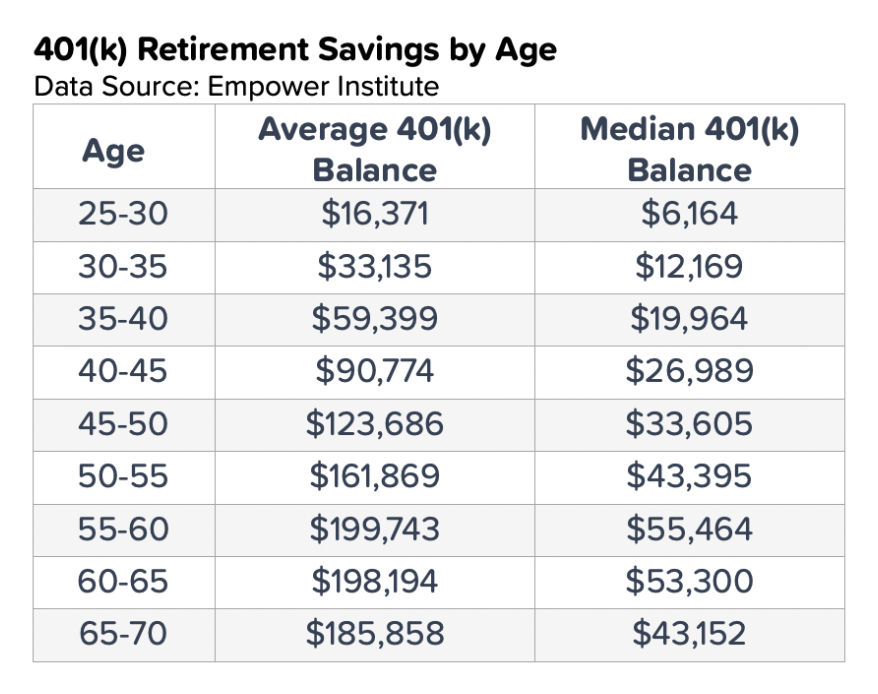
How Much Retirement Savings Should I Have?
The amount of money you need to save for retirement depends primarily on your life expectancy, the age at which you’ll retire and your spending habits.
An analysis by Fidelity Investments provides some general guidelines for defining this. These guidelines suggest you should have one times the amount of your salary saved by age 30, three times by age 40, six times by age 50, eight times by age 60 and 10 times your salary by age 67.
According to Fidelity, these figures assume you save at least 15% of your income annually starting at age 25, invest an average of 50% of your savings in stocks over your life and plan to retire at age 67 without inflating your lifestyle in retirement.
How To Maximize Retirement Savings
The average U.S. retirement savings balance in a 401(k) plan is $118,701, but the median is only $32,689. This means many individuals likely fall short of the targets laid out above. Especially for those not saving enough, it’s important to understand how to maximize retirement savings.
The sooner you start saving for retirement, the more likely you are to retire with enough—or more than enough—cash to cover your expenses. If you’re one of the 28% of non-retired Americans with no retirement savings, start saving today.
Aside from starting as early as you can, here are a few tips for maximizing your retirement savings:
- Contribute enough to your workplace retirement plan for employer matching. If your employer offers a match on retirement contributions, don’t let that free money slip away. Contribute at least as much as you need to receive the full match. For example, if your employer matches up to 5% of your salary, contribute at least 5%.
- Contribute to other tax-deferred accounts. In addition to using your workplace retirement plan, there are other accounts you can open to build retirement savings. Consider a traditional IRA, Roth IRA or health savings account (HSA) for tax-advantaged savings. If you’re maxed out on these accounts, you can always funnel extra savings into a taxable brokerage account.
- Make catch-up contributions if you’re over age 50. When you reach age 50, the IRS allows you to make extra contributions to your retirement accounts, including both 401(k) plans and IRAs, to help bolster your savings. If you started late or fell behind with your retirement savings, you can get back on track by making catch-up contributions up to the annual limits.
A January 2023 survey by Forbes Advisor on financial regrets and successes uncovered interesting data about U.S. consumer savings trends. It found that the most common financial habit Americans planned to adjust in 2023 was tracking spending/creating a budget (43%). Americans also indicated wanting to save more and spend less. The next three most popular responses participants gave were spending below their means (40%), paying down debt (37%) and adding to emergency funds (25%).
This survey also found that 56% of Americans who experienced financial regret in 2022 cited not saving more money as one of their top three misgivings. Meanwhile, 57% of Americans who experienced financial success named increasing their savings as one of their top three triumphs.
Forbes Advisor also conducted a survey in March 2023 to analyze how often Americans save and what methods they use. When it comes to putting the habit of saving into practice, 44% of Americans use recurring transfers to save automatically, 38% allocate a portion of their pay directly into a savings account and 35% manually transfer their funds. Some use a combination of methods to save.
Current Savings Account Rates
Research suggests that interest rate hikes encourage Americans to save. But even though savings account interest rates have been on the rise, they still vary widely from bank to bank. Below is a look at national interest rates as of November, 2023.
The average savings account rate is a benchmark for the overall interest-rate environment, but it’s not a rate you should settle for.
Rather, aim for an annual percentage yield (APY) many times the national average, such as those offered by high-yield savings accounts. It’s easy to find a high-yield savings account that offers a competitive return with a no or low minimum balance requirement.
National Interest Rates
Data Source: The Federal Deposit Insurance Corporation (FDIC)
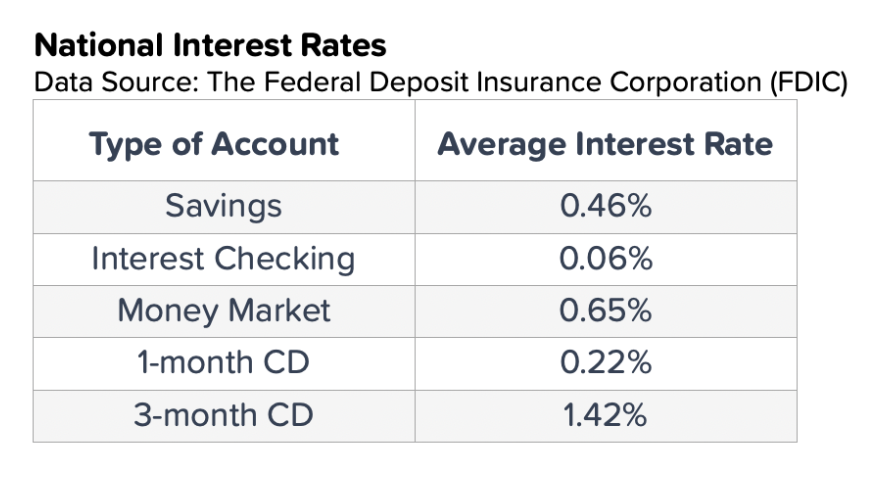
Start Saving Money
With a dramatic drop in Americans’ personal savings rates over the past couple of years as well as clear indications that many want to save more, there’s no doubt that saving is easier said than done.
Saving is important for achieving financial freedom and confidence. This requires little convincing, but it can be difficult to know where to start. Use these tips to cut down costs and boost your savings:
- Pay off high-interest debt first. The less money you need to throw at your debt, the more you can funnel toward your savings goals. Start by paying off your high-interest debt first, including credit card debt and loans, because it is often the costliest. Try to make more than the minimum payments and focus on the debt that costs you the most first.
- Track your spending and create a budget. If you’re not already using a budget, try it now. Start by tracking your spending to see where your money goes each month. Based on this information and your savings goals, create a budget that includes all of your income and expenses. Look for areas where you can redirect spending toward savings and debt payoff.
- Automate savings wherever possible. If you want to save without needing to think about it, automation is key. Automate monthly or weekly transfers from checking to savings and set up automatic contributions into your workplace retirement account. Start with however much you can afford, even if it’s not a lot. Increase contributions as your paycheck and budget allow.
- Plan for large expenses. When you allow large expenses to sneak up on you, they can derail your budget, empty your savings or force you to take on high-interest debt. Instead, do a little planning for significant spending. List large and irregular expenses like car registration costs and vacations and break them down into monthly savings goals. Include these in your budget.
- Take advantage of high-yield savings accounts. When you’re working hard to save money, a competitive interest rate can accelerate the process. To get the most from your savings, put your cash in a high-yield savings account instead of a traditional savings account. High-yield savings account rates beat national averages and tend to offer more flexibility and tools.
Bottom Line
In recent years, particularly throughout 2021 and 2022, there has been a noticeable uptick in the average balances of American savings accounts, a trend that seemed to signal a positive shift in savings behavior. However, this increase in savings account balances doesn't fully capture the broader picture of American financial habits. Despite these initial gains, the overall proportion of income that Americans are saving has diminished, with many individuals finding themselves underprepared for emergency situations.
At the same time, the financial landscape is evolving. Interest rates have climbed to their highest levels in 15 years, offering consumers a more favorable environment for saving money efficiently. This shift presents a valuable opportunity for those aiming to bolster their savings and emergency funds, aligning with the aspirations of many to improve their financial resilience.
However, the journey to effective saving is fraught with challenges and can be influenced by many factors. Key among these are age, geographic location, income levels, and spending habits, all of which play a crucial role in determining your ability to set aside funds for unforeseen expenses, retirement, and other financial objectives.
Despite these challenges, there are strategies and tools available that can greatly assist in the pursuit of financial security. Leveraging tax-advantaged accounts, investing in high-yield savings options, and implementing automatic transfers are just a few of the methods that can facilitate more effective saving. When these tools are utilized, especially from an early age, they can significantly enhance one's ability to meet both short-term needs and long-term financial aspirations.
While the path to saving is complex and varied, understanding the current economic context, recognizing the individual factors that impact saving capabilities, and employing strategic financial tools can collectively empower individuals to make substantial strides towards achieving their financial goals.
The Knowledge Gap

Knowledge separates those who take advantage from those who are taken advantage of.
Why? Because knowledge translates to action.
This is especially true when it comes to money.
Think about it. The Sucker “knows” just a few things about money…
“I need money to buy things.”
“I work to earn money.”
“I will never earn much money.”
Now, consider what the Wealthy know about money…
“I can use money to start a business.”
“I can use money to earn compound interest.”
“I can use money to make my family’s life easier.”
“I can use money to leave my loved ones a legacy.”
The difference is simple.
Because the Sucker knows little about money, they see it only as a necessary evil.
But the Wealthy know money creates opportunity.
It all starts with knowledge. If the Sucker knew how money actually works, they would see it—and manage it—differently.
What do you think you know about money? If you’re not sure, scroll up to the top of my site and head over to the Learn section. There, you’ll find the Change Your Literacy Change Your Life Challenge, a quick quiz that will reveal how much you actually know about money.
When you’ve completed the quiz, let me know how you did. Better yet, what answers surprised you? It may be that you’ve never been taught things like the Power of Compound Interest or Risk Diversification. And that can warp your ability to see money as an opportunity instead of a limitation.
It all starts with your thinking. It all starts with learning how money works.
Exposing the Roots of Your Financial Insecurity

If you feel like your finances are teetering on the edge of disaster, there’s a likely culprit—financial illiteracy.
Do you agree or disagree with these statements?
The statements are adapted from research designed to test relationship security. They aren’t dependent on your income or savings level. Instead, they measure something far more relevant—how you feel about your finances.
And if you’re like many, you agree with most, if not all of those statements. It’s an indication that you feel financially insecure. And there’s a reason for that…
It’s because your finances are in grave danger.
It’s not your fault—nobody taught you how to create financial security. In fact, you may not have learned the basic building blocks of growing wealth, much less how to protect against losses, inflation, or tragedy.
So is it any surprise that your finances feel like a house of cards? And since you’re an intelligent, normal human, you can feel the looming threat of collapse. It weighs on you, makes you anxious.
And it should—your feelings are a blaring alarm announcing that your situation is precarious, and you need to act.
But you can’t respond to danger until you identify what’s wrong. And the greatest enemy of your financial security? Financial illiteracy.
Think about it—would your finances have reached this point if you knew how money worked? Of course not!
If you knew how to actually build wealth and avoid financial blunders, you likely would have chosen a completely different path.
So the antidote to your feelings of financial insecurity is simple—learn how money works. Then, apply your knowledge. You may be surprised by the new sense of security that appears in your life.
Knowledge is Not Power

Your financial education must include both knowledge AND what steps to take. It must teach you wealth building concepts AND wealth building strategies.
If you’re lacking knowledge, it’s impossible to start your journey to financial independence because the money decisions you make without it are likely to do more harm than good.
But knowledge alone is not enough. Knowledge without guidance leads to information overload and analysis paralysis.
It’s what all financial professionals hear: ”You’ve taught me about the Power of Compound Interest. Great! And now I know about the Time Value of Money. Wonderful! But where the heck do I find an account with the interest rate I need to reach my financial goals?”
Tony Robbins said it best. “Knowledge is NOT power. Knowledge is only POTENTIAL power. Action is power.”
So before you create a strategy to start building wealth, learn how money works. Discover the financial illiteracy crisis and its impact on your peace of mind. Learn about the Power of Compound Interest and the Time Value of Money and how those concepts can make your money earn more money. Realize the wealth building potential of starting a business.
Then, get with a licensed and qualified financial professional. Start working through The 7 Money Milestones. They’re time-proven steps that can move you from financial hardship to financial independence. The Milestones are…
• Financial Education
• Proper Protection
• Emergency Fund
• Debt Management
• Cash Flow
• Build Wealth
• Protect Wealth
Why these steps? Because they apply what you’ve learned to simple strategies, like…
• Securing proper financial protection for your family
• Leveraging a side hustle to boost cash flow
• Protecting your wealth with an estate plan
The Milestones take your newfound knowledge and transform it into action. They move you from having the potential to be wealthy to walking the path towards securing your future.
In short, they help unlock your power to create the future you want.
Learn how money works. Follow the Milestones. Take control of your financial future. With this education, you can be on the road to wealth in no time flat.
Is Your Cash Flowing?

How much cash do you have left at the end of the month after you’ve covered the essentials AND treated yourself? (I’m guessing not much.)
Wish your paycheck went a little further? You’re not alone—not by a long shot. Most Americans are living paycheck-to-paycheck and saving little to nothing. So how do you increase your cash flow so you can stop living in the Sucker Cycle and start saving and investing more?
In the book, HowMoneyWorks: Stop Being a Sucker, we attack this challenge head on in Milestone 5 of the 7 Money Milestones.
Here are a few tips to get your cash flowing towards your future…
Redirect your cash flow
There are a million little things that siphon away your paycheck. Credit card debt, monthly subscriptions, and your fast food habit all chip away at your income. This “death by a thousand cuts” is a foolish spending cycle that prevents you—and countless other suckers—from creating an emergency fund, protecting your income, and building wealth for the future.
That’s why it’s so important to make and maintain a budget. It’s like a map of where your cash is going. Once you have that knowledge, you can figure out where you need to dial down your spending and start redirecting your cash. Don’t get too detailed. You don’t need to get overwhelmed by spreadsheets. Try creating a one-page list of expenses, freeing up as much cash as possible. Take your budget to your financial professional and discuss how best to use this available cash.
Open up new income streams
Budgeting and cutting back on spending might not be enough. Life throws plenty of unexpected (and expensive) problems at us that might not have a budgeting solution. You may need to look for new income streams to maintain the lifestyle you want while also saving for the future.
You’d be surprised by how many possibilities there are to create additional income streams—many of which offer the chance to make money from home. Maybe now is the time to discover that your favorite hobby or area of interest is actually a way to earn some cash. That could look like a side hustle or weekend gig, but you might find that your skills and ideas are full-time business opportunities just waiting to happen! Research which of your ideas and skills are in demand, figure out how much time and effort it will take to get started, and decide how much time you’re willing to commit. (It could be easier than you think!)
Increasing your cash flow can open up a whole new world of opportunities. That extra money you have from cutting back on takeout and streaming services could be how you fuel the power of compound interest and finally start saving for retirement. That several hundred dollars you bring in from teaching guitar lessons each month could be how you pay off your credit cards and free up even more cash. There’s no doubt your options can really open up once your cash starts flowing!
Lessons from Las Vegas

Why are so many people so bad with money, even though they know it’s important?
There’s an article from Psychology Today titled “The Psychology of Money.” It was published in 1995, but the central question still rings true—why do people sacrifice so much for money, only to blow it all?
Michael Ventura, the author, asks the question in the context of Las Vegas, where hard earned money goes to die. He paints a vivid picture of brightly lit casinos packed with overweight middle-aged men in casual clothes hunched over blackjack tables and slot machines.
Not one of them looks happy.
They likely don’t talk much with their spouses.
They spend a few minutes each week in conversation with their kids.
All they do is work. Their income and financial resources define their social status.
And yet here they are, gambling it all away and hating every second of it.
And again, it begs the question of WHY? Why the insane urge to unravel everything they’ve worked so hard to create?
Here’s a thought—what they’re doing at the casino isn’t too far off from what the sucker does every day. They throw away money in hopes of a rush, and wait to see how the cards fall.
Think about it—they work and work and work for money, but for what? So they can buy a house, a car, and maybe take a nice vacation. Maybe they think it will make them happy. But what does that really get them? A bigger mortgage, higher monthly payments, and the constant worry about losing their job and being unable to make ends meet. They don’t know how to use their money to build wealth or a stable, happier life. How could they?
They’ve never been taught.
The casinos of Vegas call their patrons suckers. Banks give you a sucker on the way out the door. They both leverage the same Sucker Cycle, the same psychology.
So what’s the lesson from Las Vegas? That everyone’s a sucker? That you’ll never be good with money?
No.
The lesson is that you must learn how money works. You must realize that something better is possible with your money. With your life. That you actually have what it takes to make decisions. To write a story with a better ending than hunching over a slot machine with a blank expression on your face.
Home Price vs. Interest Rate: Which Is More Important?

Millennials, this one’s for you—a low interest rate DOES NOT balance out a high home price.
Millennials face a dilemma—pay greater home prices now but at lower interest, or hope that interest rates increase in the future which historically has lowered home prices.
Some Millennials are choosing to face the housing market head on, while others are waiting things out.
So which camp is “right”? And, if you’re a Millennial, which camp should you join?
The answer: None of the above. The real question is—and has always been—can you actually afford to own a home?
Let’s do the math…
Suppose you live in a fantasy where the housing market is semi-normal somewhere in the world. You have two potential homes in the running—one in the suburbs, the other in the city.
The suburban home costs $300,000 with a 30-year mortgage at a rate of 6%.
The city home costs $500,000 with a 30-year mortgage at a rate of 2%.
One Sucker sees a lower interest rate and ignores the price tag, while another Sucker sees the lower price tag and ignores the higher interest rate. Both think they’re getting an historic deal.
But get this—the monthly payment will be almost identical for either house.
The wealthy realize that high prices and high interest rates have the same result—you pay more for your home, and the bank profits.
Instead, the wealthy ask themselves questions like…
Can I afford my monthly payment?
Have I saved enough for an adequate down payment?
Will I have enough left for furniture and repairs?
Have I factored in the cost of property taxes and HOA fees?
The takeaway? The wealthy don’t lose sight of what matters most—their cash flow. Just because interest rates are lower doesn’t mean you’ll be able to make the monthly payments.
Do your homework.
Use a mortgage calculator.
Research your potential new neighborhood for any HOA fees or other costs you might incur.
Figure out how much you can afford to spend on monthly payments as a part of your overall budget.
Meet with your licensed and qualified financial professional to talk about your overall financial picture and how your new home will fit in with your current situation and your retirement strategy.
It’ll save you heartache—and maybe some money—in the long run.
How Consumers Prefer to Cover Long-Term Care Costs

It’s a fact – consumers prefer long-term care riders to stand-alone long-term care (LTC) insurance.
In 2018, 350,000 Americans bought long-term care insurance.¹
84% chose linked-benefit coverage.
In other words, their LTC insurance was a rider on a life insurance policy or another financial vehicle.
Only 16% chose stand-alone LTC insurance.
If you had to guess why riders won out, what would you say?
- Because LTC riders are often far more affordable than stand-alone insurance?²
- Because LTC riders aren’t subject to steadily increasing premiums?³
- Because stand-alone LTC insurance is growing harder and harder to qualify for?⁴
If you guessed any of the above, you’d be right! They’ve all contributed to the rising popularity of LTC riders.
For many, LTC riders are a no-brainer. If something’s more affordable, easier to qualify for, and less subject to change, wouldn’t you prefer it, too? And considering that 70% of people age 65 and older will need LTC, it’s a form of financial protection everyone should explore.⁵
That’s not to say an LTC rider is the perfect solution for your situation. If you don’t need permanent life insurance, then a stand-alone policy may be the way to go.
That’s why it’s critical to meet with a licensed and qualified financial professional—they can evaluate your situation and what tools and strategies best meet your needs.
Start Building Wealth in a Minute or Less

Automation is the simplest—and perhaps the most powerful—move you can make towards retiring wealthy.
Imagine if you could automate going to the gym. You download an app, tap a few buttons, and then… do nothing. Over the next few weeks, you notice changes. Your legs get firmer. Your biceps bulk up. You walk past mirrors and think “darn, I look GOOD!” Friends ask if you’ve been going to the gym. You smile, because you know the truth—you haven’t been once.
It sounds too good to be true. But when it comes to building wealth, “bulking up” can become a reality.
That’s right—you can automate building wealth. And it only takes a few moments.
Simply Google search how to automate deposits in your wealth building accounts, and follow the steps. It should take you less than a minute once you know how it’s done.
And just like that, you’ve started building wealth. Your money will effortlessly flow from your bank account into your wealth building accounts. It’s that easy.
Here are a few prerequisites before you start automating…
Decide which accounts are best for your situation
This isn’t something to do alone. Meet with your licensed and qualified financial professional, and review your situation and your goals. They’ll be able to recommend accounts and wealth-building vehicles.
Review your budget
What’s the most you can automate towards building wealth without derailing your lifestyle? See how much money you have leftover each month. If the answer is zero, slash your spending and automate whatever you free up.
Know when you get paid
The best time to transfer money from your bank to wealth building is right after payday. Review your pay schedule, then automate transfers to go through a day or two after.
Wealth doesn’t appear overnight. It can take years. But there are simple steps you can start this afternoon to make the process that much easier. It just takes a little knowledge and a few seconds. So get started today!
What Millennials Need to Retire Wealthy

It’s official—Millennials are serious about building wealth.
According to a recent study, Millennials (ages 25 to 40) have an average of $51,300 in personal savings, while their retirement accounts have an average balance of $63,300.¹
That’s far higher than it was just a few years ago. In 2019, they had saved just $23,000 for retirement.² They’ve nearly tripled their wealth in less than 3 years!
It’s no surprise. Few generations have gotten kicked in the pants quite like Millennials. Between recessions, pandemics, frenzied housing markets, and international instability, they’ve learned that wealth isn’t a luxury—it’s an absolute necessity.
But Millennials still have a long way to go before they retire wealthy. Here’s what they need if they’re going to arrive at their long-awaited destination…
Millennials must know—and use—the Rule of 72.
The Rule of 72 is a simple mental math shortcut that estimates when your money will double, given a fixed compounding interest rate. Here’s what it looks like…
72 ÷ interest rate = years to double
It’s simple, it’s powerful, and it might change the course of your financial future.
Let’s say you’re 35 years old with $60,000. That’s a solid start. But how can you turn $60,000 into $1 million by age 67?
Think of it like this—you need to double your money just over 4 times to reach $1 million.
Now, subtract your current age from your retirement age. That’s how long you have left to build wealth.
67 - 35 = 32 years
So you have 32 years to double your money just over 4 times. In other words, your money needs to double every 8 years.
Now it’s time to use the Rule of 72, but with a slight twist—swap the interest rate with the years for each double.
72 ÷ years for each double = interest rate needed
Plug in your numbers, and you get…
72 ÷ 8 years = 9% interest rate
In this scenario, you’d need just over a 9% interest rate to retire as a millionaire.
Armed with that knowledge, you’ll be better able to see through gimmicks like a “high-interest savings account” that offers .06% interest. You’ll also be left with just one question—where can you find an account with 9% interest?
Answer that question with your financial professional, and you’re on the right track for retiring wealthy.
Try the exercise above with your age and personal savings. What was the result? Then, contact a financial educator who can help you fine-tune a strategy to reach your retirement goals.
Can You Budget Your Way to Wealth?
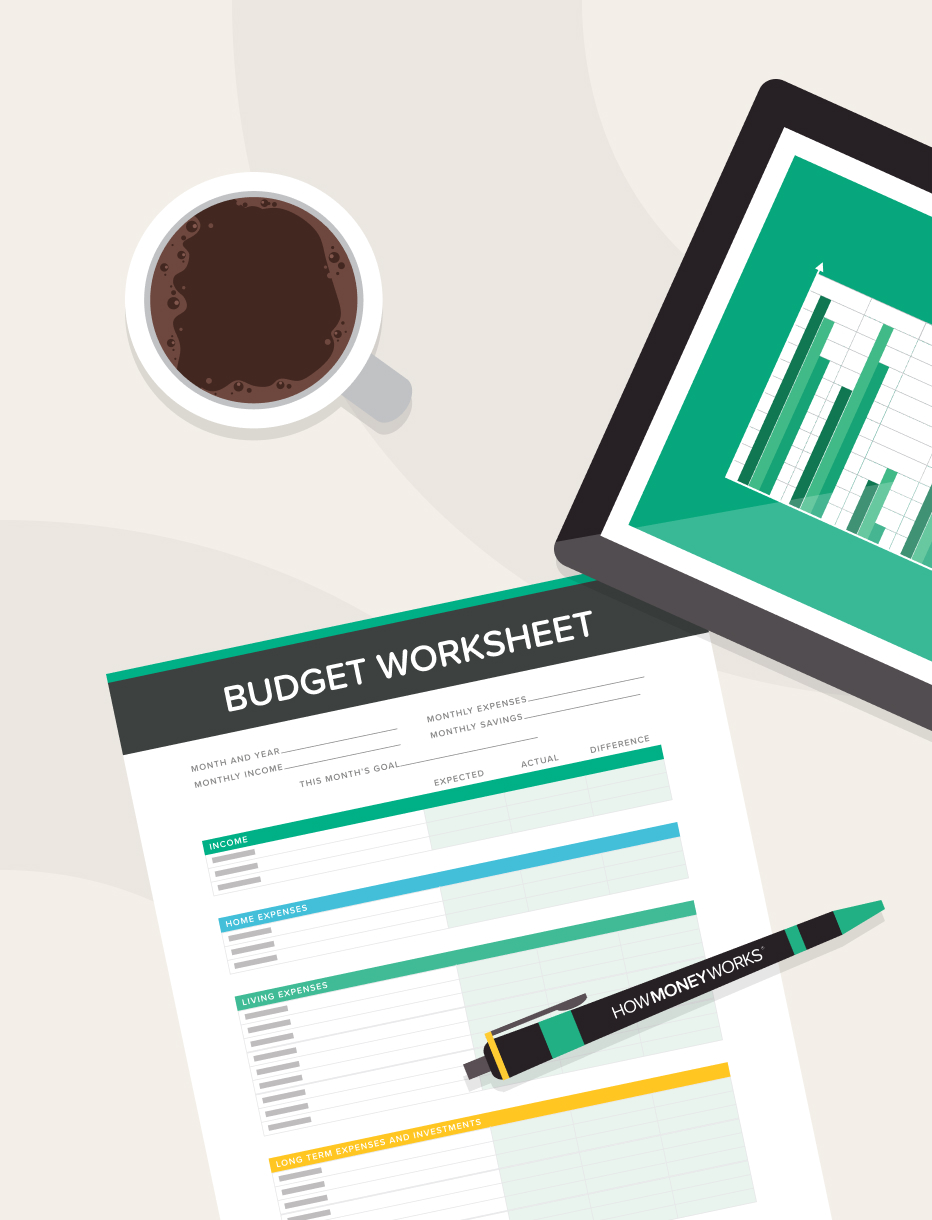
Budgeting is good, budgeting is great. But if you’re building wealth, it will only get you part of the way.
Budgeting is usually the first move for anyone getting their finances in order. It’s basically just tracking your expenses against your income, and then slashing spending.
Consider that 64% of Americans live paycheck-to-paycheck.¹ Low income isn’t to blame—48% of families earning over $100,000 also live paycheck-to-paycheck!² So for many, budgeting is an absolute necessity.
But will budgeting alone put you on the fast-track to wealth? Probably not.
Let’s say you earn $45,000 per year (after taxes), but you spend $45,000 every year. Congratulations! You’re living paycheck-to-paycheck. When you decide to get serious about building wealth, you’ll face a stark reality—you have no money left over to save!
So you start budgeting. You move from your apartment in midtown to a hovel in the suburbs. You stop going out. You cook at home. You walk to work. You swap lightbulbs for candles. You scrap Netflix, Spotify, and cable—and you start whittling random sticks you find in the yard to pass the time.
By the end of the year, you’ve spent only $30,000. Good for you! You have $15,000 to devote towards building wealth.
But what if you’re still short of your savings goals? You’ve cut spending to the core. Unless you’re willing to scavenge for food and live in a tent, cutting your spending further is going to be tough.
You only have one option—boost your income.
What does that look like? It could look like scoring a promotion. Or getting a new job. It could also look like starting a side hustle or becoming a part-time entrepreneur. You actually may be surprised at how many of your talents and hobbies have income-boosting potential!
That’s why for the 7 Money Milestones in the book How Money Works: Stop Being a Sucker, budgeting and boosting income are rolled together into a single Milestone—Milestone 5: Increase Cash Flow. Budgeting will get you started, but to truly supercharge your savings, you’ll need to increase your income stream, or create a multiple income streams.
Think about it like this—Jeff Bezos drove a Honda Accord for decades, but that’s not what made him a billionaire. Rather, he began with frugality and then built an income-generating empire.
So if you’re just beginning to build wealth, start with budgeting. Clean up your spending as much as possible before boosting your paycheck.
If you’re already frugal, good for you! You’ve made a great stride towards building wealth. Now, it’s time to consider boosting your income further.
No One Has Money

No one has money. You may think other people have money, but they don’t.
For each generation, it’s the same.
They don’t get taught how money works from K-12.
High school graduates head off to college. They don’t learn how money works there, either.
College graduates enter the workforce and start earning a paycheck… and spending their paycheck.
Soon, they enter a cycle of foolish spending. Earn a paycheck. Spend a paycheck. Earn a paycheck. Spend a paycheck.
They join the hundreds of millions living paycheck-to-paycheck. Always spending. Barely saving, if at all.
When retirement finally arrives or accidents or illness occur later in life, a terrible realization dawns on them…
They have no money.
According to a recent survey…¹
◼ Gen Z adults have saved an average of $37,000 for retirement
◼ Millennials have saved an average of $63,300 for retirement
◼ Gen-Xers have saved an average of $98,900 for retirement
◼ Baby Boomers have saved an average of $138,900 for retirement
Only Gen Z and Millennials are even close to being on track for retirement. Gen-Xers and Baby Boomers fall short of bare minimum savings by over half.
It’s not for lack of income—many Americans make enough to put their money to work.
Rather, it’s because they lack knowledge. They just don’t understand how money works beyond earning and spending.
The takeaway? If you’re a Gen-Xer or Baby Boomer, the time to start building wealth is now.
But for your income and skills to translate into wealth, you need tools. You need concepts like…
◼ The Power of Compound Interest
◼ The Time Value of Money
◼ Wealth Equivalency
These concepts will help you answer questions like…
◼ What interest rate do I need to close the gap between my savings and my retirement goals?
◼ How much do I need to save each month to retire with $1 million?
◼ Should you save a nest egg or start a business?
If those are answers you need to get, ask me how you can learn. I’d be happy to introduce you to resources that can set you on the right path towards discovering how money works and building wealth.
Protecting Your Emergency Fund From Inflation
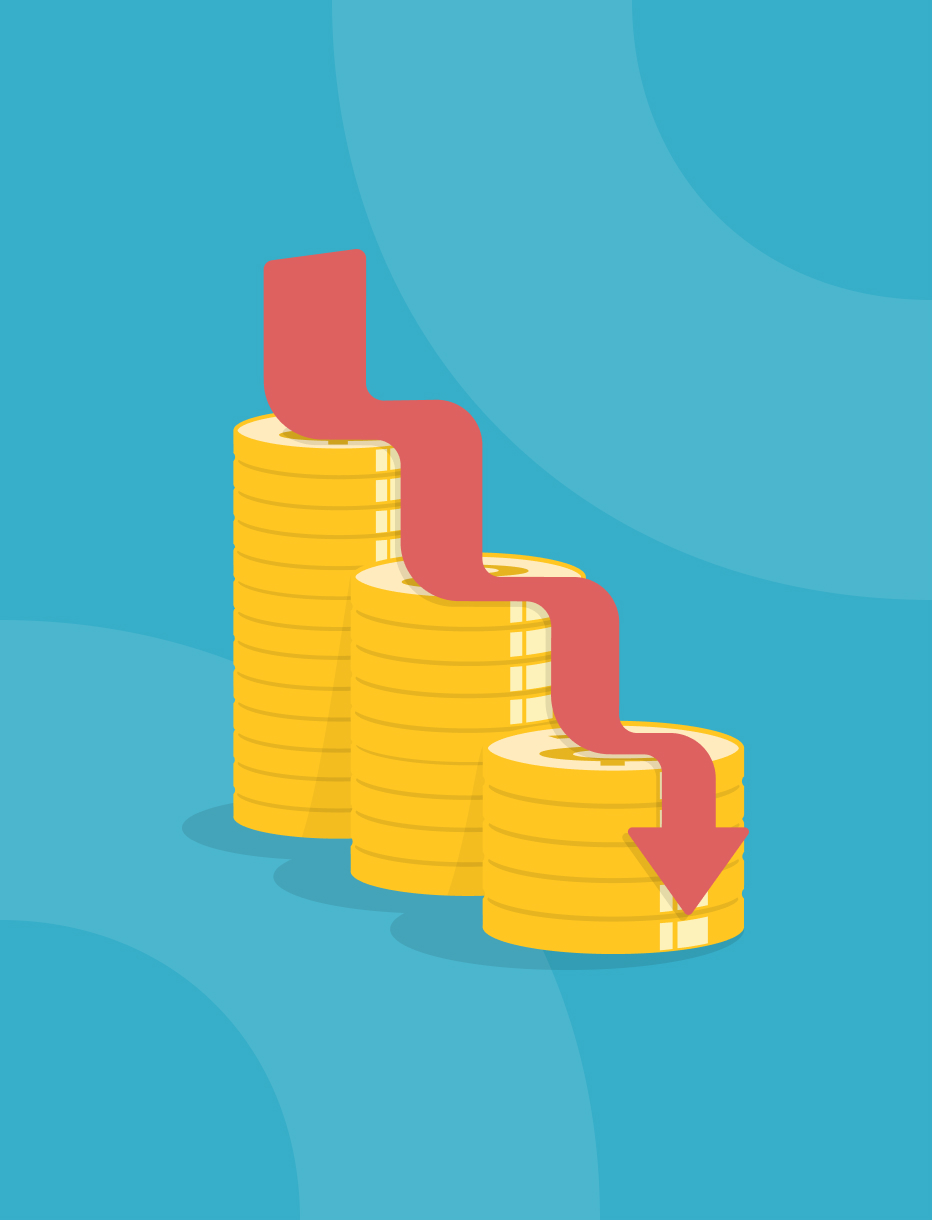
Your emergency fund may be rapidly losing value.
Despite your best efforts and planning, you and your family’s first line of financial defense might be eroding day by day. And it’s all because of inflation.
Here’s what’s happening…
Inflation is the steady increase of prices over time. A jug of milk that costs $2.85 one year could cost $3.00 the next. On average, prices have inflated at 3.25% annually since 1914.¹
But in 2021, inflation exploded. The market faced a perfect storm of low interest, pandemic-fueled supply chain problems, and consumers returning to stores. Demand soared while supply shrank.
The result? Consumer prices increased 7% in 2021, the highest rate since 1982.²
That means everything is increasing in price… including the services you need in emergencies.
But here’s the problem—it’s a challenge for your emergency fund to outgrow inflation.
Why? Because above all else, your emergency fund must be both accessible and stable. What good is an emergency fund if you can’t use it in a pinch or if it gets leveled by market fluctuations?
And good luck finding an account that’s accessible, stable, AND pays interest that’s greater than inflation. In today’s climate, it can be difficult to find a “high interest” savings account that pays more than .5%. Read that again. Not 5%. Point 5 percent.
The question then, isn’t if your emergency fund can outgrow inflation. It’s about minimizing the damage.
Here are two ideas that may make the difference between financial success and disaster in the face of emergencies…
Increase your income. It’s simple—the more you earn, the better positioned you are to navigate emergencies. Look for ways to increase your income through side hustles, a new opportunity, or even negotiating higher wages with your current employer.
Just remember—not all sources of income are created equal. The income from your job, for instance, has two critical weaknesses…
- It may dry up if an emergency stops you from working
- Wages haven’t kept pace with inflation for decades
In short, the best sources of income for emergencies work even when you can’t, and empower you to control your own wage.
Some options are…
Turning a hobby or passion into a side-hustle Starting a business that eventually becomes self-sustaining Creating and selling duplicatable items like books, courses, music, etc.
Split your emergency fund. If you have a substantial emergency fund you could split it between two accounts. One half would grow slowly but remain easily accessible and stable. The other half would grow faster but be less accessible and more volatile.
Be warned—this strategy will only work if you have substantial emergency savings. Before you opt for this approach, consult with your financial professional.
Shielding your emergency fund from inflation is possible, but it takes the right strategy. It’s always wise to consult with a licensed and qualified financial professional before committing to a strategy.
Will Your Savings Become Wealth?

Not sure if you’re on track to become wealthy? The Rule of 72 can help!
The Rule of 72 is a simple mental math shortcut that estimates how long it could take your money to double. This is what it looks like…
72 ÷ interest rate = years to double
It’s simple, it’s easy, and it might change your life.
Here’s how…
Let’s say you’re done living paycheck-to-paycheck and you’re ready to build wealth. You’ve downloaded a budgeting app, and you’ve set aside $150 each month to save. Look at you! That’s a massive step towards building wealth.
But now you face a dilemma—where should you stash that money each month?
Your checking account? A savings account? Retirement accounts? NFTs? Each person you ask has a different opinion, fully backed with anecdotal evidence.
But have no fear! Enter the Rule of 72. It’s your gleaming sword that can slash through false perceptions and help you conquer your savings goals.
Let’s say for the time being, you’ve kept some money in a “high-interest” savings account earning .5%. How quickly will that account double your money?
Simple—plug that interest rate into the Rule of 72, and you get…
72 ÷ .5 = 144 years to double…
That’s right—your money will take 144 years to double with your current savings strategy. Yikes! That’s enough time to move from steam power to SpaceX.
But that’s not all—that interest rate leaves you helpless to inflation, which as of the writing of this article is about 3.25%.1 Luckily, you can use the Rule of 72 to discover when inflation will double the cost of living. Just replace the interest rate with the rate of inflation, and you get…
72 ÷ 3.25 = 22 years
Think of it like this—in 144 years, your money would double once. But the cost of living would double 6 times. Without the Rule of 72 to reveal this truth, your savings strategy might erode your wealth instead of increasing it!
But suppose you found an account with a 6% interest rate. Plug that into the Rule of 72, and you get a very different result…
72 ÷ 6 = 12 years
Over a 45 year career, your money would double roughly 3 times. The cost of living would only double twice. So your wealth would be above the rising tide of inflation.
The Rule of 72 isn’t a guarantee of success. After all, past performance can never guarantee future results. But the Rule of 72 can estimate if your savings are on track to become wealth, or if you’re heading towards financial disaster. Use it often, and discuss your findings with a financial professional.
Be Like Buffett

Warren Buffett didn’t become a billionaire overnight. Instead, he leveraged simple concepts over decades to build a vast fortune.
These are the same concepts you can use too.
To demonstrate this, let’s review the history of Buffett’s wealth…
Buffett started growing his money at age 11. He bought three stocks at about $38 a piece.¹
By the age of 30 he had become a millionaire.²
He didn’t become a billionaire until age 56.³
But the vast majority of his wealth wasn’t created until he was past the normal retirement age.
Over the next 36 years, his wealth surged to over $100 billion.⁴ If you include the $37 billion he’s donated,⁵ his net worth increased over 10,000%.
That’s a staggering figure.
And it’s all because he leveraged two simple concepts—the Power of Compound Interest and the Time Value of Money.
The Power of Compound Interest explains the exponential growth of Buffett’s net worth. Buffett used money to earn money. The more money he made, the more he could also earn.
By the time he was 57, he had $1 billion at his disposal to build further wealth. In short, he unlocked a virtuous cycle of growth leading to greater growth.
But it’s the Time Value of Money that explains Buffett’s massive success.
Compounding requires time to get the maximum benefits. The longer money compounds, the greater its ability to build wealth.
And Buffett started compounding early. Very early. Age 10, to be precise.
What if he had started later? Let’s suppose he started at age 30 with $25,000, earned 22% annually (Buffett’s career average), and retired at age 60 to play golf.
His net worth in this scenario? $11.9 million. 99.9% less than his current value.⁶
The takeaway? Be like Buffett.
That doesn’t mean going down the finance nerd rabbit hole. It definitely doesn’t mean adopting the Oracle of Omaha’s diet of fast food and soda!
Instead, leverage the Power of Compound Interest ASAP. Then, be patient and let the Time Value of Money work its magic over years and decades. And rest easy—you’re following in the footsteps of the greats.
The Scandal of the American Financial Education System

The scandal of the American financial education system is that there is no American financial education system.
It doesn’t exist. And millions are suffering for it.
As it stands, only 21 states require financial education courses to graduate high school.¹ But that number is a mirage—60% of students in those states haven’t actually taken the classes!²
Simply put, almost no one in America is learning how money works. And it’s wreaking havoc on the lives of millions.
Would these statistics even exist if schools empowered students with financial literacy? You be the judge…
• $167 billion wiped out by foolish investments in meme stocks in early 2021³
• Over $1 trillion lost to volatile cryptocurrencies in a single week⁴
• Over $1 trillion in student loan debt shackling Americans⁵
• 1/3 of millennials believe they’ll never have enough saved to retire⁶
These numbers tell a story.
Students go through high school without hearing a peep about how to manage money or build wealth.
They sign off on student loans without being taught how debt can devastate their future.
Graduation comes around, and they start living paycheck to paycheck. How could they not? It’s all they know.
And then, no surprise, they’re suckered into get-rich quick scams that promise wealth but only deliver crushing losses.
Do these scenarios hit a bit too close to home? If they do, then know this—you cannot rely on the powers that be to show you how to change your story.
If you were let down by your school system—and even if you weren’t—ask me for a copy of How Money Works: Stop Being a Sucker. It may be the knowledge you need to turn your financial situation around and change your future.
Closing The Gap

Women earn 83¢ for every $1 earned by men.¹
The median annual salary for men is around $61,100. At 83¢ for every $1 earned by a man, the median annual salary for women is around $50,700.² For someone taking care of a family, how significant do you think that extra $10,000 would be?
By the time a woman reaches age 65, she will have earned $900,000 less than a man who stayed continuously in the work force.³ Consequently, retired women receive only 80% of what retired men receive in Social Security benefits.⁴
Women tend to be the primary caregivers for their children, parents and partners.¹ So women end up taking time away from their careers to care for loved ones.
These career interruptions can significantly impact women’s chances to climb the corporate ladder – promotions, raises, bonuses and full retirement benefits.³
Since women earn less, we have less money to set aside for our financial goals. Of the Americans who live paycheck to paycheck, is it a surprise that 85% are women?⁵ As a result, women own just 55¢ for every $1 owned by men. We accumulate only half of the wealth accumulated by men.⁶
We may not see the gender pay gap or the gender wealth gap close in our generation. But women can change the financial trajectory of their lives by learning how money works and applying the 7 Money Milestones. By understanding and paying attention to all of the things that make up our financial picture – Financial Education, Proper Protection, Emergency Fund, Debt Management, Cash Flow, Build Wealth, and Protect Wealth, we have the power to take control over our financial future and create equal wealth for ourselves.
And, women need to think about their career decisions. We should consider choosing a career that pays more to women and men equally. With a company that doesn’t penalize women for time spent taking care of loved ones. A place where women can create equal pay for ourselves.
Women have made a lot of progress in pursuing higher education and professional careers, but we’ve only made incremental progress in our finances. If we want to bring about profound change, we have to make it happen for ourselves. We have the power to close the gap in our lives for ourselves and our families.
— Kim Scouller
3 Painful Consequences of Minimum Payments

Do you send in more than the minimum payments on your credit cards each month? (The correct answer is ‘yes.’)
If you are making more than the minimum payments now—you’re thinking like the wealthy!
A minimum payment is the lowest amount you can pay on your credit card bill without suffering a late payment penalty. We all know making minimum payments may be necessary for a short period if you’re freeing up cash flow to pay down a bigger, more urgent bill. However, paying just the minimum for the long haul can lead to long-term negative consequences.
Just like any time you have to deal with challenges in life, considering long-term consequences is vital to success. It can wake you up from thinking and acting like a sucker with your money. It can give you the laser focus needed to pay off debts so you can start building wealth. What’s at stake? You know, just your future.
So what are those looming, long-term consequences of making only the minimum payments on your credit cards?
Consequence #1: You end up paying mostly interest forever.
OK, maybe not forever, but it will feel like it. By making only the minimum payments over a long period of time, you’re basically giving the credit card company free money—your money. You’re not even paying down the principal for the item you originally purchased with your credit card. You’re basically paying a subscription to the credit card company for holding your debt—a monthly service for which you get nothing.
Here’s an all-too-common example:
Let’s say that an unexpected expense tightens your budget. As it stands, you owe $10,000 in credit card debt at a 20% interest rate with a minimum payment of 2%. In order to cover the basics like housing, food, and medicine, you drop your credit card payments to the minimum amount of $200 monthly.
In this scenario, it will likely take more than 30 years and interest payments of over $35,000 to fully eliminate your credit card debt. The credit card company becomes richer, and your financial future is squandered.
Consequence #2: You can hurt your credit score.
When you hold high debt on a credit card for a long period, even if you’re making minimum payments on time, your credit utilization ratio (or the percentage of available credit you’re using) can rise. If it remains above 30% of your credit card limit for long, your credit can take a substantial hit¹—hurting your ability to borrow for a car, education, or home mortgage—and hinder qualifying for lower interest rates on those loans. This all equals financial limitations for your future—less cash flow, higher interest payments, less money to save for the future.
Consequence #3: You never start saving.
Today, the responsibility to save and build wealth falls on the consumer—that’s you! Your 401(k) and Social Security check may fall dramatically short of providing the income you need for the lifestyle you want during retirement. The earlier you start saving, the better chance you have of closing the gap on the money you need for the future. Paying minimum payments on your credit cards is a dangerous habit that can prevent you from saving enough.
You don’t have to fall victim to these consequences. You can create a strategy to knock out your credit card debt by paying more than the minimums. How much more? As much as possible—until your credit card debt is gone. That big sigh of relief and your new ability to save will be well worth it!
An important caveat: Paying the minimum on a credit card while you build an emergency fund or pay down another debt can be advantageous, as long as you’re working with a licensed and qualified financial professional to reduce debt methodically.
Learn more about reducing debt in the book, HowMoneyWorks: Stop Being a Sucker. Email, text, or call me to discover how you can get a copy ASAP!
How Inflation Eats Up Your Savings

Inflation is financial erosion, a slow and steady force that eats away at the value of money—YOUR money.
Here’s how it works. The trend is that over time, the prices of goods and services tend to rise. As a result, the purchasing power of your paycheck, your savings, and your retirement income is reduced.
The sucker ignores inflation—an abstract concept they may feel they have no control over. But the wealthy understand inflation and prepare for it—calculating the impact into their budget, their future purchases, and their retirement goals.
Here’s an example that drives it “home”…
Let’s say that in 1980 you received a $100,000 inheritance check. You were diligent enough to put the money into an account earning 2% annual interest. Your hope was that one day it would grow and be enough for you to afford a $200,000 dream home—a brick estate with a one acre yard, five bedrooms, three garages, and a pool in the back.
After waiting patiently for 40 years, retirement has arrived. The growth of your inheritance money had exceeded your goal—you now have over $220,000. Time to buy your dream home!
But while you waited, inflation was growing too. It increased at the average annual rate of 3.1%—more than tripling the average costs of goods… and houses.¹
Your $200,000 dream home with three garages and a pool in the back is now for sale at over $600,000.
The takeaway is that you can never ignore the impact of inflation on your goals for the future. You need to know how it could impact the value of your 401(k), the equity in your home, and the death benefit of your life insurance policy.
If you haven’t factored in the impact of inflation on your dreams for the future, there’s no time like the present. Consider scheduling a conversation with your licensed and qualified financial professional today to discuss strategies to beat inflation!
Are You Keeping Your Checking Account In Check?
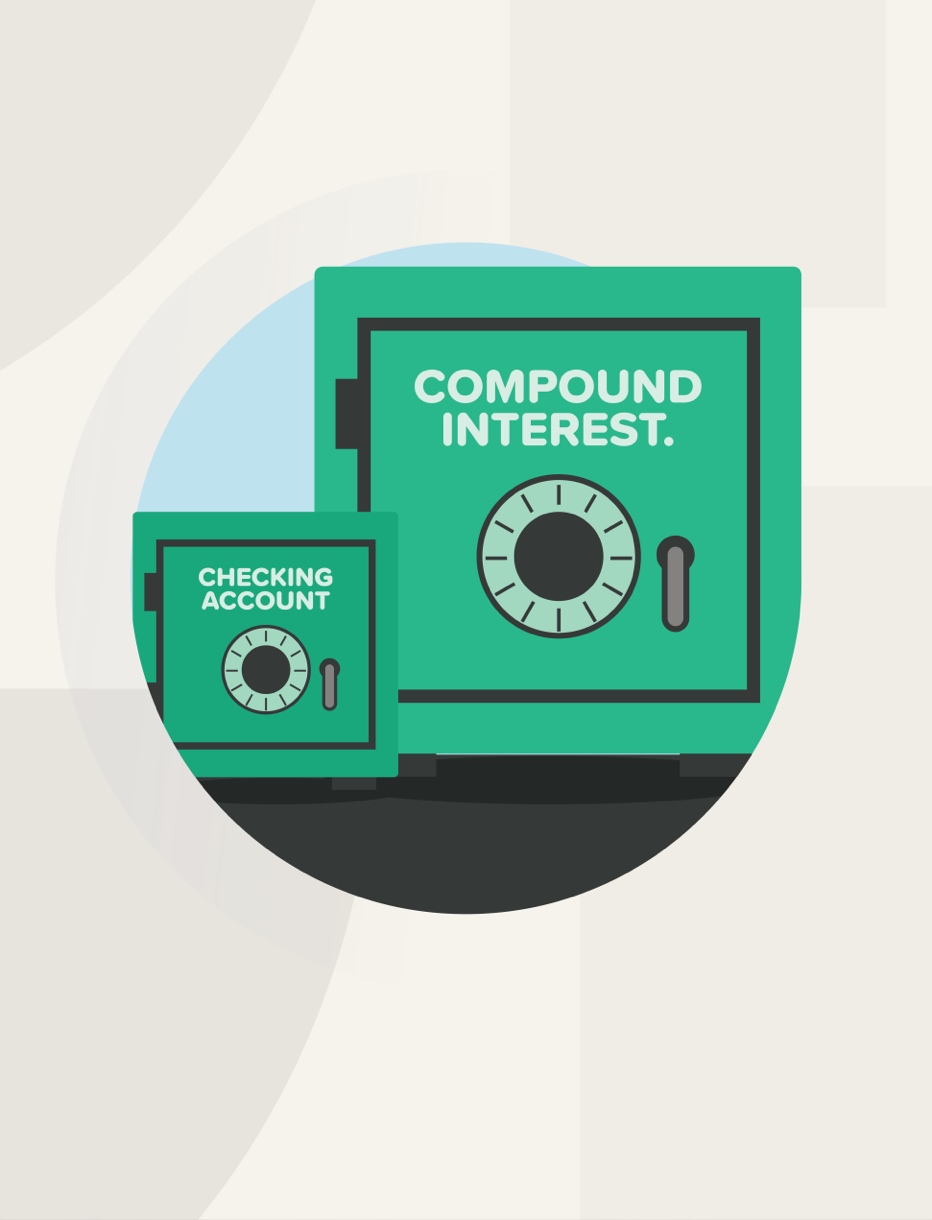
There are many culprits that can hamper your ability to build wealth.
Believe it or not, your checking account might be one of them.
A checking account is designed to give you quick, flexible access to your money—not grow it efficiently. That’s why the interest rate for an average checking account is negligible—around .03%.¹ It might as well be zero if you’re considering it as a savings tool for the future.
But you may already be thinking, “no one would consider their checking account a savings vehicle.” Then why do Americans have so much of their money stashed in them—an average of $10,545 per checking account, to be precise.²
The answer can only be that they don’t know how money works. Otherwise, they would have moved their cash to an account that leverages the power of compound interest with a higher interest rate long ago.
The sucker likes seeing a big balance in their checking account. The wealthy like seeing big deposits moved into their wealth building vehicles.
Do you have too much money sitting in your checking account?
As a rule of thumb, only keep enough cash in your checking account to cover everyday expenses like utility bills and groceries. Move what’s leftover into accounts and vehicles where it can accrue interest at a faster rate. And consider scheduling a conversation with a licensed and qualified financial professional to discuss which saving vehicles are best for you!
You Are Richer Than You Think

The sucker believes that becoming a millionaire is next to impossible without a 6-figure annual income.
The wealthy know that nothing could be further from the truth.
It’s time to start thinking like the wealthy by recognizing that YOU are richer than you think.
Discovering your hidden wealth begins by following these three simple steps:
Reduce Your Debt
Increase Your Cash Flow
Save More Money
Zoom in to unpack each of these steps…
Reduce Your Debt.
Regardless of your salary or income, the first step to becoming a millionaire is to take control of your debt, rather than cursing the bills when they arrive in the mail each month and mindlessly paying the minimums. Taking control requires rethinking, organizing, evaluating, and reducing debt efficiently.
Rethinking means removing the emotion attached to your debt, whatever it may be—anger, embarrassment, shame, frustration, hopelessness. It’s like washing the dishes. A stack of plates and a period of time. It’s just another task to complete.
Write down all of your debts, total balances, monthly minimum payments, and interest rates for each. There they are. You can see them all. Now it’s time for war.
The next step is to evaluate which one to pay off first. Choose the debt with the highest balance or lowest balance—OR choose the one with the highest interest rate. With the first victim selected, start putting all the cash you can muster toward paying off this debt. Instead of buying lattes, burgers, lottery tickets, and that cool new graphic t-shirt—dump your cash into debt payments. You’ll have the rest of your life to fill your closet with new tees. Make sure you continue paying the minimum payments for all your other debts too—on time.
When you make the last payment for the first debt do a little happy dance (really important). Then select the next highest debt or lowest debt, whichever strategy you choose—and put as much monthly cash toward paying it off as you can. Include the money from the minimum monthly payment from the debt you just finished paying off. This gives you a compounding effect to your debt reduction strategy. The more debts you pay off, the bigger your debt paying power becomes and the faster you’ll start reducing those debts. The process will actually become fun as you feel the power that comes from knocking each debt out. Trust me.
Along with paying off your credit card balances, student loan debts, and car loans, you should also take a look at your mortgage if you’re a homeowner. If you can refinance your home for a 1% lower interest rate or even lower, it may make sense as a way to lower your monthly payments and lower your mortgage debt. Make sure you work with your financial professional to see if this is a fit for you.
Increase Your Cash Flow.
Now that your debt is moving down, you should have more cash freed up. But when it comes to cash flow, more is always the merrier. Here are some tactics for freeing up even more cash flow so you can make the jump from sucker taking a licking to millionaire in the making.
First, look at your monthly spending. Take the last two or three months and categorize everything that isn’t a necessity. How much did you spend on eating out, clothes, entertainment, impulse buys, home improvement, travel, and gifts? With the total in hand, cut the amount in half. You should also take a close look at your monthly subscription payments—how many streaming services do you really need? Cancel services that you’re not using.
So now you have your new non-essentials budget. Congratulations, you just increased your wealth-building power and simultaneously stopped living above your means!
Second, if you’re employed, request a meeting with your boss and ask for an increase in salary or wage or ask for more hours. All they can say is ‘no.’ If they agree, even if it’s just by a small amount, you just increased your cash flow once again. You’re on a roll.
Third, consider starting your own business. You may have thought about starting one in the past but it wasn’t the right time or you were too busy. Now is exactly the time to seriously examine the possibilities. What have you always wanted to do? What are your talents and abilities? What new business opportunities do these times present?
Fourth, you may not want to start a full-fledged business, but you could have a side gig or hustle to earn a little extra in the mornings, evenings, or weekends. Do you like making things, organizing, cleaning, serving, driving, crafting, zooming, or talking on the phone? What can you do with your time, enjoyments, and skills to make a little extra dough? There are endless opportunities out there for entrepreneurs. Find your fit and boost your monthly income—even if it’s only by a few hundred a month.
You have reduced your debt and increased your cash flow. Now you can use that extra monthly cash to start building wealth. The next step is to save like a millionaire.
Save Money.
Saving money on a consistent basis, regardless of the amount, is the true secret to financial victory. The strategy is simple. You take all the monthly cash flow you can spare and start saving it into an account with the best interest rate, growth potential, tax advantages, and principal protection you can find. This is where a financial professional is key. Don’t go it alone.
These habits have created more millionaires than any other story, company buyout, or stock market windfall in the history of the world. The 8th wonder of the world—the power of compound interest—is the magic dust that will always work in your favor if you’ll put it to work.
Saving money is more about the decision than anything else. Just like breaking the cycle of foolish spending, you must DECIDE to save money on a consistent basis. When you do, over the years and decades, you will win because you’re employing the Time Value of Money and the Power of Compound Interest. This is the one-two combo that millionaires use to reach their status.
With a little less debt and a little more cash flow, you can start saving a little bit over a long period of time to become richer than you think—perhaps even a millionaire!

.png)
